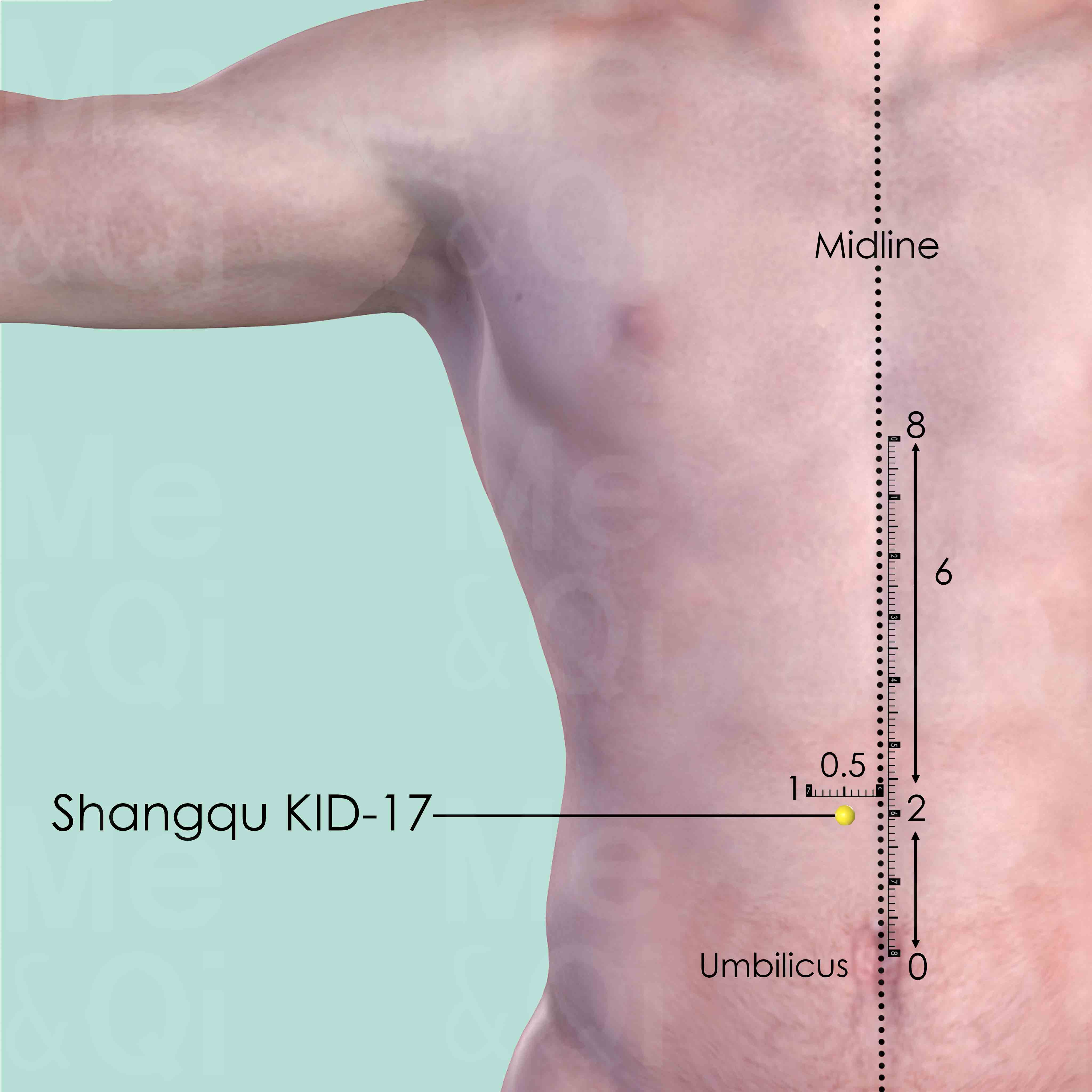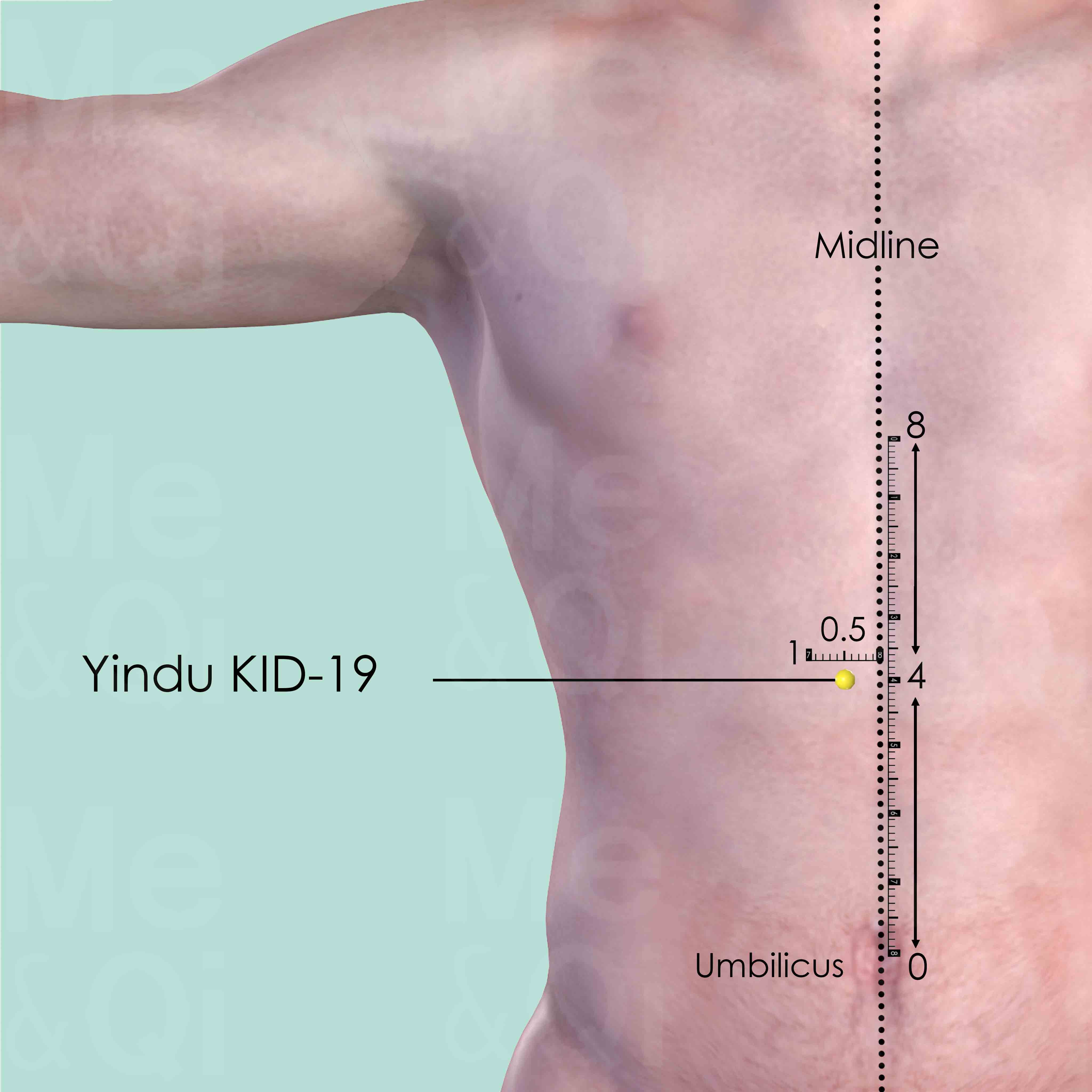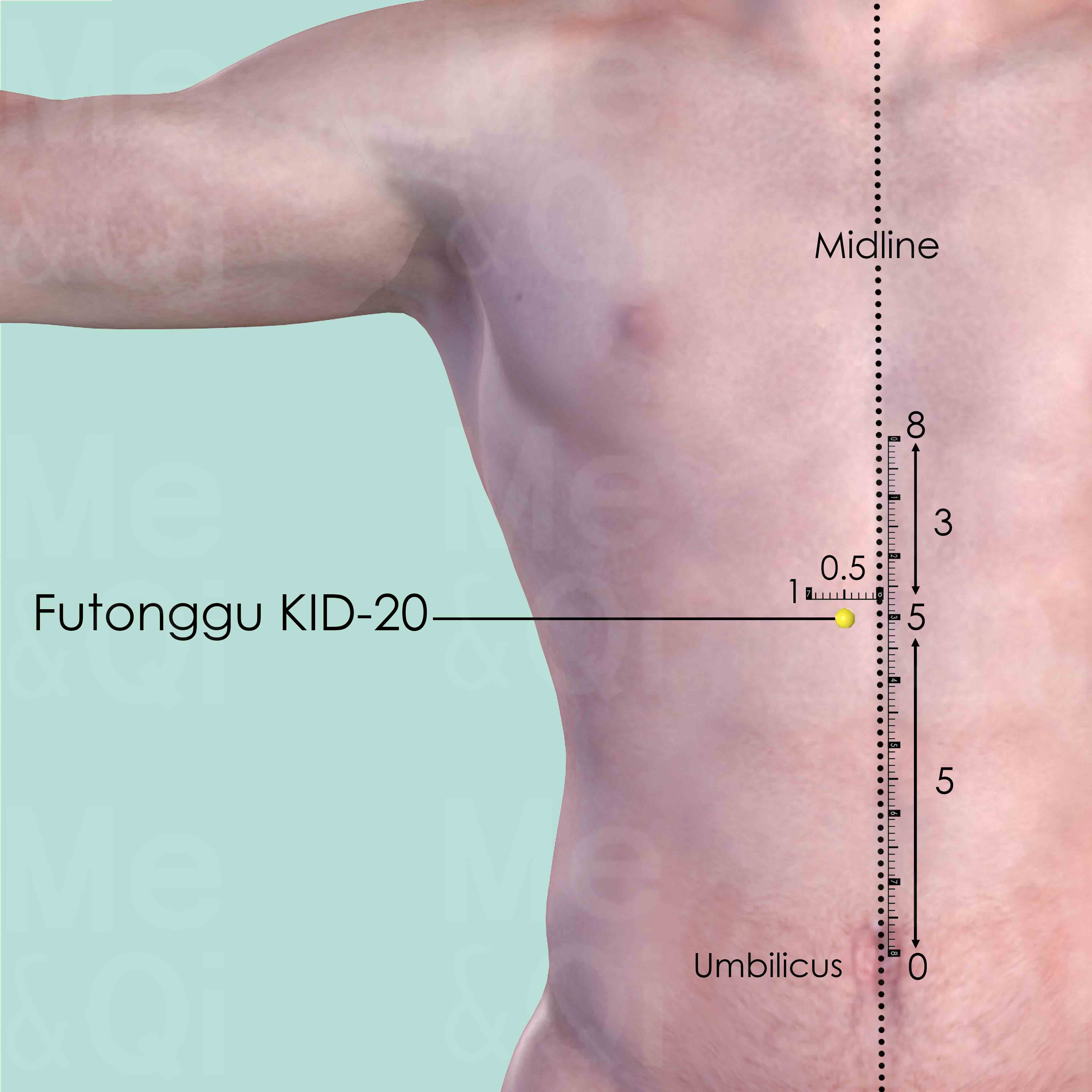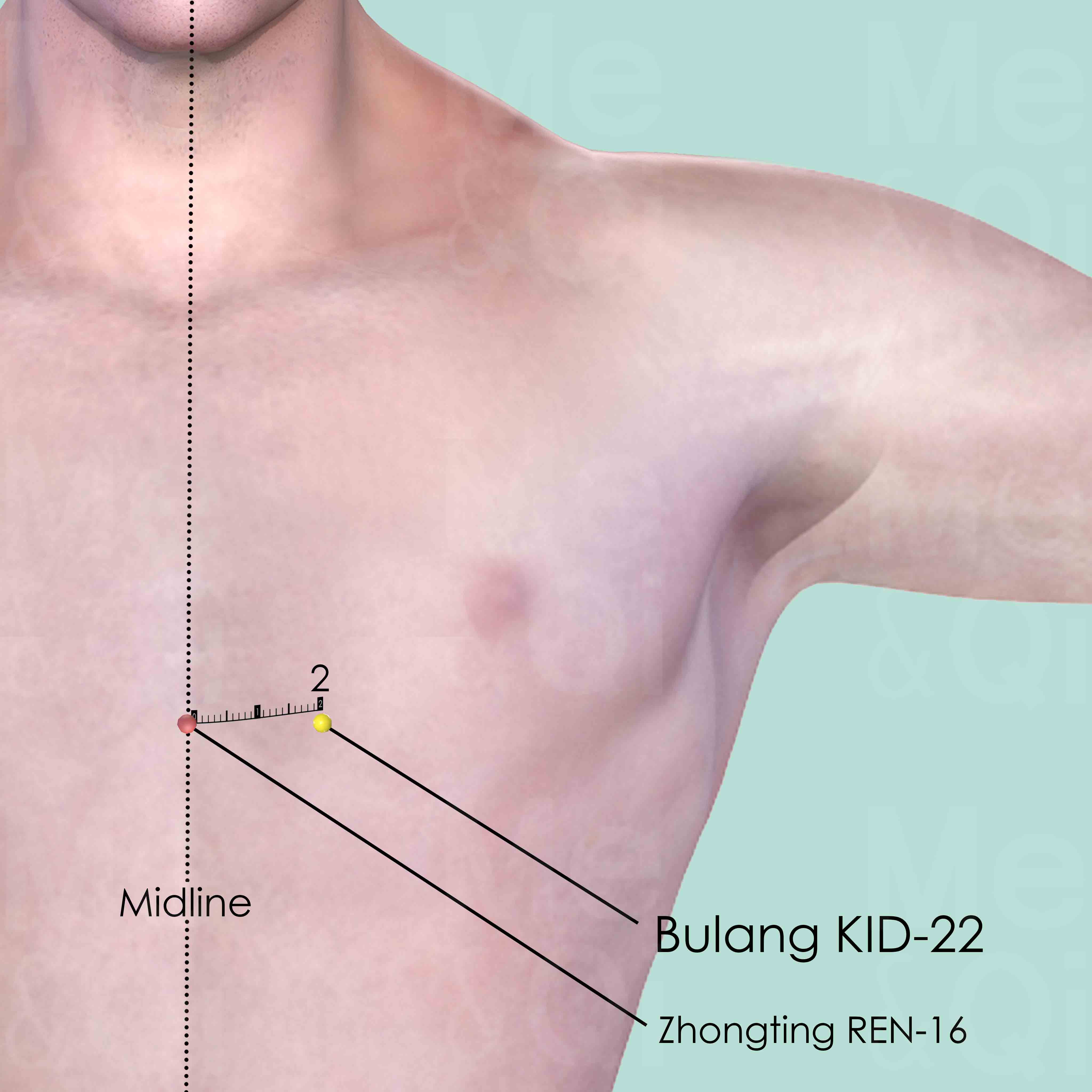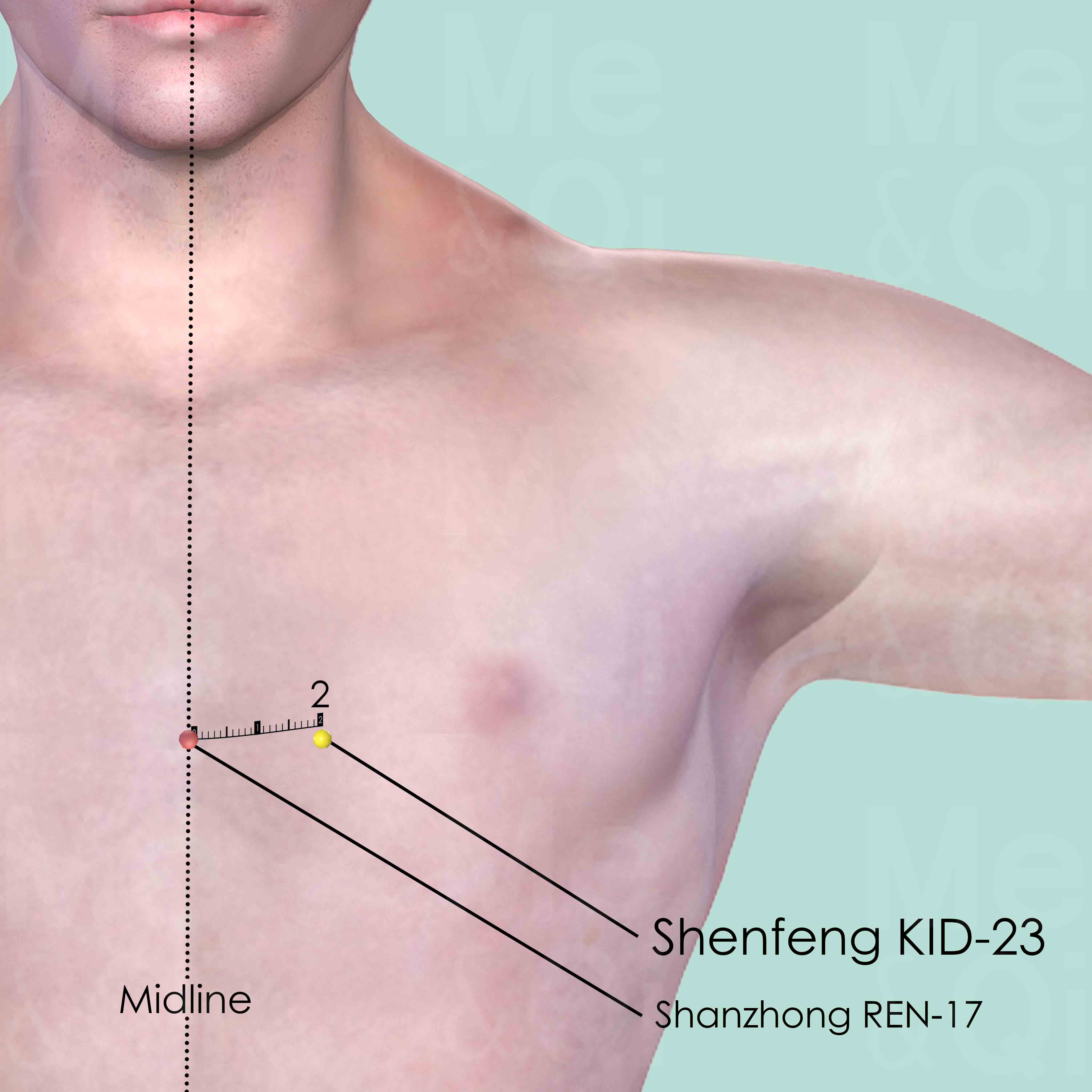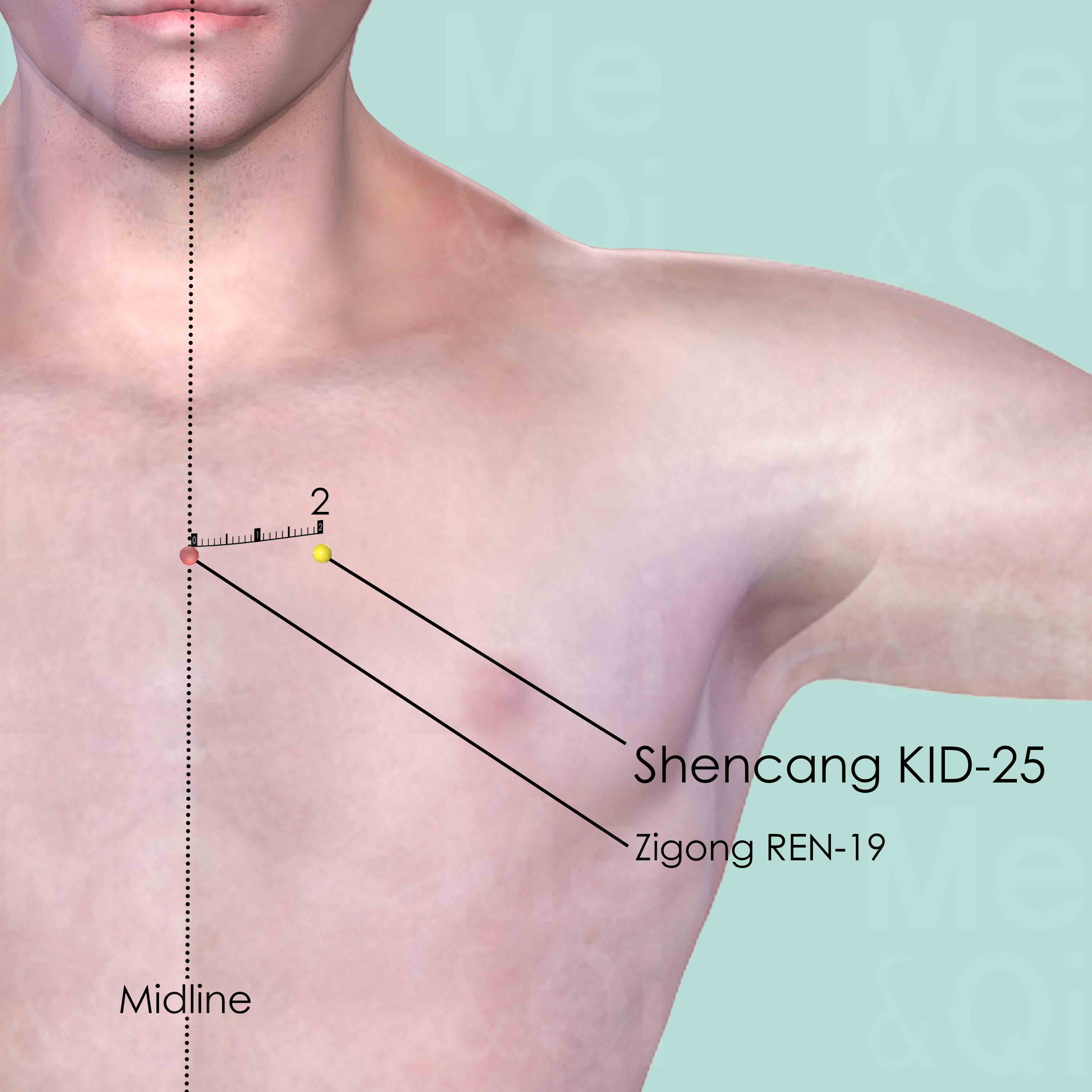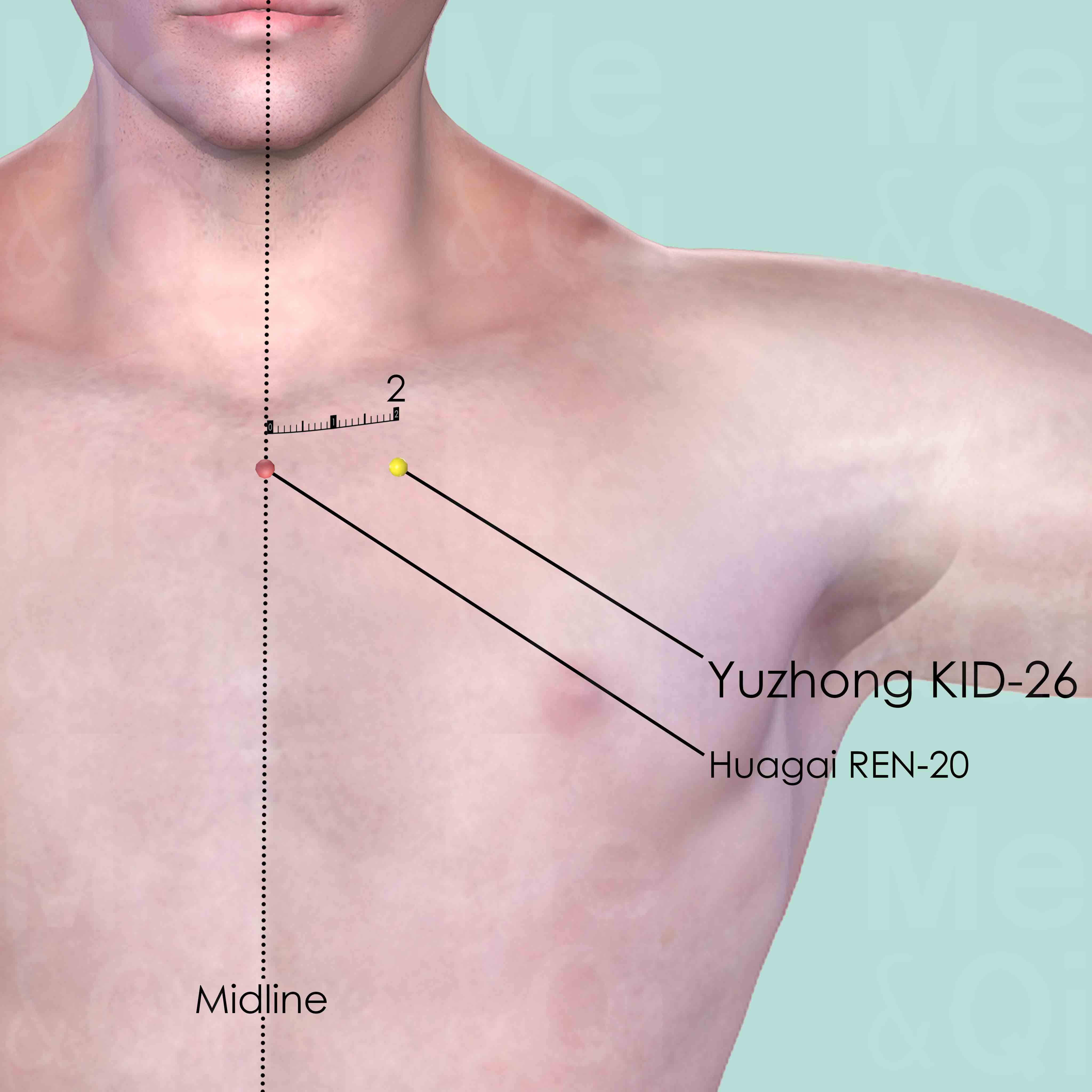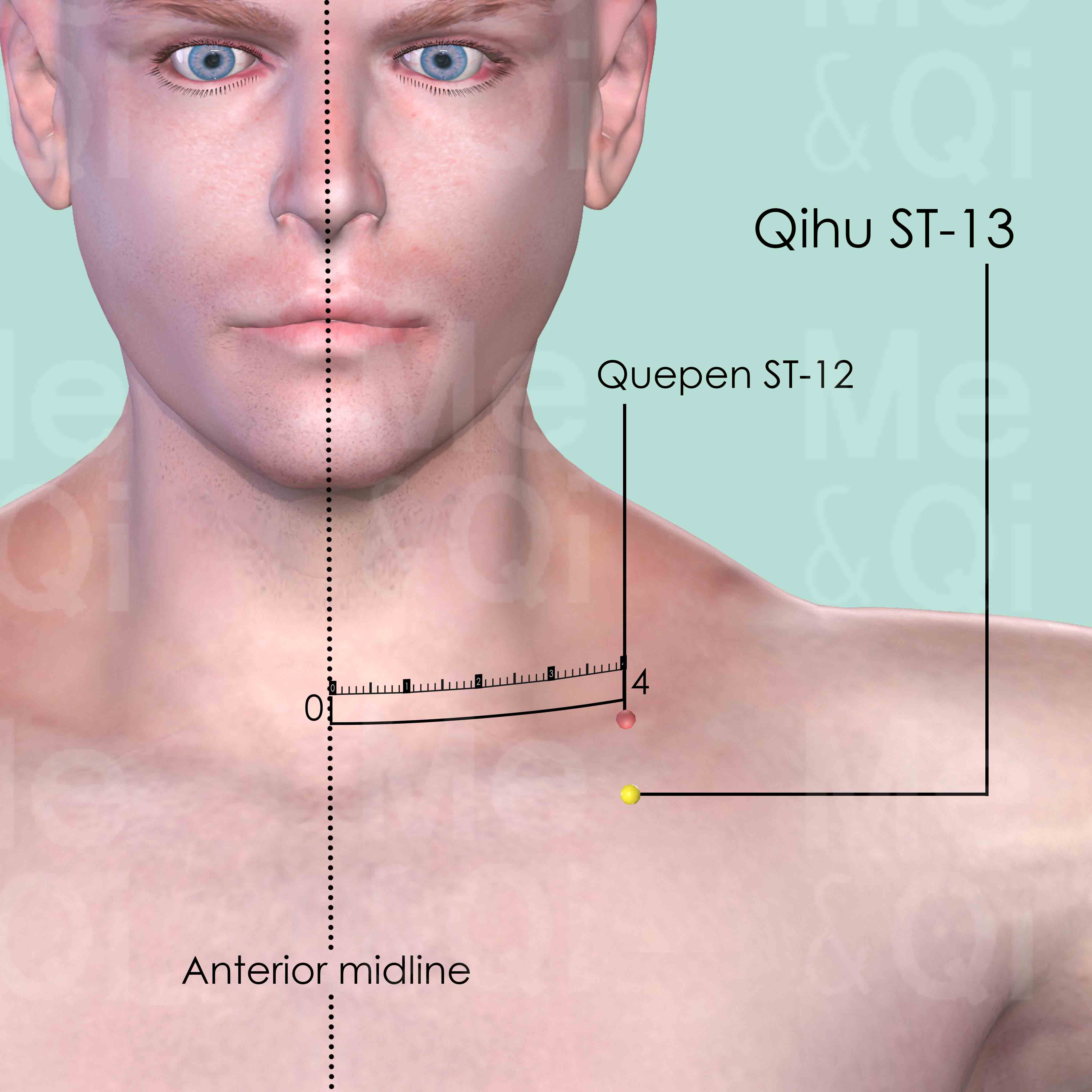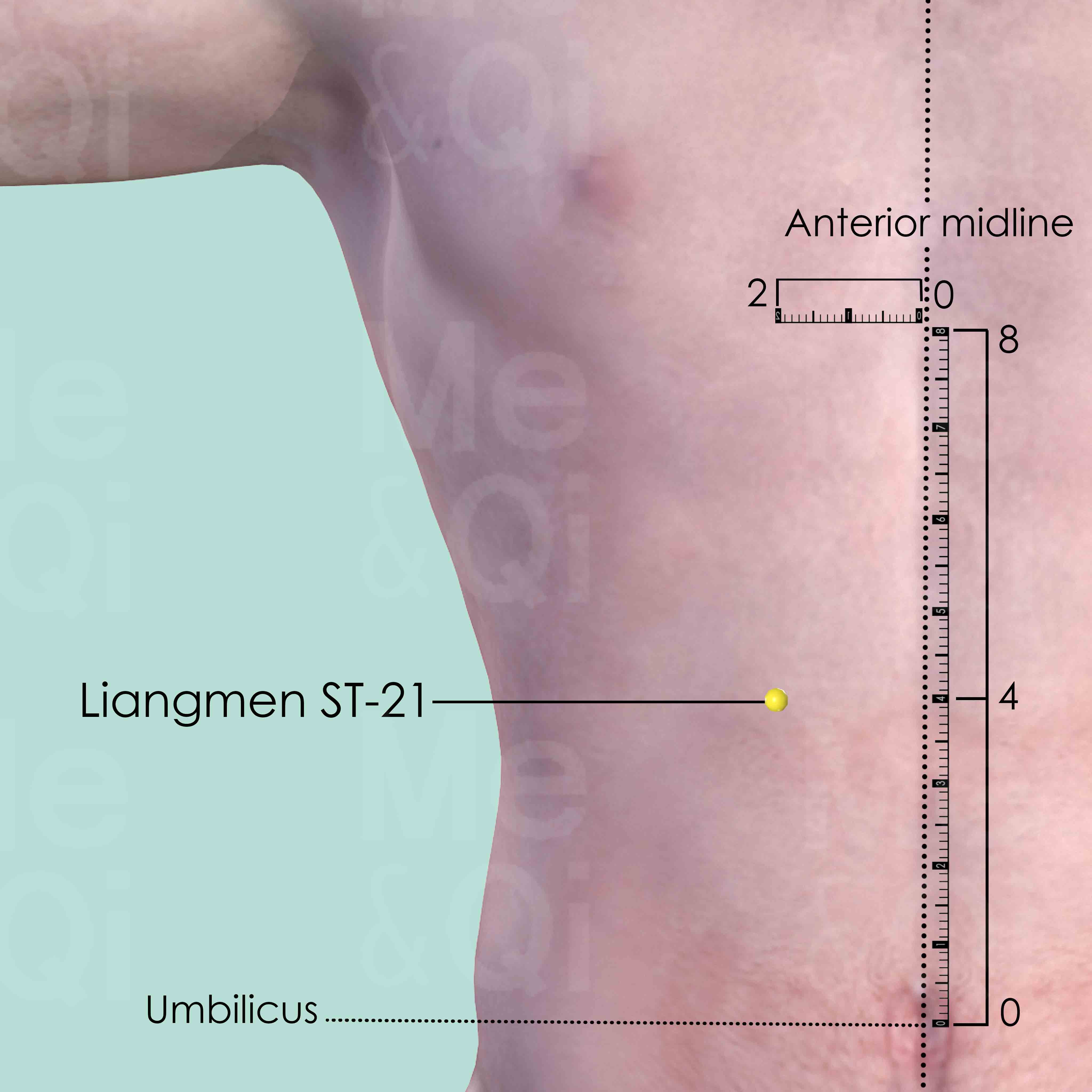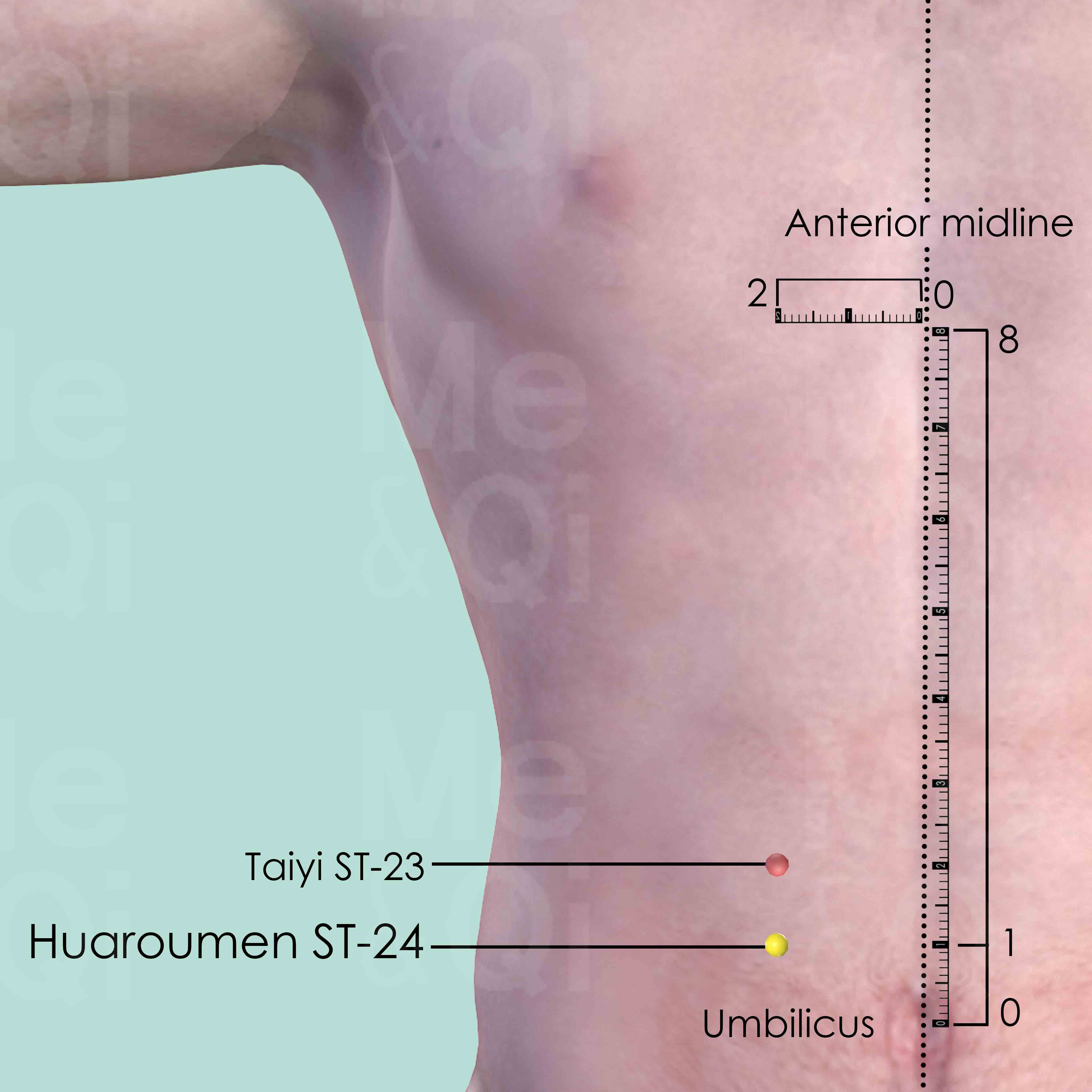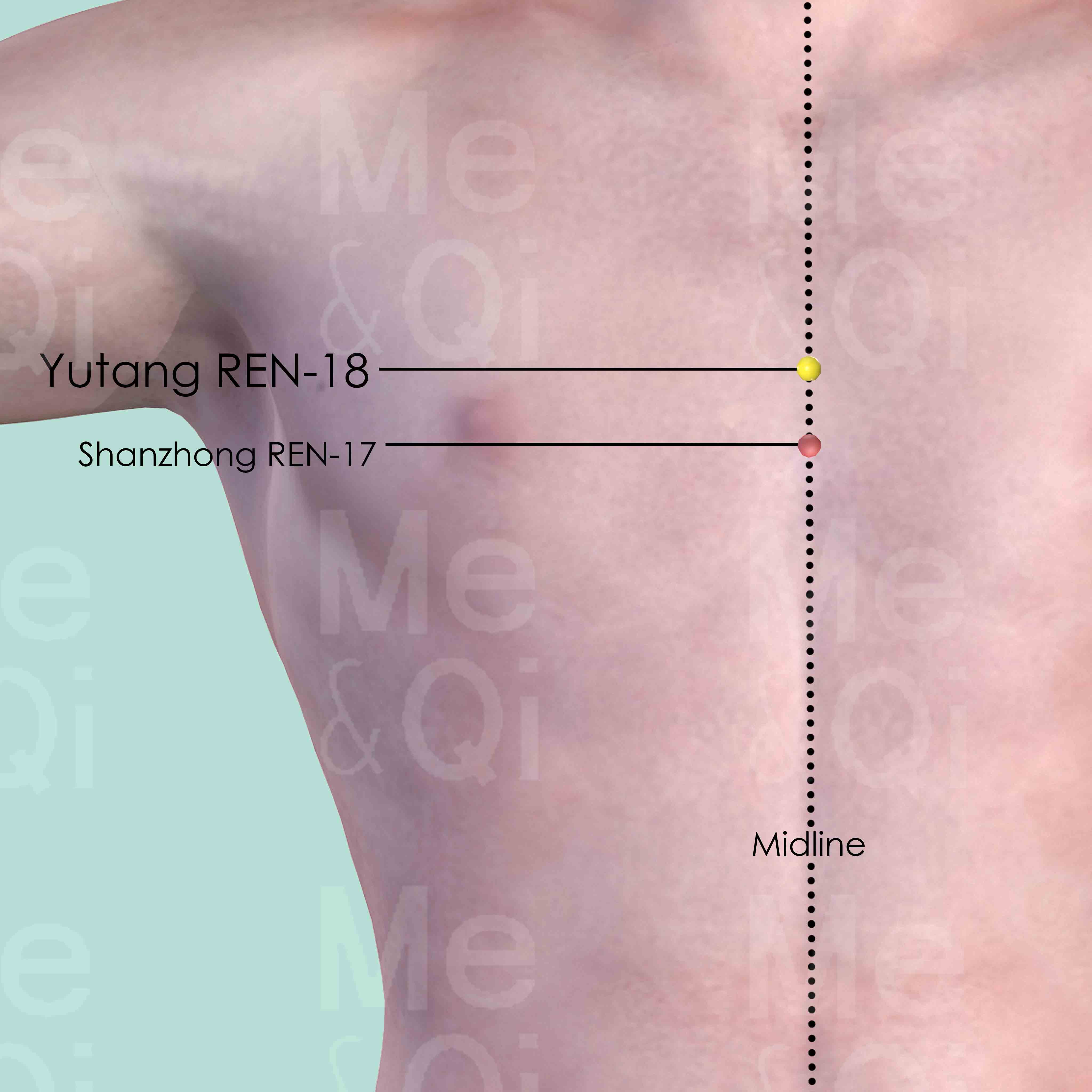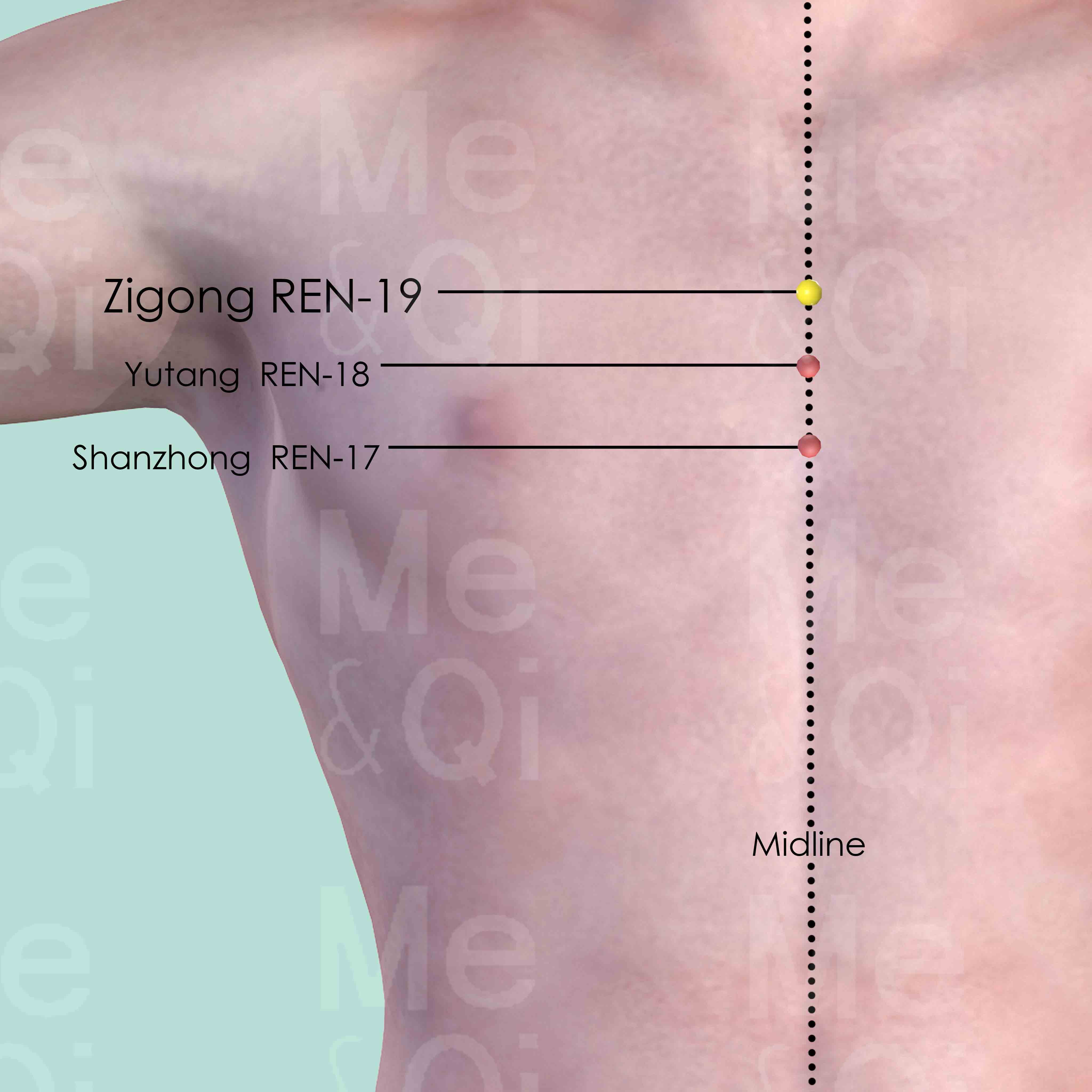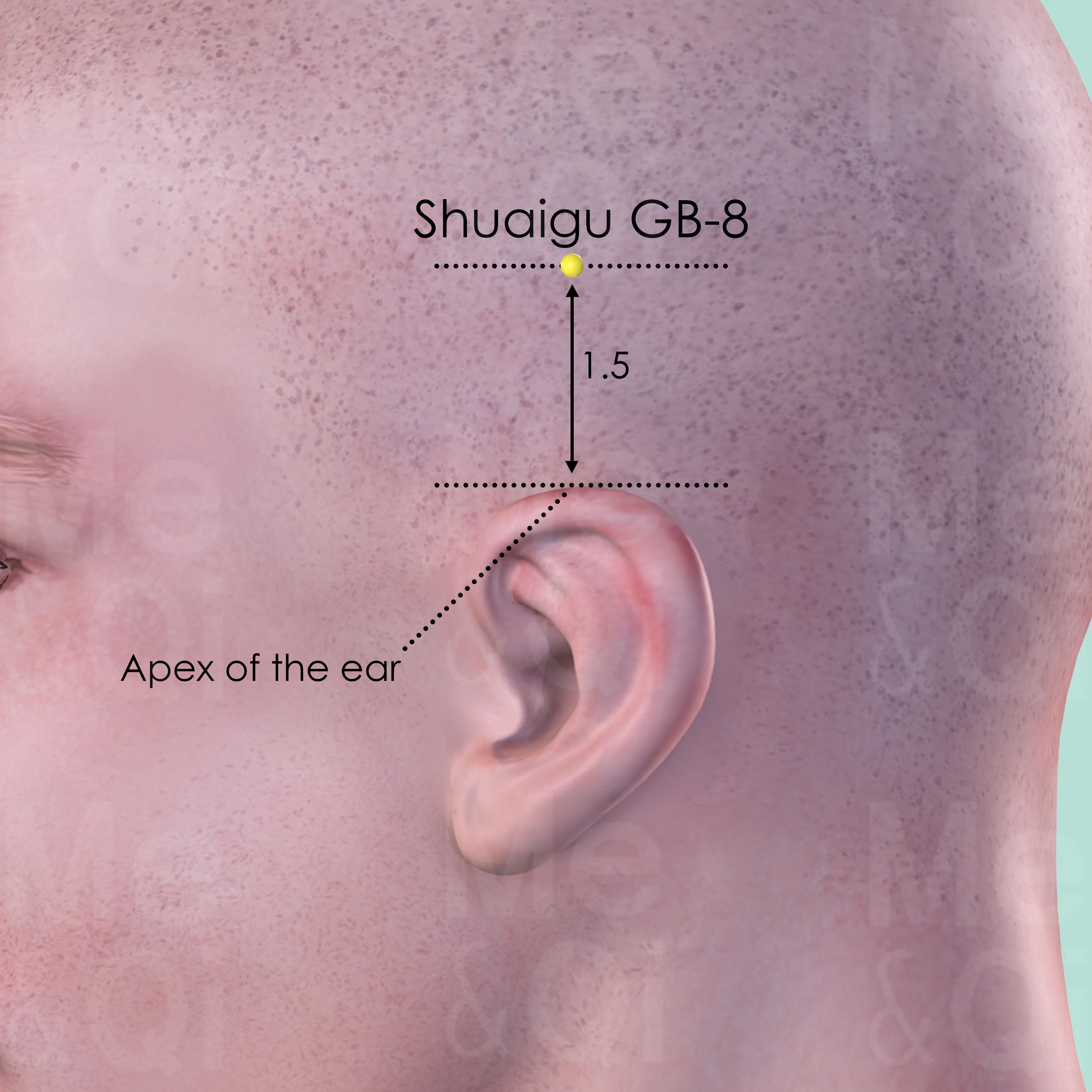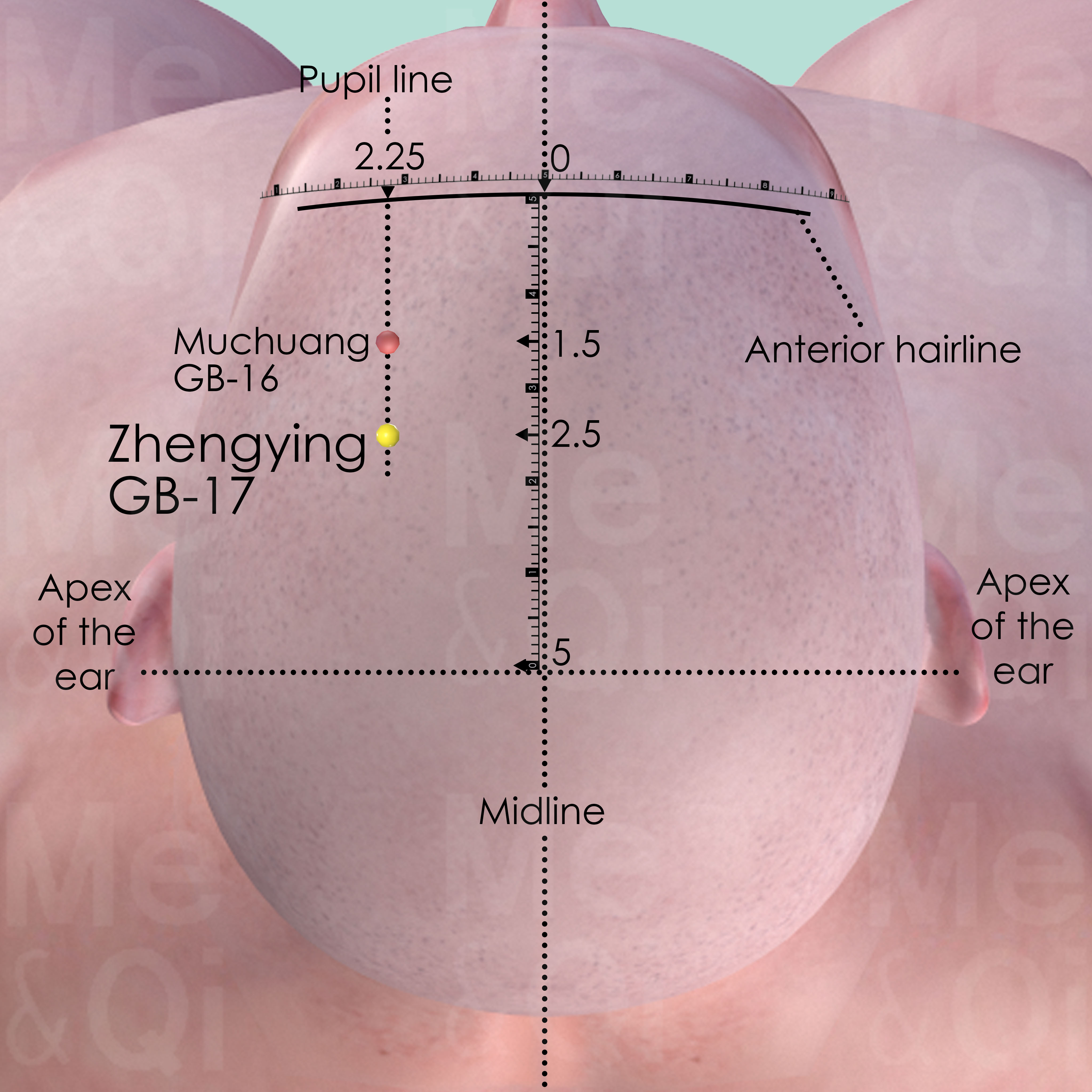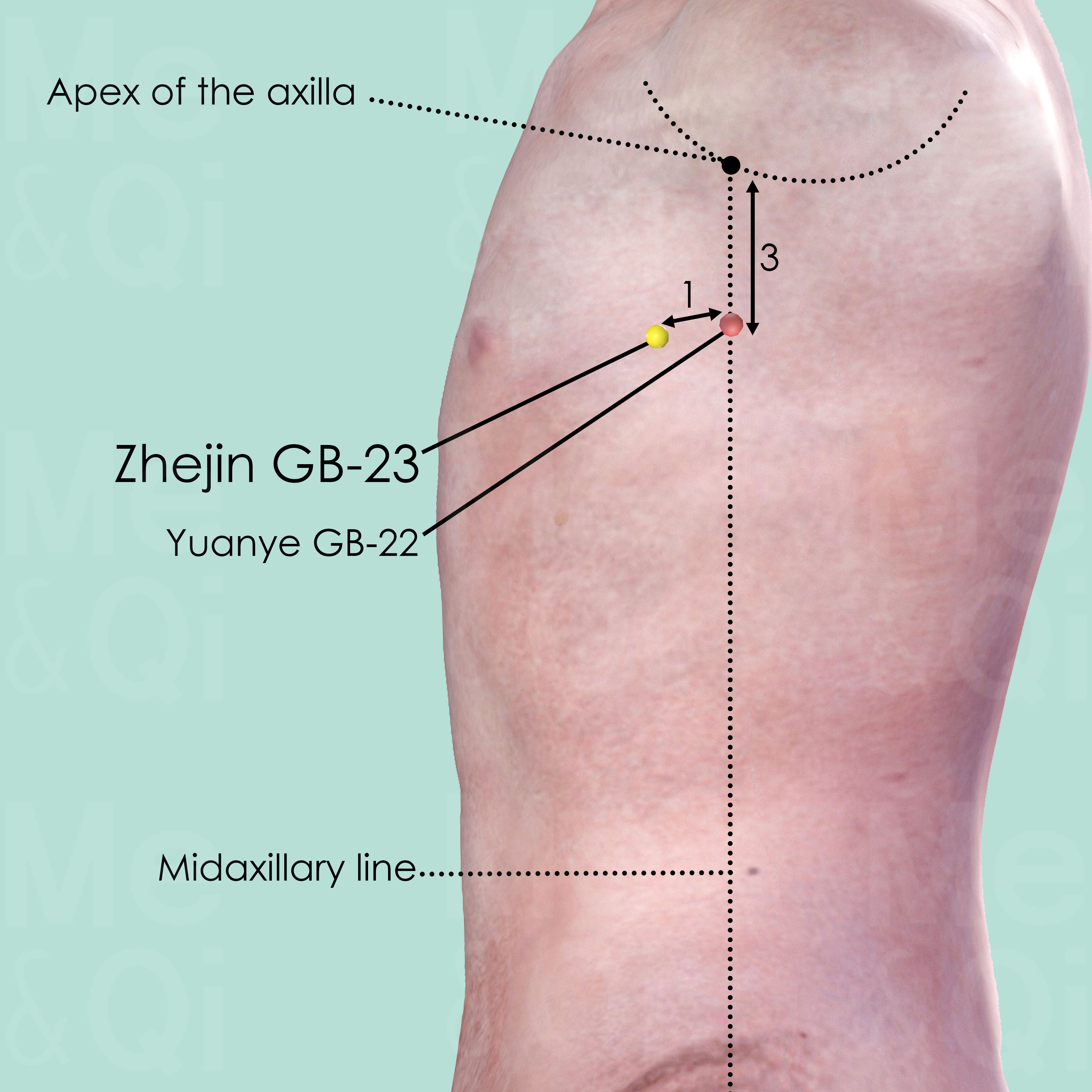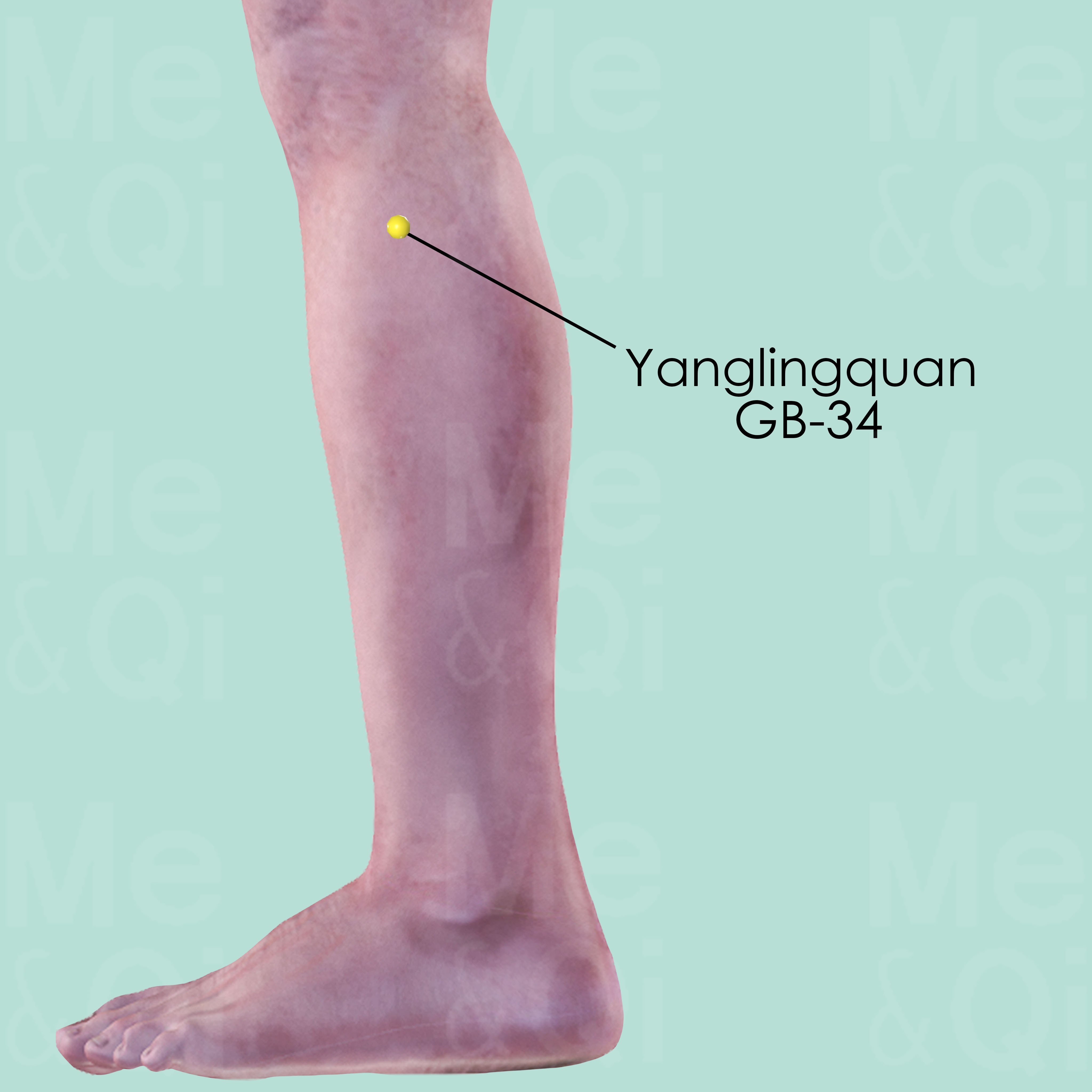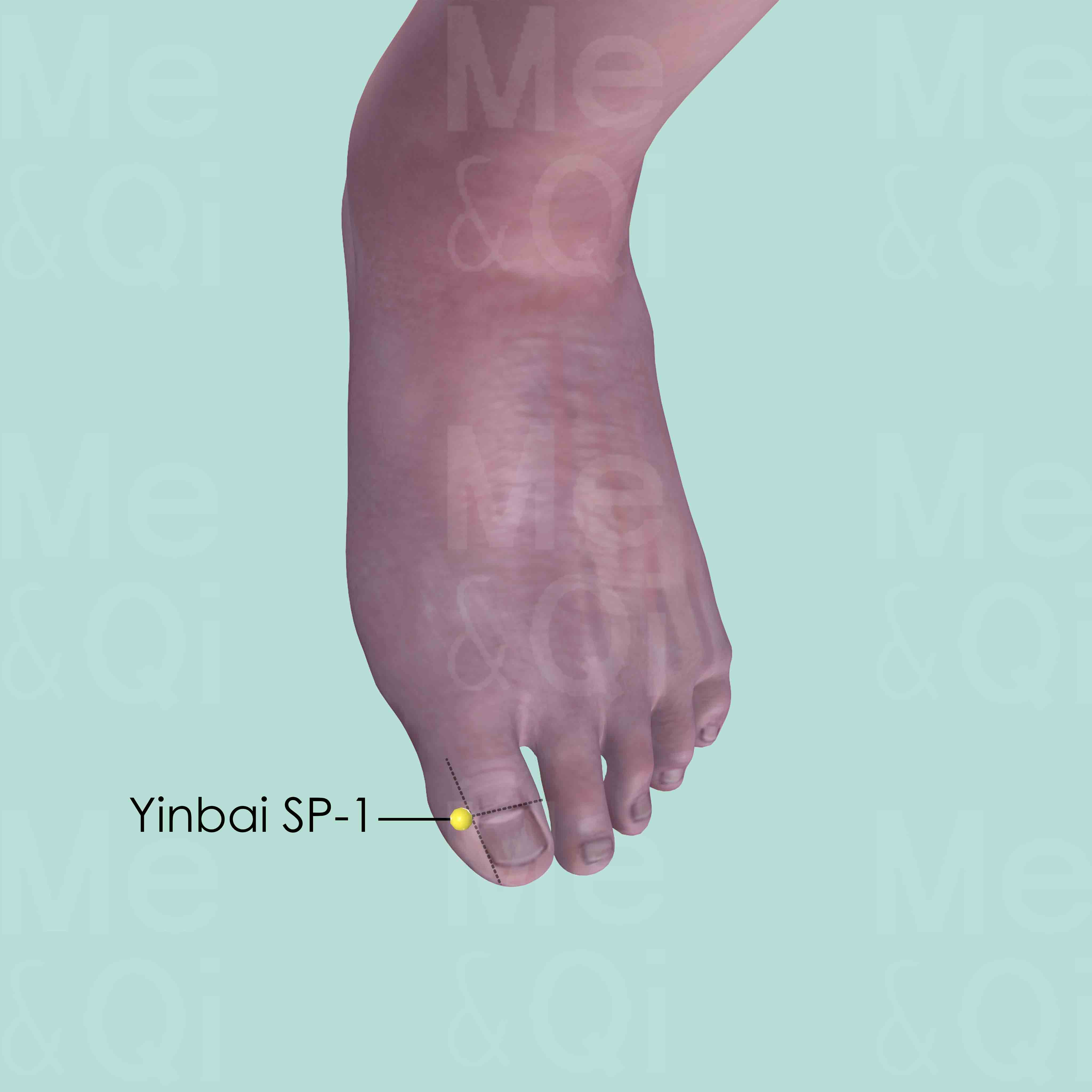Vomitaccording to TCM
Symptom family: Nausea and Vomiting
Parent symptom: Nausea Or Vomiting
Sub-symptom(s): Vomiting Of Sour Fluids Vomiting Undigested Food Vomiting After Eating Neurogenic Vomiting Vomiting Blood Vomiting Clear Liquid Potential Vomiting Of Blood
Root Causes of Vomit in TCM
Explore below more details about what might cause Vomit according to TCM.
- By Syndrome
- By Organ
- Heat
- Phlegm
- Cold
- Qi Stagnation
- Dampness
- Yang Deficiency
- Qi Rebellion
- Mind Disturbance
- Qi Deficiency
- Blood Stasis
- Wind
- Blood Deficiency
- Summer Heat
- View More Causes
- Stomach
- Liver
- Spleen
- Triple Burner
- Heart
- Lung
- Kidney
- Gallbladder
- Bladder
- Small Intestine
- View More Organs
Heat
In TCM "Heat" signifies an excess of Yang energy, leading to an imbalance where heat predominates over the body's cool Yin aspects. This condition is metaphorically akin to an internal over-heating. Symptoms indicative of Heat can include feelings of warmth, fever, sweating, irritability, red face, thirst with a preference for cold drinks, and a rapid pulse. The tongue may appear red with a yellow coating. Unlike the common interpretation of heat in terms of temperature, in TCM, it represents a state of hyperactivity or inflammation in the body.... see more
Heat Patterns That Can Lead to Vomit
Common Symptoms: Bitter Taste In The Mouth Restlessness Thirst Constipation Dark Urine Dizziness Flushed Face Dry Stools
| Pattern Name | Relevant Symptoms | Relevant Formulas |
|---|---|---|
| Damp-Heat in the Liver | Vomiting, Hypochondrial fullness with warmth relief, Abdominal fullness, Lower abdominal fullness, Bitter taste in the mouth, Sticky taste in the mouth, Lack of appetite, Nausea, Feeling of heaviness, Yellow vaginal discharge, Vaginal itching, Vulvar eczema, Vulvar sores, Bleeding between periods, Midcycle bleeding pain, Red and swollen scrotum, Red and swelling genital, Papules, Itchy vesicular rashes, Urinary dysfunction, Urinary burning, Dark urine... see more | Long Dan Xie Gan Tang | Yin Chen Hao Tang |
| Half Exterior Half Interior | Vomiting, Chest distension, Bitter taste in the mouth, Dry cough, Anxiety, Restlessness, Vomit, Lack of appetite, Dizziness, Blurry vision... see more | Xiao Chai Hu Tang |
| Stomach Heat or Fire | Vomiting of fluids soon after drinking, Upper abdominal burning pain, Excessive thirst, Craving for cold beverages, Restlessness, Dry stools, Dry mouth, Mouth ulcers, Acid reflux, Nausea, Vomiting after eating, Excessive hunger, Bad breath, Feeling hot, Acne... see more | Tiao Wei Cheng Qi Tang | Qing Wei San | Xie Huang San | Fei Er Wan | Hua Ban Tang |
| Liver Fire Blazing | Haematemesis, Irritability, Anger, Tinnitus, Deafness, Temporal headache, Dizziness, Flushed face, Eye hyperemia, Thirst, Bitter taste in the mouth, Vivid dreaming, Constipation, Dry stools, Dark urine, Nosebleeds, Hemoptysis, Vomiting blood... see more | Long Dan Xie Gan Tang | Dang Gui Long Hui Wan | Xie Qing Wan |
| Liver Wind agitating Internally due to Liver Fire | Haematemesis, Tremors, Irritability, Anger, Tinnitus, Deafness, Temporal headache, Dizziness, Flushed face, Eye hyperemia, Thirst, Bitter taste in the mouth, Vivid dreaming, Constipation, Dry stools, Dark urine, Nosebleeds, Vomiting blood, Hemoptysis... see more | Ling Jiao Gou Teng Tang | Zi Xue Dan | Feng Yin Tang |
| Heat in the Blood | Vomiting of blood, Feeling hot, Red skin eruptions, Thirst, Frequent bleeding, Bloody sputum, Hematochezia, Hematuria, Vomiting blood, Hemoptysis, Nosebleeds, Excessive menstruation... see more | Hua Ban Tang | Xi Jiao Di Huang Tang | Gu Jing Wan | Shi Hui San | Bai He Di Huang Tang | Qing Ying Tang | Qing Re Gu Jing Tang |
| Heat victorious agitating Blood | Vomiting of blood, Restlessness, High fever, Mania, Macules, Vomiting blood, Nosebleeds, Hematochezia, Hematuria... see more | Xi Jiao Di Huang Tang |
| Heat in Gall Bladder | Spitting up bitter or sour fluids, Mild chills with high fever, Bitter taste in the mouth, Stifling sensation in the chest, Vomiting of sour fluids, Thirst, Hypochondriac pain and discomfort, Nausea, Upper abdominal fullness, Cholecystitis, Icteric hepatitis... see more | Hao Qin Qing Dan Tang |
| Stomach Fire or Stomach Heat | Vomiting of food, Toothache, Headaches, Stomatitis, Periodontitis, Glossitis, Trigeminal neuralgia, Diabetes, Viral myocarditis, Breast engorgement, Breast lumps... see more | Wen Dan Tang | Yu Nu Jian |
Phlegm
In TCM "Phlegm" as a pattern of disharmony is a complex concept that extends beyond the physical manifestation of mucus. It represents a pathological factor that can disrupt the flow of Qi (vital energy) and blood, leading to various health issues. Phlegm in TCM is seen as a sticky, turbid substance arising from the body's inability to metabolize fluids properly, often due to a dysfunction of the spleen. It's not only associated with respiratory problems like cough and congestion but also with systemic issues. Symptoms can include a feeling of heaviness, mental cloudiness, dizziness, and in some cases, the formation of lumps or masses. Phlegm can even be "invisible," contributing to emotional disturbances like depression or stress. ... see more
Phlegm Patterns That Can Lead to Vomit
Common Symptoms: Nausea Dizziness Chronic Gastritis Peptic Ulcer Chest Distension Tight Feeling In Chest And Stomach Focal Distention Profuse White Sputum
| Pattern Name | Relevant Symptoms | Relevant Formulas |
|---|---|---|
| Phlegm | Vomiting, Feeling of oppression of the chest, Head fog, Dizziness | Ling Gui Zhu Gan Tang | Xiao Ban Xia Tang |
| Phlegm Misting the Heart | Vomiting, Confusion, Loss of consciousness, Hypersomnia, Incoherent or confused speech, Slurred speech, Aphasia, Noisy breathing, Vomit... see more | Wen Dan Tang | Di Tan Tang | Gun Tan Wan | Su He Xiang Wan |
| Phlegm-Fluids | Vomiting of watery fluids, Abdominal distention, Vomiting clear liquid, Feeling of heaviness, Shortness of breath, Hypochondrial pain that is worse on coughing and breathing, Coughing, Lack of sweating, Absence of thirst, Edema, Chest distension... see more | Er Chen Tang | Ling Gui Zhu Gan Tang | Wen Dan Tang | Wu Ling San |
| Phlegm-Fluids in the Stomach and Small intestine | Vomiting of watery fluids, Abdominal distention, Vomiting clear liquid, Dry tongue, Dry mouth without desire to drink, Stomach splashing sound, Chest distension, Diarrhea, Weight loss... see more | Xiao Chai Hu Tang | Ling Gui Zhu Gan Tang | Xuan Fu Dai Zhe Tang | Ban Xia Xie Xin Tang |
| Damp-Cold Phlegm | Vomiting, Nausea, Vomit, Tight feeling in chest and stomach, Palpitations, Dizziness, Focal distention, Profuse white sputum, Upper respiratory tract infections, Chronic bronchitis, Emphysema... see more | Er Chen Tang |
| Phlegm-Dampness in the Middle-Burner | Vomiting, Nausea, Vomit, Tight feeling in chest and stomach, Focal distention, Profuse white sputum, Anorexia, Peptic ulcer, Chronic gastritis, Acid reflux, Abdominal pain... see more | Liu Jun Zi Tang |
| Stomach Qi Deficiency with Phelgm | Regurgitation, Persistent belching, Hiccups, Vomit, Nausea or vomiting, Upper abdominal focal distention, Chronic gastritis, Stomach prolapse, Stomach dilation, Peptic ulcer, Chronic hepatitis... see more | Xuan Fu Dai Zhe Tang |
Cold
In TCM "Cold" as a pattern of disharmony refers to a specific type of imbalance within the body's systems, often linked to a deficiency or weakness. It's not about feeling physically cold or having a common cold, but rather a metaphorical description of certain symptoms and underlying conditions. When a TCM practitioner says someone suffers from "Cold," it usually implies that the body's Yang energy, which is warm and active, is insufficient or overpowered by Yin energy, which is cool and passive. Symptoms of Cold in TCM can include a general feeling of coldness, cold limbs, pale complexion, low energy, slow metabolism, and a preference for warmth. ... see more
Cold Patterns That Can Lead to Vomit
Common Symptoms: Nausea Chills Tight Feeling In Chest And Stomach Diarrhea Cold Extremities Vomiting Clear Liquid Palpitations Dizziness
| Pattern Name | Relevant Symptoms | Relevant Formulas |
|---|---|---|
| Exterior Cold with Interior Dampness in Summer | Vomiting, Chills with warm skin, Lack of sweating, Heavy sensation in the head, Headaches, Abdominal pain, Vomit, Diarrhea, Tight feeling in chest and stomach, Fatigued extremities, Nausea... see more | Xiang Ru San |
| Greater Yin stage | Vomiting, Lack of appetite, Vomit, Abdominal fullness, Chills, Diarrhea, Absence of thirst, Generalized fatigue... see more | Li Zhong Wan |
| Cold invading the Stomach | Vomiting of clear fluids, Severe upper abdominal pain, Chills, Cold extremities, Desire for hot beverages and foods, Vomiting clear liquid, Nausea, Deterioration after cold beverages... see more | Huo Xiang Zheng Qi San | Liang Fu Wan | Wu Zhu Yu Tang |
| Stagnation of Cold in the Liver Channel | Vomiting of clear fluids, Hypochondrial fullness with warmth relief, Testicular pain, Scrotal contraction, Vertical headaches, Chills, Cold extremities, Vomiting clear liquid, Vaginal atrophy... see more | Nuan Gan Jian |
| Damp-Cold Phlegm | Vomiting, Nausea, Vomit, Tight feeling in chest and stomach, Palpitations, Dizziness, Focal distention, Profuse white sputum, Upper respiratory tract infections, Chronic bronchitis, Emphysema... see more | Er Chen Tang |
Qi Stagnation
Qi Stagnation in TCM is like having a traffic jam in your body's energy system. Qi, the vital life force that flows through your body, is supposed to move smoothly to maintain health and balance. But with Qi Stagnation, this flow gets blocked or slowed down, like cars stuck on a highway. This can lead to symptoms like feeling stressed, emotional mood swings, and physical discomfort, often described as a feeling of fullness or tightness, especially in the chest or abdomen. It's as though the body's internal energy circulation is disrupted, causing various issues. TCM sees this as an energy flow problem, different from modern medicine's focus on specific physiological processes.... see more
Qi Stagnation Patterns That Can Lead to Vomit
Common Symptoms: Irritability Belching Upper Abdominal Distension Depression Lack Of Appetite Abdominal Distention Sighing Mood Swings
| Pattern Name | Relevant Symptoms | Relevant Formulas |
|---|---|---|
| Liver Qi Stagnation | Vomiting, Hypochondriac distention, Chest distension, Upper abdominal distension, Abdominal distention, Sighing, Melancholia, Depression, Mood swings, Irregular periods, Globus sensation, Pre menstrual breast distension, Pre menstrual tension, Anxiety, Anger... see more | Xiao Yao San | Jia Wei Xiao Yao San | Yue Ju Wan | Chai Hu Shu Gan San | Yi Guan Jian |
| Stomach Qi Stagnation | Vomiting, Upper abdominal pain, Upper abdominal distension, Belching, Nausea, Vomit, Hiccups, Irritability... see more | Ban Xia Hou Pu Tang | Zuo Jin Wan |
| Qi Stagnation | Vomiting, General fullness, Moving pain, Depression, Irritability, Mood swings, Sighing | Yue Ju Wan |
| Liver Qi Stagnation invading the Stomach | Vomiting of food, Belching, Abdominal distention, Upper abdominal distension, Depression, Irritability, Dry mouth, Lack of appetite, Craving for sour foods, Dry throat, Acid reflux... see more | Ban Xia Hou Pu Tang | Zuo Jin Wan |
Dampness
"Dampness" in TCM is a concept that describes a pattern of disharmony where the body accumulates excess moisture. Imagine the heavy, sticky feeling you get on a very humid day; that's similar to what dampness feels like internally. It can manifest as a sense of heaviness, bloating, sluggishness, or even a foggy mind. This condition is often thought to arise from environmental factors like living in a damp place, dietary habits that promote moisture in the body, or internal imbalances that hinder the body's ability to process fluids properly. In TCM, dampness can obstruct the normal flow of energy and fluids in the body, leading to various symptoms.... see more
Dampness Patterns That Can Lead to Vomit
Common Symptoms: Nausea Tight Feeling In Chest And Stomach Focal Distention Profuse White Sputum Chronic Gastritis Peptic Ulcer Abdominal Pain Hypochondrial Fullness With Warmth Relief
| Pattern Name | Relevant Symptoms | Relevant Formulas |
|---|---|---|
| Damp-Heat in the Liver | Vomiting, Hypochondrial fullness with warmth relief, Abdominal fullness, Lower abdominal fullness, Bitter taste in the mouth, Sticky taste in the mouth, Lack of appetite, Nausea, Feeling of heaviness, Yellow vaginal discharge, Vaginal itching, Vulvar eczema, Vulvar sores, Bleeding between periods, Midcycle bleeding pain, Red and swollen scrotum, Red and swelling genital, Papules, Itchy vesicular rashes, Urinary dysfunction, Urinary burning, Dark urine... see more | Long Dan Xie Gan Tang | Yin Chen Hao Tang |
| Exterior Cold with Interior Dampness in Summer | Vomiting, Chills with warm skin, Lack of sweating, Heavy sensation in the head, Headaches, Abdominal pain, Vomit, Diarrhea, Tight feeling in chest and stomach, Fatigued extremities, Nausea... see more | Xiang Ru San |
| Damp-Cold Phlegm | Vomiting, Nausea, Vomit, Tight feeling in chest and stomach, Palpitations, Dizziness, Focal distention, Profuse white sputum, Upper respiratory tract infections, Chronic bronchitis, Emphysema... see more | Er Chen Tang |
| Phlegm-Dampness in the Middle-Burner | Vomiting, Nausea, Vomit, Tight feeling in chest and stomach, Focal distention, Profuse white sputum, Anorexia, Peptic ulcer, Chronic gastritis, Acid reflux, Abdominal pain... see more | Liu Jun Zi Tang |
Yang Deficiency
Yang deficiency in TCM refers to a state where the body's Yang energy, which is responsible for warmth, activity, and function, is weakened or diminished. This pattern of disharmony often arises from chronic illness, aging, or inherent constitutional weakness. Symptoms of Yang deficiency are typically associated with cold and sluggishness, such as a feeling of coldness, cold extremities, pale complexion, low energy or fatigue, and a desire for warmth. Digestive issues like poor appetite, loose stools, and water retention can also be indicative of Yang deficiency.... see more
Yang Deficiency Patterns That Can Lead to Vomit
Common Symptoms: Generalized Fatigue Lack Of Appetite Chills Diarrhea Absence Of Thirst Abdominal Fullness Abdominal Pain That Worsens With Cold Urinary Dysfunction
| Pattern Name | Relevant Symptoms | Relevant Formulas |
|---|---|---|
| Greater Yin stage | Vomiting, Lack of appetite, Vomit, Abdominal fullness, Chills, Diarrhea, Absence of thirst, Generalized fatigue... see more | Li Zhong Wan |
| Stomach Yang Deficient and Cold | Vomiting of clear fluids, Epigastric pain relieved with pressure or eating, Lack of appetite, Desire for hot beverages and foods, Vomiting clear liquid, Absence of thirst, Weak limbs, Cold extremities, Generalized fatigue, Pale face... see more | Xiang Sha Yang Wei Wan | Huang Qi Jian Zhong Tang | Wu Zhu Yu Tang | Xiao Jian Zhong Tang |
| Spleen or Kidney Yang Deficiency | Vomiting, Abdominal pain that worsens with cold, Urinary dysfunction, Deep pain and heaviness in limbs, Dizziness, Heavy sensation in the head, Edema, Diarrhea, Palpitations, Coughing, Vomit... see more | Zhen Wu Tang |
Qi Rebellion
Rebellious Qi in TCM is a bit like having a rebel inside your body. Qi, which is the vital energy flowing through your body, is supposed to move in certain directions to keep everything in balance and working well. But with Rebellious Qi, this energy decides to go the opposite way. Think of it like a river flowing upstream instead of downstream. This can cause various issues like heartburn, coughing, or even headaches. It's as if the body's natural flow is disrupted, creating a kind of internal chaos. TCM focuses on correcting this flow, restoring order and balance.... see more
Qi Rebellion Patterns That Can Lead to Vomit
Common Symptoms: Nausea Coughing Asthma Headaches Hiccups Belching Dizziness Loss Of Consciousness
| Pattern Name | Relevant Symptoms | Relevant Formulas |
|---|---|---|
| Rebellious Lung Qi | Vomiting, Vomiting of blood, Coughing, Asthma, Nausea, Vomit, Dizziness, Headaches, Loss of consciousness | Su Zi Jiang Qi Tang | Jin Fei Cao San |
| Rebellious Qi | Vomiting, Hiccups, Belching, Nausea, Vomit, Coughing, Asthma | Chai Hu Shu Gan San | Su Zi Jiang Qi Tang | Xuan Fu Dai Zhe Tang | Ju Pi Zhu Ru Tang | Si Ni San |
| Rebellious Stomach Qi | Vomiting, Nausea, Dysphagia, Belching, Vomit, Hiccups | Ding Xiang Shi Di Tang | Huo Xiang Zheng Qi San | Ban Xia Hou Pu Tang |
Mind Disturbance
In TCM "Shen" refers to the mind or spirit, and a Shen disturbance is a pattern of disharmony that affects the mental and emotional state. This concept reflects the TCM belief in the deep interconnectedness of mind and body. Symptoms of Shen disturbance can vary widely but often include anxiety, insomnia, restlessness, confusion, or in severe cases, hallucinations or delirium. These symptoms indicate an imbalance in the body's energies affecting the heart, which in TCM is not only the center of blood circulation but also the seat of the mind and consciousness. The root of Shen disturbance can be traced to various factors, including emotional stress, physical illness, or an imbalance in fundamental substances like Qi, Yin, or Yang.... see more
Mind Disturbance Patterns That Can Lead to Vomit
Common Symptoms: Confusion Loss Of Consciousness Hypersomnia Incoherent Or Confused Speech Slurred Speech Aphasia Noisy Breathing Staring At Walls
| Pattern Name | Relevant Symptoms | Relevant Formulas |
|---|---|---|
| Phlegm Misting the Heart | Vomiting, Confusion, Loss of consciousness, Hypersomnia, Incoherent or confused speech, Slurred speech, Aphasia, Noisy breathing, Vomit... see more | Wen Dan Tang | Di Tan Tang | Gun Tan Wan | Su He Xiang Wan |
| Heat victorious agitating Blood | Vomiting of blood, Restlessness, High fever, Mania, Macules, Vomiting blood, Nosebleeds, Hematochezia, Hematuria... see more | Xi Jiao Di Huang Tang |
Qi Deficiency
Qi Deficiency in TCM is like running low on battery power. Qi is the vital energy that powers every function in your body. When there's a Qi Deficiency, it means your body doesn't have enough of this essential energy. This can make you feel tired all the time, weak, or even cause shortness of breath. It's similar to how you feel when you haven't had enough sleep or nutritious food. Your body just doesn't have the energy it needs to perform at its best. Unlike modern medicine, which often focuses on specific physical causes for fatigue and weakness, TCM views Qi Deficiency as an overall energy depletion that affects your entire well-being, and it seeks to replenish and balance this vital energy.... see more
Qi Deficiency Patterns That Can Lead to Vomit
Common Symptoms: Chronic Hepatitis Stomach Prolapse Dizziness Unsteadiness Blurry Vision Deafness Tinnitus Shortness Of Breath
| Pattern Name | Relevant Symptoms | Relevant Formulas |
|---|---|---|
| Spleen and Stomach Qi Deficiency | Vomiting, Dizziness, Unsteadiness, Blurry vision, Deafness, Tinnitus, Shortness of breath, Weak voice, Pale face, Lack of appetite, Diarrhea... see more | Xiang Sha Liu Jun Zi Tang |
| Stomach Qi Deficiency with Phelgm | Regurgitation, Persistent belching, Hiccups, Vomit, Nausea or vomiting, Upper abdominal focal distention, Chronic gastritis, Stomach prolapse, Stomach dilation, Peptic ulcer, Chronic hepatitis... see more | Xuan Fu Dai Zhe Tang |
Blood Stasis
Blood Stasis in TCM is a concept where the blood flow in the body is not as smooth or efficient as it should be. Imagine a river that's supposed to flow freely, but instead, it's getting blocked or moving too slowly in some parts. This can lead to various health issues, like pain that feels sharp or stabbing, dark bruises, and a complexion that looks purplish. TCM believes that good health relies on the smooth and vibrant flow of Qi and blood throughout the body, so when blood gets stuck, it's like a traffic jam in your body, leading to discomfort or health problems.... see more
Blood Stasis Patterns That Can Lead to Vomit
Common Symptoms: Vomiting Blood Nocturnal Epigastric Pain Abdominal Pain Worsened By Pressure Nausea Or Vomiting Potential Vomiting Of Blood Hematochezia Upper Abdominal Pain Nausea
| Pattern Name | Relevant Symptoms | Relevant Formulas |
|---|---|---|
| Stomach Blood Stagnation | Vomiting, Vomiting of blood, Possible vomiting of blood, Nocturnal epigastric pain, Abdominal pain worsened by pressure, Nausea or vomiting, Potential vomiting of blood, Hematochezia... see more | Xue Fu Zhu Yu Tang | Ge Xia Zhu Yu Tang | Shi Xiao San |
| Liver Blood Stagnation | Vomiting of blood, Hypochondriac pain, Abdominal pain, Vomiting blood, Nosebleeds, Menstrual cramps, Irregular periods, Dark menstrual clots, Infertility, Abdominal masses, Purple nails, Purple lips, Purple face, Skin dryness, Petechiae... see more | Xiao Yao San | Chai Hu Shu Gan San | Ge Xia Zhu Yu Tang | Shi Xiao San |
Wind
In TCM "Wind" is a concept that represents a pattern of disharmony, often characterized by its sudden and unpredictable nature, much like a gusty wind changing direction without warning. This pattern is associated with symptoms that come and go quickly or move around the body, such as itching, tremors, or even certain types of pain. Wind is considered to be a primary cause of illnesses that have these rapidly changing characteristics. In TCM, external Wind often refers to illnesses that start suddenly, like the common cold, believed to be caused by external pathogenic factors like climatic changes. On the other hand, internal Wind can be linked to internal imbalances and can manifest in conditions like dizziness or spasms. ... see more
Wind Patterns That Can Lead to Vomit
Common Symptoms: Aversion To Cold Fever Urinary Retention Slight Thirst Vomiting After Eating Tremors Irritability Anger
| Pattern Name | Relevant Symptoms | Relevant Formulas |
|---|---|---|
| Greater Yang Accumulation of Water | Vomiting of fluids soon after drinking, Aversion to cold, Fever, Urinary retention, Slight thirst, Vomiting after eating | Wu Ling San |
| Liver Wind agitating Internally due to Liver Fire | Haematemesis, Tremors, Irritability, Anger, Tinnitus, Deafness, Temporal headache, Dizziness, Flushed face, Eye hyperemia, Thirst, Bitter taste in the mouth, Vivid dreaming, Constipation, Dry stools, Dark urine, Nosebleeds, Vomiting blood, Hemoptysis... see more | Ling Jiao Gou Teng Tang | Zi Xue Dan | Feng Yin Tang |
Blood Deficiency
Blood Deficiency in TCM is like when your body's tank runs low on the vital energy that blood provides. It's not exactly the same as anemia in modern medicine, which is about having too few red blood cells. Instead, Blood Deficiency in TCM is about your body not having enough of the life-giving qualities that blood brings, like nourishment and moisture. This can make you feel tired, look pale, and even feel dizzy or have blurry vision. It's like a garden not getting enough water to stay lush and vibrant. TCM sees this as an imbalance where the body isn't being nourished as it should be, impacting overall health and well-being.... see more
Blood Deficiency Patterns That Can Lead to Vomit
| Pattern Name | Relevant Symptoms | Relevant Formulas |
|---|---|---|
| Loss of Blood | Vomiting of blood, Nosebleeds, Uterine hemorrhage, Hematuria, Hematochezia, Hemoptysis, Vomiting blood, Dark menstrual clots, Excessive menstruation, Bloody sputum... see more | Xi Jiao Di Huang Tang |
Summer Heat
"Summer-Heat" in TCM is a unique concept that refers to a pattern of disharmony often associated with the hot summer months. Imagine the intense heat of summer stressing your body, like being in a sweltering, humid environment for too long. This can lead to symptoms like feeling overheated, excessive sweating, a feeling of irritation, and sometimes even nausea or dizziness. In TCM, this condition is thought to arise from the external environment's heat affecting the body's internal balance. It's similar to how we might feel uncomfortable and out of sorts on a very hot day. ... see more
Summer Heat Patterns That Can Lead to Vomit
| Pattern Name | Relevant Symptoms | Relevant Formulas |
|---|---|---|
| Summer-Heat | Vomiting, Fever, Aversion to cold, Perspiration, Headaches, Feeling of heaviness, Upper abdominal discomfort, Irritability, Thirst... see more | Liu Yi San |
Stomach
In TCM the Stomach is regarded as the "sea of nourishment," pivotal for digesting food and transforming it into Qi and blood. It works closely with the Spleen to distribute these essential nutrients throughout the body. When the Stomach is out of balance or malfunctions in TCM, it often leads to digestive problems such as bloating, nausea, vomiting, poor appetite, or a feeling of fullness. There may also be issues like acid reflux or a sour taste in the mouth. Emotionally, an imbalanced Stomach can contribute to excessive worry and overthinking, reflecting the TCM belief that physical and emotional well-being are deeply interconnected.... see more
Stomach Patterns That Can Lead to Vomit
Common Symptoms: Nausea Belching Lack Of Appetite Hiccups Irritability Abdominal Distention Acid Reflux Dry Mouth
| Pattern Name | Relevant Symptoms | Relevant Formulas |
|---|---|---|
| Rebellious Stomach Qi | Vomiting, Nausea, Dysphagia, Belching, Vomit, Hiccups | Ding Xiang Shi Di Tang | Huo Xiang Zheng Qi San | Ban Xia Hou Pu Tang |
| Stomach Qi Stagnation | Vomiting, Upper abdominal pain, Upper abdominal distension, Belching, Nausea, Vomit, Hiccups, Irritability... see more | Ban Xia Hou Pu Tang | Zuo Jin Wan |
| Stomach Blood Stagnation | Vomiting, Vomiting of blood, Possible vomiting of blood, Nocturnal epigastric pain, Abdominal pain worsened by pressure, Nausea or vomiting, Potential vomiting of blood, Hematochezia... see more | Xue Fu Zhu Yu Tang | Ge Xia Zhu Yu Tang | Shi Xiao San |
| Food Stagnation in the Stomach | vomiting of sour fluids, Epigastric fullness and pain relieved by vomiting, Nausea, Bad breath, Acid reflux, Belching, Insomnia, Alternating diarrhea and constipation, Lack of appetite, Abdominal pain due to overeating... see more | Bao He Wan | Zhi Shi Dao Zhi Wan | Gua Di San |
| Stomach Heat or Fire | Vomiting of fluids soon after drinking, Upper abdominal burning pain, Excessive thirst, Craving for cold beverages, Restlessness, Dry stools, Dry mouth, Mouth ulcers, Acid reflux, Nausea, Vomiting after eating, Excessive hunger, Bad breath, Feeling hot, Acne... see more | Tiao Wei Cheng Qi Tang | Qing Wei San | Xie Huang San | Fei Er Wan | Hua Ban Tang |
| Cold invading the Stomach | Vomiting of clear fluids, Severe upper abdominal pain, Chills, Cold extremities, Desire for hot beverages and foods, Vomiting clear liquid, Nausea, Deterioration after cold beverages... see more | Huo Xiang Zheng Qi San | Liang Fu Wan | Wu Zhu Yu Tang |
| Stomach Yang Deficient and Cold | Vomiting of clear fluids, Epigastric pain relieved with pressure or eating, Lack of appetite, Desire for hot beverages and foods, Vomiting clear liquid, Absence of thirst, Weak limbs, Cold extremities, Generalized fatigue, Pale face... see more | Xiang Sha Yang Wei Wan | Huang Qi Jian Zhong Tang | Wu Zhu Yu Tang | Xiao Jian Zhong Tang |
| Phlegm-Fluids in the Stomach and Small intestine | Vomiting of watery fluids, Abdominal distention, Vomiting clear liquid, Dry tongue, Dry mouth without desire to drink, Stomach splashing sound, Chest distension, Diarrhea, Weight loss... see more | Xiao Chai Hu Tang | Ling Gui Zhu Gan Tang | Xuan Fu Dai Zhe Tang | Ban Xia Xie Xin Tang |
| Spleen and Stomach Qi Deficiency | Vomiting, Dizziness, Unsteadiness, Blurry vision, Deafness, Tinnitus, Shortness of breath, Weak voice, Pale face, Lack of appetite, Diarrhea... see more | Xiang Sha Liu Jun Zi Tang |
| Stomach Qi Deficiency with Phelgm | Regurgitation, Persistent belching, Hiccups, Vomit, Nausea or vomiting, Upper abdominal focal distention, Chronic gastritis, Stomach prolapse, Stomach dilation, Peptic ulcer, Chronic hepatitis... see more | Xuan Fu Dai Zhe Tang |
| Liver Qi Stagnation invading the Stomach | Vomiting of food, Belching, Abdominal distention, Upper abdominal distension, Depression, Irritability, Dry mouth, Lack of appetite, Craving for sour foods, Dry throat, Acid reflux... see more | Ban Xia Hou Pu Tang | Zuo Jin Wan |
| Stomach Fire or Stomach Heat | Vomiting of food, Toothache, Headaches, Stomatitis, Periodontitis, Glossitis, Trigeminal neuralgia, Diabetes, Viral myocarditis, Breast engorgement, Breast lumps... see more | Wen Dan Tang | Yu Nu Jian |
Liver
In TCM the Liver is viewed as the organ responsible for the smooth flow of Qi, Blood, and emotions throughout the body. It plays a key role in regulating mood, storing blood, supporting digestion, and ensuring the health of tendons and eyes. When the Liver malfunctions or is imbalanced in TCM, it can lead to a range of issues such as irritability, mood swings, menstrual irregularities, eye problems, and muscular stiffness or pain. A malfunctioning Liver in TCM reflects not only physical disturbances but also emotional and mental disharmony, emphasizing the holistic approach of TCM in addressing health and wellness.... see more
Liver Patterns That Can Lead to Vomit
Common Symptoms: Irritability Bitter Taste In The Mouth Lack Of Appetite Dark Urine Menstrual Cramps Irregular Periods Anger Constipation
| Pattern Name | Relevant Symptoms | Relevant Formulas |
|---|---|---|
| Damp-Heat in the Liver | Vomiting, Hypochondrial fullness with warmth relief, Abdominal fullness, Lower abdominal fullness, Bitter taste in the mouth, Sticky taste in the mouth, Lack of appetite, Nausea, Feeling of heaviness, Yellow vaginal discharge, Vaginal itching, Vulvar eczema, Vulvar sores, Bleeding between periods, Midcycle bleeding pain, Red and swollen scrotum, Red and swelling genital, Papules, Itchy vesicular rashes, Urinary dysfunction, Urinary burning, Dark urine... see more | Long Dan Xie Gan Tang | Yin Chen Hao Tang |
| Liver Qi Stagnation | Vomiting, Hypochondriac distention, Chest distension, Upper abdominal distension, Abdominal distention, Sighing, Melancholia, Depression, Mood swings, Irregular periods, Globus sensation, Pre menstrual breast distension, Pre menstrual tension, Anxiety, Anger... see more | Xiao Yao San | Jia Wei Xiao Yao San | Yue Ju Wan | Chai Hu Shu Gan San | Yi Guan Jian |
| Liver Fire Blazing | Haematemesis, Irritability, Anger, Tinnitus, Deafness, Temporal headache, Dizziness, Flushed face, Eye hyperemia, Thirst, Bitter taste in the mouth, Vivid dreaming, Constipation, Dry stools, Dark urine, Nosebleeds, Hemoptysis, Vomiting blood... see more | Long Dan Xie Gan Tang | Dang Gui Long Hui Wan | Xie Qing Wan |
| Liver Wind agitating Internally due to Liver Fire | Haematemesis, Tremors, Irritability, Anger, Tinnitus, Deafness, Temporal headache, Dizziness, Flushed face, Eye hyperemia, Thirst, Bitter taste in the mouth, Vivid dreaming, Constipation, Dry stools, Dark urine, Nosebleeds, Vomiting blood, Hemoptysis... see more | Ling Jiao Gou Teng Tang | Zi Xue Dan | Feng Yin Tang |
| Liver Blood Stagnation | Vomiting of blood, Hypochondriac pain, Abdominal pain, Vomiting blood, Nosebleeds, Menstrual cramps, Irregular periods, Dark menstrual clots, Infertility, Abdominal masses, Purple nails, Purple lips, Purple face, Skin dryness, Petechiae... see more | Xiao Yao San | Chai Hu Shu Gan San | Ge Xia Zhu Yu Tang | Shi Xiao San |
| Stagnation of Cold in the Liver Channel | Vomiting of clear fluids, Hypochondrial fullness with warmth relief, Testicular pain, Scrotal contraction, Vertical headaches, Chills, Cold extremities, Vomiting clear liquid, Vaginal atrophy... see more | Nuan Gan Jian |
| Liver Qi Stagnation invading the Stomach | Vomiting of food, Belching, Abdominal distention, Upper abdominal distension, Depression, Irritability, Dry mouth, Lack of appetite, Craving for sour foods, Dry throat, Acid reflux... see more | Ban Xia Hou Pu Tang | Zuo Jin Wan |
Spleen
In TCM the Spleen plays a vital role in digestion and transformation, converting food into energy and nutrients, and overseeing the distribution of Qi and Blood. It's also crucial in maintaining the health of muscles and limbs and ensuring the blood remains within the vessels. When the Spleen malfunctions in TCM, it can lead to a variety of issues such as digestive disorders, fatigue, weak muscles, bloating, and a feeling of heaviness. It can also cause a pale complexion, poor appetite, and a tendency to bruise easily. Emotionally, a Spleen imbalance is often associated with excessive worry or overthinking, reflecting its role in the interplay between physical and mental health.... see more
Spleen Patterns That Can Lead to Vomit
Common Symptoms: Diarrhea Generalized Fatigue Lack Of Appetite Chills Dizziness Tinnitus Hypertension Abdominal Fullness
| Pattern Name | Relevant Symptoms | Relevant Formulas |
|---|---|---|
| Greater Yin stage | Vomiting, Lack of appetite, Vomit, Abdominal fullness, Chills, Diarrhea, Absence of thirst, Generalized fatigue... see more | Li Zhong Wan |
| Spleen and Stomach Qi Deficiency | Vomiting, Dizziness, Unsteadiness, Blurry vision, Deafness, Tinnitus, Shortness of breath, Weak voice, Pale face, Lack of appetite, Diarrhea... see more | Xiang Sha Liu Jun Zi Tang |
| Spleen or Kidney Yang Deficiency | Vomiting, Abdominal pain that worsens with cold, Urinary dysfunction, Deep pain and heaviness in limbs, Dizziness, Heavy sensation in the head, Edema, Diarrhea, Palpitations, Coughing, Vomit... see more | Zhen Wu Tang |
Triple Burner
In TCM the Triple Burner (or San Jiao) is a unique concept rather than a physical organ. It's seen as a system that oversees the flow and balance of Qi and bodily fluids across three regions of the body: the upper (respiratory and cardiovascular systems), middle (digestive system), and lower (urinary and reproductive systems). The Triple Burner facilitates the interaction between these systems, ensuring harmony in bodily functions. When it malfunctions in TCM, it can lead to a variety of symptoms depending on the affected region, such as respiratory issues, digestive problems, or urinary and reproductive disorders. The malfunction can also manifest as general imbalances in energy flow, temperature regulation, and fluid metabolism, reflecting the Triple Burner's role as a coordinator of the body's various processes and its importance in maintaining overall balance and health.... see more
Triple Burner Patterns That Can Lead to Vomit
| Pattern Name | Relevant Symptoms | Relevant Formulas |
|---|---|---|
| Phlegm-Dampness in the Middle-Burner | Vomiting, Nausea, Vomit, Tight feeling in chest and stomach, Focal distention, Profuse white sputum, Anorexia, Peptic ulcer, Chronic gastritis, Acid reflux, Abdominal pain... see more | Liu Jun Zi Tang |
Heart
In TCM the Heart is considered the "emperor" of all organs, primarily responsible for governing Blood and housing the mind, known as "Shen." It plays a crucial role in maintaining mental-emotional equilibrium and controlling the circulation of Qi and blood throughout the body. When the Heart is imbalanced or malfunctions in TCM, it can lead to a range of issues like heart palpitations, insomnia, dream-disturbed sleep, anxiety, and a flushed complexion. Emotional disturbances such as excessive joy or lack of joy are also seen as signs of Heart disharmony. These symptoms reflect not just physical heart conditions but also the state of one's Shen, indicating the interconnectedness of physical and emotional well-being in TCM.... see more
Heart Patterns That Can Lead to Vomit
| Pattern Name | Relevant Symptoms | Relevant Formulas |
|---|---|---|
| Phlegm Misting the Heart | Vomiting, Confusion, Loss of consciousness, Hypersomnia, Incoherent or confused speech, Slurred speech, Aphasia, Noisy breathing, Vomit... see more | Wen Dan Tang | Di Tan Tang | Gun Tan Wan | Su He Xiang Wan |
Lung
In TCM the Lungs are seen as the organ responsible for controlling Qi and respiration, as well as being a key part of the body's defensive system. They are thought to maintain the balance and flow of air and moisture, and are closely linked to the skin and hair. When the Lungs are imbalanced or malfunctioning in TCM, it can lead to respiratory issues like coughing or asthma, a weakened immune system, dry skin, and emotional disturbances such as sadness or grief. These symptoms are believed to arise from disruptions in the Lungs' ability to regulate Qi and protect the body, highlighting their central role in maintaining overall health and well-being.... see more
Lung Patterns That Can Lead to Vomit
| Pattern Name | Relevant Symptoms | Relevant Formulas |
|---|---|---|
| Rebellious Lung Qi | Vomiting, Vomiting of blood, Coughing, Asthma, Nausea, Vomit, Dizziness, Headaches, Loss of consciousness | Su Zi Jiang Qi Tang | Jin Fei Cao San |
Kidney
In TCM the Kidneys are regarded as the body's most fundamental reservoir of Essence, known as Jing, which influences growth, reproduction, and aging. They are not just organs for filtering blood, but a holistic system governing vital life forces. When the Kidneys malfunction in TCM, it can manifest as a variety of health issues, such as chronic fatigue, reproductive problems, imbalances in fluid metabolism leading to edema or dryness, lower back pain, and a sense of fear or insecurity.... see more
Kidney Patterns That Can Lead to Vomit
| Pattern Name | Relevant Symptoms | Relevant Formulas |
|---|---|---|
| Spleen or Kidney Yang Deficiency | Vomiting, Abdominal pain that worsens with cold, Urinary dysfunction, Deep pain and heaviness in limbs, Dizziness, Heavy sensation in the head, Edema, Diarrhea, Palpitations, Coughing, Vomit... see more | Zhen Wu Tang |
Gallbladder
In TCM the Gallbladder has a unique role in storing and excreting bile, but more importantly, it's seen as crucial for decision-making and courage. It's closely connected to the Liver, assisting in the smooth flow of Qi (vital energy) and supporting the Liver's role in maintaining emotional balance. When the Gallbladder malfunctions or is imbalanced in TCM, it can lead to physical symptoms like gallstones, jaundice, or a bitter taste in the mouth. There might also be digestive disturbances, particularly related to fat metabolism. On an emotional level, a Gallbladder disorder can manifest as indecisiveness, timidity, or a tendency to easily succumb to stress. These symptoms highlight the TCM view of the Gallbladder as integral to both physical processes and emotional resilience.... see more
Gallbladder Patterns That Can Lead to Vomit
| Pattern Name | Relevant Symptoms | Relevant Formulas |
|---|---|---|
| Heat in Gall Bladder | Spitting up bitter or sour fluids, Mild chills with high fever, Bitter taste in the mouth, Stifling sensation in the chest, Vomiting of sour fluids, Thirst, Hypochondriac pain and discomfort, Nausea, Upper abdominal fullness, Cholecystitis, Icteric hepatitis... see more | Hao Qin Qing Dan Tang |
Bladder
In TCM the Bladder plays a crucial role beyond its basic function of storing and excreting urine. It is intimately connected with the Kidney system, helping to regulate the body's water balance and being a key component in the processing and elimination of fluids. The Bladder also influences the lower part of the body and the back. When it malfunctions or is imbalanced in TCM, it can lead to urinary issues like frequent urination, incontinence, or painful urination. Additionally, there may be problems related to its meridian pathway, such as lower back pain, stiffness, or weakness in the legs. The Bladder’s condition in TCM can also reflect emotional states, with imbalances potentially leading to feelings of fear or anxiety.... see more
Bladder Patterns That Can Lead to Vomit
| Pattern Name | Relevant Symptoms | Relevant Formulas |
|---|---|---|
| Greater Yang Accumulation of Water | Vomiting of fluids soon after drinking, Aversion to cold, Fever, Urinary retention, Slight thirst, Vomiting after eating | Wu Ling San |
Small Intestine
In TCM the Small Intestine plays a critical role in receiving partially digested food from the Stomach and further separating the clear from the turbid, essentially distinguishing nutrients from waste. This process is vital for proper absorption and assimilation of food. The Small Intestine is also associated with clarity of judgment and decision-making. When it malfunctions or is imbalanced in TCM, it can lead to digestive issues such as abdominal pain, bloating, poor appetite, or irregular bowel movements. Additionally, a malfunctioning Small Intestine may manifest as mental confusion or difficulty in making decisions, reflecting its role in discernment and clarity in both physical and mental realms. ... see more
Small Intestine Patterns That Can Lead to Vomit
| Pattern Name | Relevant Symptoms | Relevant Formulas |
|---|---|---|
| Phlegm-Fluids in the Stomach and Small intestine | Vomiting of watery fluids, Abdominal distention, Vomiting clear liquid, Dry tongue, Dry mouth without desire to drink, Stomach splashing sound, Chest distension, Diarrhea, Weight loss... see more | Xiao Chai Hu Tang | Ling Gui Zhu Gan Tang | Xuan Fu Dai Zhe Tang | Ban Xia Xie Xin Tang |
TCM Herbal Formulas for Vomit
Explore below some TCM herbal formulas used to address vomit, organized by cause and by formula type.
- By Cause
- By Formula Type
- Heat
- Phlegm
- Cold
- Qi Stagnation
- Dampness
- Yang Deficiency
- Qi Rebellion
- Mind Disturbance
- Qi Deficiency
- Blood Stasis
- Wind
- Blood Deficiency
- Summer Heat
- View More Causes
- Formulas that clear heat from the organs
- Formulas that promote qi movement
- Formulas for a rebellious qi
- Formulas that warm the middle and dispel cold
- Formulas that harmonize liver-Spleen
- Formulas that invigorate blood and dispel blood stagnation
- Formulas that reduce food accumulation and transform stagnation
- Formulas that dry dampness and transform phlegm
- Formulas that harmonize lesser yang-warp disorders
- Formulas that tonify qi
- Formulas that warm and transform water and dampness
- Formulas that dispel phlegm
- Formulas that expel parasites
- Formulas that clear nutritive-level heat
- Formulas that clear heat from deficiency
- Formulas that clear heat and expel dampness
- Formulas that dispel summer-Heat and resolve exterior
- Formulas that dispel summer-Heat and facilitate resolution of dampness
- Formulas that nourish yin and tonify
- Formulas that clear heat and transform phlegm
- Formulas that warm and open sensory orifices
- Formulas that clear wind-Cold
- Formulas that transform dampness and harmonize stomach
- Formulas that clear heat
- Formulas that induce vomiting
- Formulas that promote urination and leach out dampness
- Formulas that purge heat accumulation
- Formulas that clear heat from qi and blood
- Formulas that pacify and extinguish internal wind
- Formulas that clear heat and open sensory orifices
- Formulas that dredge and disperse external wind
- Formulas that secure irregular uterine bleeding and stop vaginal discharge
- Formulas that stop bleeding
- Formulas that harmonize stomach-Intestines
Top Formula for Heat:
Xi Jiao Di Huang Tang
Suitable for Heat patterns that may cause vomit, such as Heat in the Blood or Heat victorious agitating Blood
Learn moreAll Formulas Recommended for Vomit Caused by Heat
| Formula | Patterns Suitable For |
|---|---|
| Xi Jiao Di Huang Tang | Heat in the Blood, Heat victorious agitating Blood |
| Long Dan Xie Gan Tang | Damp-Heat in the Liver, Liver Fire Blazing |
| Hua Ban Tang | Stomach Heat or Fire, Heat in the Blood |
| Wen Dan Tang | Stomach Fire or Stomach Heat |
| Xiao Chai Hu Tang | Half Exterior Half Interior |
| Yin Chen Hao Tang | Damp-Heat in the Liver |
| Hao Qin Qing Dan Tang | Heat in Gall Bladder |
| Yu Nu Jian | Stomach Fire or Stomach Heat |
| Tiao Wei Cheng Qi Tang | Stomach Heat or Fire |
| Qing Wei San | Stomach Heat or Fire |
| Xie Huang San | Stomach Heat or Fire |
| Fei Er Wan | Stomach Heat or Fire |
| Dang Gui Long Hui Wan | Liver Fire Blazing |
| Xie Qing Wan | Liver Fire Blazing |
| Ling Jiao Gou Teng Tang | Liver Wind agitating Internally due to Liver Fire |
| Zi Xue Dan | Liver Wind agitating Internally due to Liver Fire |
| Feng Yin Tang | Liver Wind agitating Internally due to Liver Fire |
| Gu Jing Wan | Heat in the Blood |
| Shi Hui San | Heat in the Blood |
| Bai He Di Huang Tang | Heat in the Blood |
| Qing Ying Tang | Heat in the Blood |
| Qing Re Gu Jing Tang | Heat in the Blood |
Top Formula for Phlegm:
Ling Gui Zhu Gan Tang
Suitable for Phlegm patterns that may cause vomit, such as Phlegm or Phlegm-Fluids
Learn moreAll Formulas Recommended for Vomit Caused by Phlegm
| Formula | Patterns Suitable For |
|---|---|
| Ling Gui Zhu Gan Tang | Phlegm, Phlegm-Fluids, Phlegm-Fluids in the Stomach and Small intestine |
| Wen Dan Tang | Phlegm Misting the Heart, Phlegm-Fluids |
| Xuan Fu Dai Zhe Tang | Stomach Qi Deficiency with Phelgm, Phlegm-Fluids in the Stomach and Small intestine... see more |
| Er Chen Tang | Damp-Cold Phlegm, Phlegm-Fluids |
| Wu Ling San | Phlegm-Fluids |
| Xiao Chai Hu Tang | Phlegm-Fluids in the Stomach and Small intestine |
| Liu Jun Zi Tang | Phlegm-Dampness in the Middle-Burner |
| Xiao Ban Xia Tang | Phlegm |
| Di Tan Tang | Phlegm Misting the Heart |
| Gun Tan Wan | Phlegm Misting the Heart |
| Su He Xiang Wan | Phlegm Misting the Heart |
| Ban Xia Xie Xin Tang | Phlegm-Fluids in the Stomach and Small intestine |
Top Formula for Cold:
Er Chen Tang
Suitable for Cold patterns that may cause vomit, such as Damp-Cold Phlegm
Learn moreAll Formulas Recommended for Vomit Caused by Cold
| Formula | Patterns Suitable For |
|---|---|
| Er Chen Tang | Damp-Cold Phlegm |
| Huo Xiang Zheng Qi San | Cold invading the Stomach |
| Wu Zhu Yu Tang | Cold invading the Stomach |
| Xiang Ru San | Exterior Cold with Interior Dampness in Summer |
| Li Zhong Wan | Greater Yin stage |
| Liang Fu Wan | Cold invading the Stomach |
| Nuan Gan Jian | Stagnation of Cold in the Liver Channel |
Top Formula for Qi Stagnation:
Ban Xia Hou Pu Tang
Suitable for Qi Stagnation patterns that may cause vomit, such as Stomach Qi Stagnation or Liver Qi Stagnation invading the Stomach
Learn moreAll Formulas Recommended for Vomit Caused by Qi Stagnation
| Formula | Patterns Suitable For |
|---|---|
| Ban Xia Hou Pu Tang | Stomach Qi Stagnation, Liver Qi Stagnation invading the Stomach |
| Yue Ju Wan | Liver Qi Stagnation, Qi Stagnation |
| Zuo Jin Wan | Stomach Qi Stagnation, Liver Qi Stagnation invading the Stomach |
| Chai Hu Shu Gan San | Liver Qi Stagnation |
| Xiao Yao San | Liver Qi Stagnation |
| Jia Wei Xiao Yao San | Liver Qi Stagnation |
| Yi Guan Jian | Liver Qi Stagnation |
Top Formula for Dampness:
Long Dan Xie Gan Tang
Suitable for Dampness patterns that may cause vomit, such as Damp-Heat in the Liver
Learn moreAll Formulas Recommended for Vomit Caused by Dampness
| Formula | Patterns Suitable For |
|---|---|
| Long Dan Xie Gan Tang | Damp-Heat in the Liver |
| Er Chen Tang | Damp-Cold Phlegm |
| Yin Chen Hao Tang | Damp-Heat in the Liver |
| Xiang Ru San | Exterior Cold with Interior Dampness in Summer |
| Liu Jun Zi Tang | Phlegm-Dampness in the Middle-Burner |
Top Formula for Yang Deficiency:
Wu Zhu Yu Tang
Suitable for Yang Deficiency patterns that may cause vomit, such as Stomach Yang Deficient and Cold
Learn moreAll Formulas Recommended for Vomit Caused by Yang Deficiency
| Formula | Patterns Suitable For |
|---|---|
| Wu Zhu Yu Tang | Stomach Yang Deficient and Cold |
| Li Zhong Wan | Greater Yin stage |
| Zhen Wu Tang | Spleen or Kidney Yang Deficiency |
| Xiang Sha Yang Wei Wan | Stomach Yang Deficient and Cold |
| Huang Qi Jian Zhong Tang | Stomach Yang Deficient and Cold |
| Xiao Jian Zhong Tang | Stomach Yang Deficient and Cold |
Top Formula for Qi Rebellion:
Su Zi Jiang Qi Tang
Suitable for Qi Rebellion patterns that may cause vomit, such as Rebellious Lung Qi or Rebellious Qi
Learn moreAll Formulas Recommended for Vomit Caused by Qi Rebellion
| Formula | Patterns Suitable For |
|---|---|
| Su Zi Jiang Qi Tang | Rebellious Lung Qi, Rebellious Qi |
| Chai Hu Shu Gan San | Rebellious Qi |
| Xuan Fu Dai Zhe Tang | Rebellious Qi |
| Ban Xia Hou Pu Tang | Rebellious Stomach Qi |
| Huo Xiang Zheng Qi San | Rebellious Stomach Qi |
| Jin Fei Cao San | Rebellious Lung Qi |
| Ju Pi Zhu Ru Tang | Rebellious Qi |
| Si Ni San | Rebellious Qi |
| Ding Xiang Shi Di Tang | Rebellious Stomach Qi |
Top Formula for Mind Disturbance:
Wen Dan Tang
Suitable for Mind Disturbance patterns that may cause vomit, such as Phlegm Misting the Heart
Learn moreAll Formulas Recommended for Vomit Caused by Mind Disturbance
| Formula | Patterns Suitable For |
|---|---|
| Wen Dan Tang | Phlegm Misting the Heart |
| Xi Jiao Di Huang Tang | Heat victorious agitating Blood |
| Di Tan Tang | Phlegm Misting the Heart |
| Gun Tan Wan | Phlegm Misting the Heart |
| Su He Xiang Wan | Phlegm Misting the Heart |
Top Formula for Qi Deficiency:
Xuan Fu Dai Zhe Tang
Suitable for Qi Deficiency patterns that may cause vomit, such as Stomach Qi Deficiency with Phelgm
Learn moreAll Formulas Recommended for Vomit Caused by Qi Deficiency
| Formula | Patterns Suitable For |
|---|---|
| Xuan Fu Dai Zhe Tang | Stomach Qi Deficiency with Phelgm |
| Xiang Sha Liu Jun Zi Tang | Spleen and Stomach Qi Deficiency |
Top Formula for Blood Stasis:
Ge Xia Zhu Yu Tang
Suitable for Blood Stasis patterns that may cause vomit, such as Stomach Blood Stagnation or Liver Blood Stagnation
Learn moreAll Formulas Recommended for Vomit Caused by Blood Stasis
| Formula | Patterns Suitable For |
|---|---|
| Ge Xia Zhu Yu Tang | Stomach Blood Stagnation, Liver Blood Stagnation |
| Shi Xiao San | Stomach Blood Stagnation, Liver Blood Stagnation |
| Chai Hu Shu Gan San | Liver Blood Stagnation |
| Xiao Yao San | Liver Blood Stagnation |
| Xue Fu Zhu Yu Tang | Stomach Blood Stagnation |
Top Formula for Wind:
Wu Ling San
Suitable for Wind patterns that may cause vomit, such as Greater Yang Accumulation of Water
Learn moreAll Formulas Recommended for Vomit Caused by Wind
| Formula | Patterns Suitable For |
|---|---|
| Wu Ling San | Greater Yang Accumulation of Water |
| Ling Jiao Gou Teng Tang | Liver Wind agitating Internally due to Liver Fire |
| Zi Xue Dan | Liver Wind agitating Internally due to Liver Fire |
| Feng Yin Tang | Liver Wind agitating Internally due to Liver Fire |
Top Formula for Blood Deficiency:
Xi Jiao Di Huang Tang
Suitable for Blood Deficiency patterns that may cause vomit, such as Loss of Blood
Learn moreTop Formula for Summer Heat:
Liu Yi San
Suitable for Summer Heat patterns that may cause vomit, such as Summer-Heat
Learn moreFormulas that promote Qi movement
These formulas are suitable for some vomit-causing patterns like Liver Qi Stagnation or Rebellious Qi.
One such formula is Chai Hu Shu Gan San, with bupleurum root as a key herb.
Other formulas of this category are listed in the table below.
All "formulas that promote qi movement" recommended for vomit
| Formula | Patterns Suitable For (if applicable) |
|---|---|
| Chai Hu Shu Gan San | Liver Qi Stagnation, Rebellious Qi, Liver Blood Stagnation |
| Ban Xia Hou Pu Tang | Rebellious Stomach Qi, Stomach Qi Stagnation, Liver Qi Stagnation invading the Stomach... see more |
| Yue Ju Wan | Liver Qi Stagnation, Qi Stagnation |
| Liang Fu Wan | Cold invading the Stomach |
| Nuan Gan Jian | Stagnation of Cold in the Liver Channel |
Formulas for a rebellious Qi
These formulas are suitable for some vomit-causing patterns like Rebellious Qi or Stomach Qi Deficiency with Phelgm.
One such formula is Xuan Fu Dai Zhe Tang, with inula flower as a key herb.
Other formulas of this category are listed in the table below.
All "formulas for a rebellious qi" recommended for vomit
| Formula | Patterns Suitable For (if applicable) |
|---|---|
| Xuan Fu Dai Zhe Tang | Rebellious Qi, Stomach Qi Deficiency with Phelgm, Phlegm-Fluids in the Stomach and Small intestine... see more |
| Su Zi Jiang Qi Tang | Rebellious Lung Qi, Rebellious Qi |
| Xiao Ban Xia Tang | Phlegm |
| Ju Pi Zhu Ru Tang | Rebellious Qi |
| Ding Xiang Shi Di Tang | Rebellious Stomach Qi |
Formulas that clear Heat from the Organs
These formulas are suitable for some vomit-causing patterns like Damp-Heat in the Liver or Liver Fire Blazing.
One such formula is Long Dan Xie Gan Tang, with chinese gentian as a key herb.
Other formulas of this category are listed in the table below.
All "formulas that clear heat from the organs" recommended for vomit
| Formula | Patterns Suitable For (if applicable) |
|---|---|
| Long Dan Xie Gan Tang | Damp-Heat in the Liver, Liver Fire Blazing |
| Yu Nu Jian | Stomach Fire or Stomach Heat |
| Qing Wei San | Stomach Heat or Fire |
| Xie Huang San | Stomach Heat or Fire |
| Dang Gui Long Hui Wan | Liver Fire Blazing |
| Xie Qing Wan | Liver Fire Blazing |
Formulas that dry Dampness and transform Phlegm
These formulas are suitable for some vomit-causing patterns like Phlegm Misting the Heart or Stomach Fire or Stomach Heat.
One such formula is Wen Dan Tang, with crow-dipper rhizome as a key herb.
Other formulas of this category are listed in the table below.
All "formulas that dry dampness and transform phlegm" recommended for vomit
| Formula | Patterns Suitable For (if applicable) |
|---|---|
| Wen Dan Tang | Phlegm Misting the Heart, Stomach Fire or Stomach Heat, Phlegm-Fluids |
| Er Chen Tang | Damp-Cold Phlegm, Phlegm-Fluids |
Formulas that warm and transform water and Dampness
These formulas are suitable for some vomit-causing patterns like Phlegm or Phlegm-Fluids.
One such formula is Ling Gui Zhu Gan Tang, with poria-cocos mushroom as a key herb.
Other formulas of this category are listed in the table below.
All "formulas that warm and transform water and dampness" recommended for vomit
| Formula | Patterns Suitable For (if applicable) |
|---|---|
| Ling Gui Zhu Gan Tang | Phlegm, Phlegm-Fluids, Phlegm-Fluids in the Stomach and Small intestine |
| Zhen Wu Tang | Spleen or Kidney Yang Deficiency |
Formulas that warm the middle and dispel Cold
These formulas are suitable for some vomit-causing patterns like Cold invading the Stomach or Stomach Yang Deficient and Cold.
One such formula is Wu Zhu Yu Tang, with evodia fruit as a key herb.
Other formulas of this category are listed in the table below.
All "formulas that warm the middle and dispel cold" recommended for vomit
| Formula | Patterns Suitable For (if applicable) |
|---|---|
| Wu Zhu Yu Tang | Cold invading the Stomach, Stomach Yang Deficient and Cold |
| Li Zhong Wan | Greater Yin stage |
| Huang Qi Jian Zhong Tang | Stomach Yang Deficient and Cold |
| Xiao Jian Zhong Tang | Stomach Yang Deficient and Cold |
Formulas that harmonize Liver-Spleen
These formulas are suitable for some vomit-causing patterns like Liver Qi Stagnation or Liver Blood Stagnation.
One such formula is Xiao Yao San, with bupleurum root as a key herb.
Other formulas of this category are listed in the table below.
All "formulas that harmonize liver-Spleen" recommended for vomit
| Formula | Patterns Suitable For (if applicable) |
|---|---|
| Xiao Yao San | Liver Qi Stagnation, Liver Blood Stagnation |
| Jia Wei Xiao Yao San | Liver Qi Stagnation |
| Si Ni San | Rebellious Qi |
Formulas that harmonize lesser Yang-warp disorders
These formulas are suitable for some vomit-causing patterns like Half Exterior Half Interior or Phlegm-Fluids in the Stomach and Small intestine.
One such formula is Xiao Chai Hu Tang, with bupleurum root as a key herb.
Other formulas of this category are listed in the table below.
All "formulas that harmonize lesser yang-warp disorders" recommended for vomit
| Formula | Patterns Suitable For (if applicable) |
|---|---|
| Xiao Chai Hu Tang | Half Exterior Half Interior, Phlegm-Fluids in the Stomach and Small intestine |
| Hao Qin Qing Dan Tang | Heat in Gall Bladder |
Formulas that clear nutritive-level Heat
These formulas are suitable for some vomit-causing patterns like Heat in the Blood or Heat victorious agitating Blood.
One such formula is Xi Jiao Di Huang Tang, with water buffalo horn as a key herb.
Other formulas of this category are listed in the table below.
All "formulas that clear nutritive-level heat" recommended for vomit
| Formula | Patterns Suitable For (if applicable) |
|---|---|
| Xi Jiao Di Huang Tang | Heat in the Blood, Heat victorious agitating Blood, Loss of Blood |
| Qing Ying Tang | Heat in the Blood |
Formulas that invigorate Blood and dispel Blood Stagnation
These formulas are suitable for some vomit-causing patterns like Stomach Blood Stagnation or Liver Blood Stagnation.
One such formula is Ge Xia Zhu Yu Tang, with szechuan lovage root as a key herb.
Other formulas of this category are listed in the table below.
All "formulas that invigorate blood and dispel blood stagnation" recommended for vomit
| Formula | Patterns Suitable For (if applicable) |
|---|---|
| Ge Xia Zhu Yu Tang | Liver Blood Stagnation, Stomach Blood Stagnation |
| Shi Xiao San | Liver Blood Stagnation, Stomach Blood Stagnation |
| Xue Fu Zhu Yu Tang | Stomach Blood Stagnation |
Formulas that reduce food accumulation and transform Stagnation
These formulas are suitable for some vomit-causing patterns like Food Stagnation in the Stomach.
One such formula is Bao He Wan, with hawthorn berry as a key herb.
Other formulas of this category are listed in the table below.
All "formulas that reduce food accumulation and transform stagnation" recommended for vomit
| Formula | Patterns Suitable For (if applicable) |
|---|---|
| Bao He Wan | Food Stagnation in the Stomach |
| Zhi Shi Dao Zhi Wan | Food Stagnation in the Stomach |
| Fei Er Wan | Stomach Heat or Fire |
Formulas that tonify Qi
These formulas are suitable for some vomit-causing patterns like Phlegm-Dampness in the Middle-Burner.
One such formula is Liu Jun Zi Tang, with ginseng as a key herb.
Other formulas of this category are listed in the table below.
All "formulas that tonify qi" recommended for vomit
| Formula | Patterns Suitable For (if applicable) |
|---|---|
| Liu Jun Zi Tang | Phlegm-Dampness in the Middle-Burner |
| Xiang Sha Yang Wei Wan | Stomach Yang Deficient and Cold |
Formulas that dispel Phlegm
These formulas are suitable for some vomit-causing patterns like Phlegm Misting the Heart.
One such formula is Di Tan Tang, with arisaema as a key herb.
Other formulas of this category are listed in the table below.
All "formulas that dispel phlegm" recommended for vomit
| Formula | Patterns Suitable For (if applicable) |
|---|---|
| Di Tan Tang | Phlegm Misting the Heart |
| Xiang Sha Liu Jun Zi Tang | Spleen and Stomach Qi Deficiency |
Formulas that expel parasites
These formulas are suitable for some vomit-causing patterns like Terminal Yin stage.
One such formula is Wu Mei Wan, with chinese plum as a key herb.
Other formulas of this category are listed in the table below.
All "formulas that expel parasites" recommended for vomit
| Formula | Patterns Suitable For (if applicable) |
|---|---|
| Wu Mei Wan | Terminal Yin stage |
| Hua Chong Wan | Intestinal Parasite |
Formulas that transform Dampness and harmonize Stomach
These formulas are suitable for some vomit-causing patterns like Rebellious Stomach Qi or Cold invading the Stomach.
One such formula is Huo Xiang Zheng Qi San, with korean mint as a key herb.
Formulas that clear Heat
These formulas are suitable for some vomit-causing patterns like Stomach Qi Stagnation or Liver Qi Stagnation invading the Stomach.
One such formula is Zuo Jin Wan, with goldthread rhizome as a key herb.
Formulas that promote urination and leach out Dampness
These formulas are suitable for some vomit-causing patterns like Greater Yang Accumulation of Water or Phlegm-Fluids.
One such formula is Wu Ling San, with water plantain as a key herb.
Formulas that clear Heat from Qi and Blood
These formulas are suitable for some vomit-causing patterns like Stomach Heat or Fire or Heat in the Blood.
One such formula is Hua Ban Tang, with gypsum as a key herb.
Formulas that clear Heat from Deficiency
These formulas are suitable for some vomit-causing patterns like Heat in the Blood.
One such formula is Bai He Di Huang Tang, with lily bulb as a key herb.
Other formulas of this category are listed in the table below.
All "formulas that clear heat from deficiency" recommended for vomit
| Formula | Patterns Suitable For (if applicable) |
|---|---|
| Bai He Di Huang Tang | Heat in the Blood |
| Qing Re Gu Jing Tang | Heat in the Blood |
Formulas that clear Heat and expel dampness
These formulas are suitable for some vomit-causing patterns like Damp-Heat in the Liver.
One such formula is Yin Chen Hao Tang, with virgate wormwood as a key herb.
Formulas that dispel Summer-Heat and resolve Exterior
These formulas are suitable for some vomit-causing patterns like Exterior Cold with Interior Dampness in Summer.
One such formula is Xiang Ru San, with vietnamese balm as a key herb.
Formulas that dispel Summer-Heat and facilitate resolution of Dampness
These formulas are suitable for some vomit-causing patterns like Summer-Heat.
One such formula is Liu Yi San, with talc as a key herb.
Formulas that nourish Yin and tonify
These formulas are suitable for some vomit-causing patterns like Liver Qi Stagnation.
One such formula is Yi Guan Jian
Formulas that clear Heat and transform Phlegm
These formulas are suitable for some vomit-causing patterns like Phlegm Misting the Heart.
One such formula is Gun Tan Wan, with chlorite schist as a key herb.
Formulas that warm and open sensory orifices
These formulas are suitable for some vomit-causing patterns like Phlegm Misting the Heart.
One such formula is Su He Xiang Wan, with styrax resin as a key herb.
Formulas that clear Wind-Cold
These formulas are suitable for some vomit-causing patterns like Rebellious Lung Qi.
One such formula is Jin Fei Cao San, with inula flower as a key herb.
Formulas that induce vomiting
These formulas are suitable for some vomit-causing patterns like Food Stagnation in the Stomach.
One such formula is Gua Di San, with melon stalk as a key herb.
Formulas that purge Heat accumulation
These formulas are suitable for some vomit-causing patterns like Stomach Heat or Fire.
One such formula is Tiao Wei Cheng Qi Tang, with rhubarb as a key herb.
Formulas that pacify and extinguish Internal Wind
These formulas are suitable for some vomit-causing patterns like Liver Wind agitating Internally due to Liver Fire.
One such formula is Ling Jiao Gou Teng Tang, with saiga antelope's horns as a key herb.
Formulas that clear Heat and open sensory orifices
These formulas are suitable for some vomit-causing patterns like Liver Wind agitating Internally due to Liver Fire.
One such formula is Zi Xue Dan, with water buffalo horn as a key herb.
Formulas that dredge and disperse External Wind
These formulas are suitable for some vomit-causing patterns like Liver Wind agitating Internally due to Liver Fire.
One such formula is Feng Yin Tang, with dragon bones as a key herb.
Formulas that secure irregular uterine bleeding and stop vaginal discharge
These formulas are suitable for some vomit-causing patterns like Heat in the Blood.
One such formula is Gu Jing Wan, with tortoise plastron as a key herb.
Formulas that stop bleeding
These formulas are suitable for some vomit-causing patterns like Heat in the Blood.
One such formula is Shi Hui San, with japanese thistle as a key herb.
Formulas that harmonize Stomach-Intestines
These formulas are suitable for some vomit-causing patterns like Phlegm-Fluids in the Stomach and Small intestine.
One such formula is Ban Xia Xie Xin Tang, with goldthread rhizome as a key herb.
Acupoints for Vomit
Explore below some acupoints used to address vomit, organized by meridian.
- By Meridian
- Kidney Channel
- Bladder Channel
- Stomach Channel
- Directing Vessel
- Gall Bladder Channel
- Pericardium Channel
- Spleen Channel
- Large Intestine Channel
- Triple Burner Channel
- Liver Channel
- Extra Points: Lower Extremities (EX-LE)
- Extra Points: Head and Neck (EX-HN)
- Small Intestine Channel
- Extra Points: Back (EX-B)
- Lung Channel
- Heart Channel
- Governing Vessel
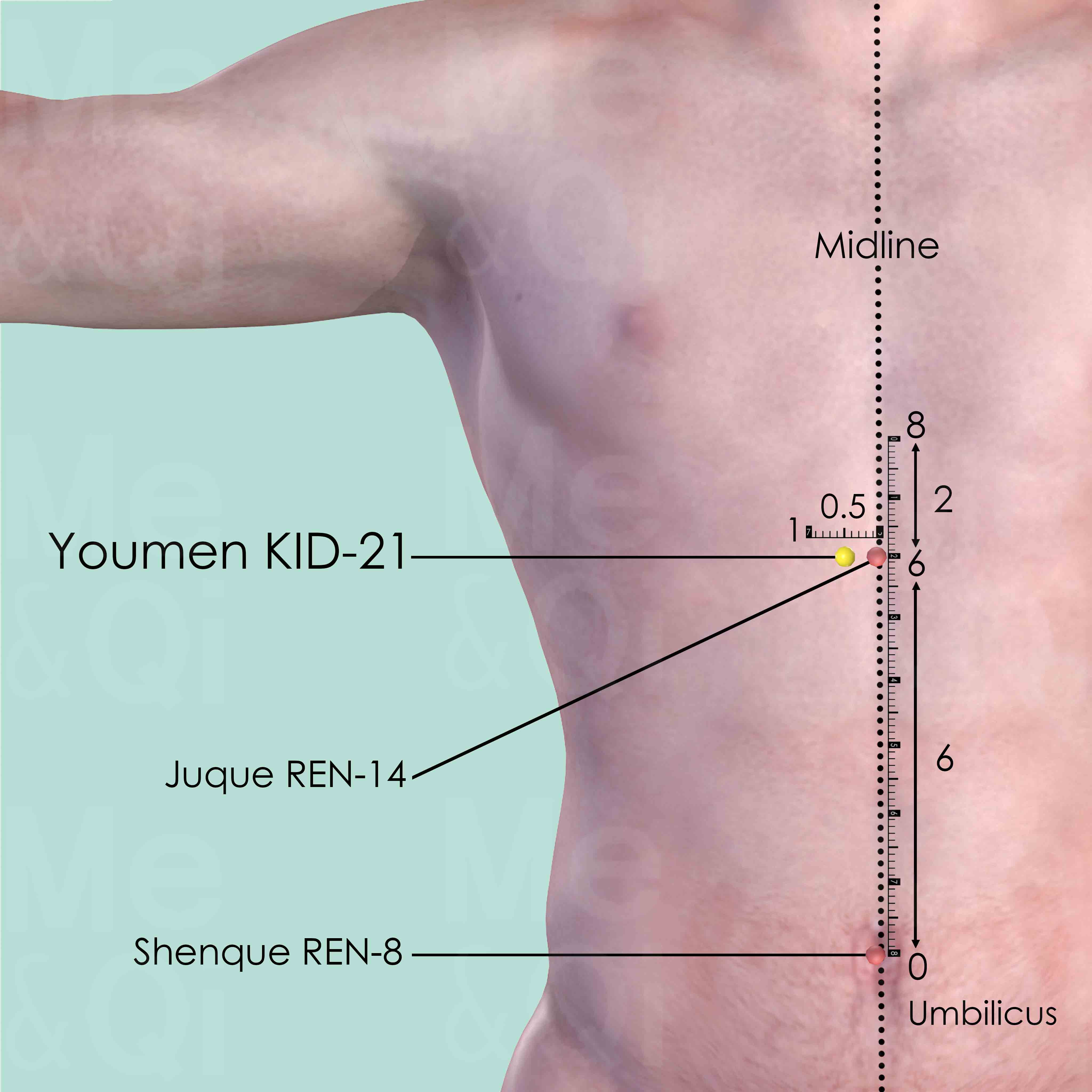
Youmen KID-21
6 cun above the umbilicus and 2 cun below the sternocostal angle, 0.5 cun lateral to the anterior midline.
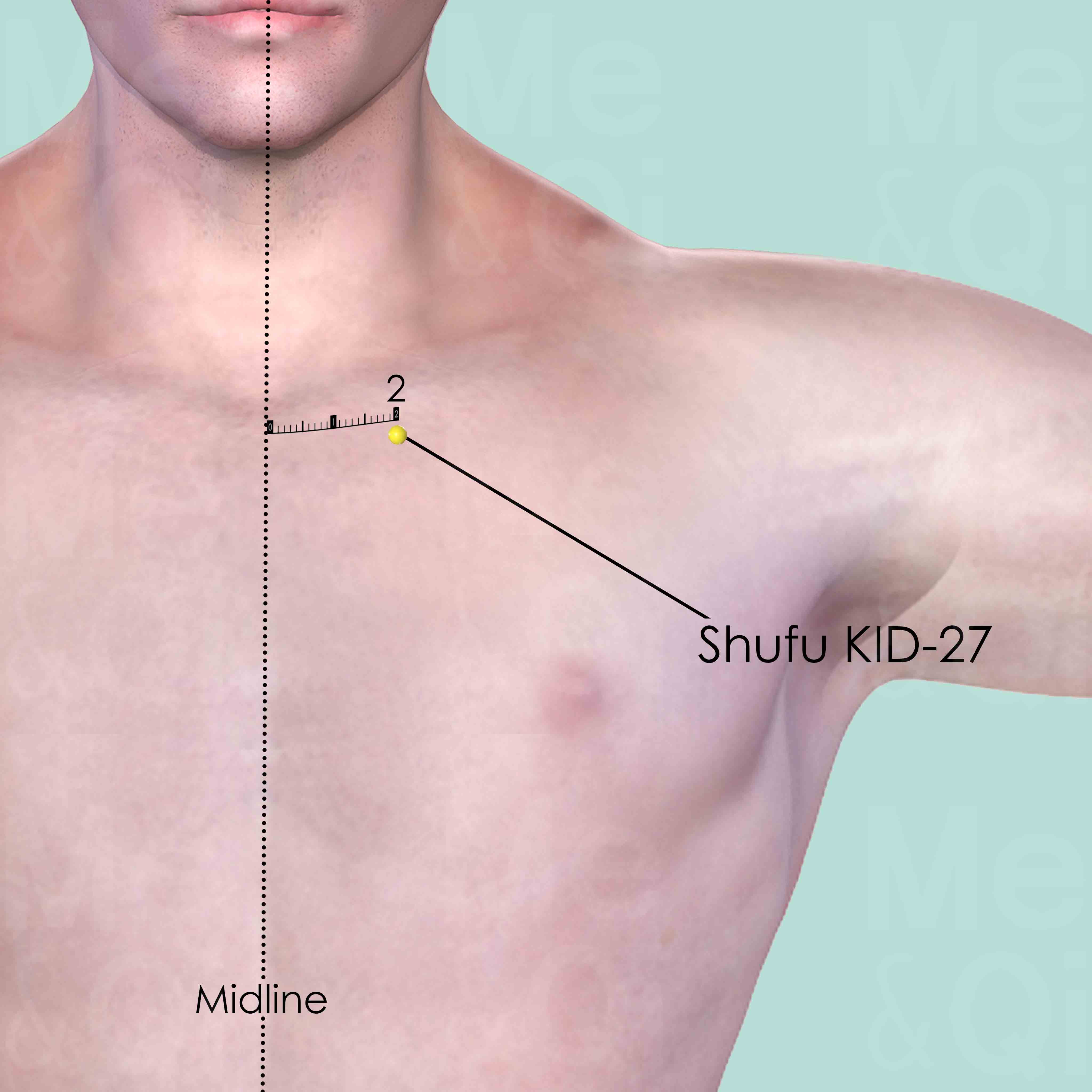
Shufu KID-27
In the depression on the lower border of the clavicle, 2 cun lateral to the anterior midline.
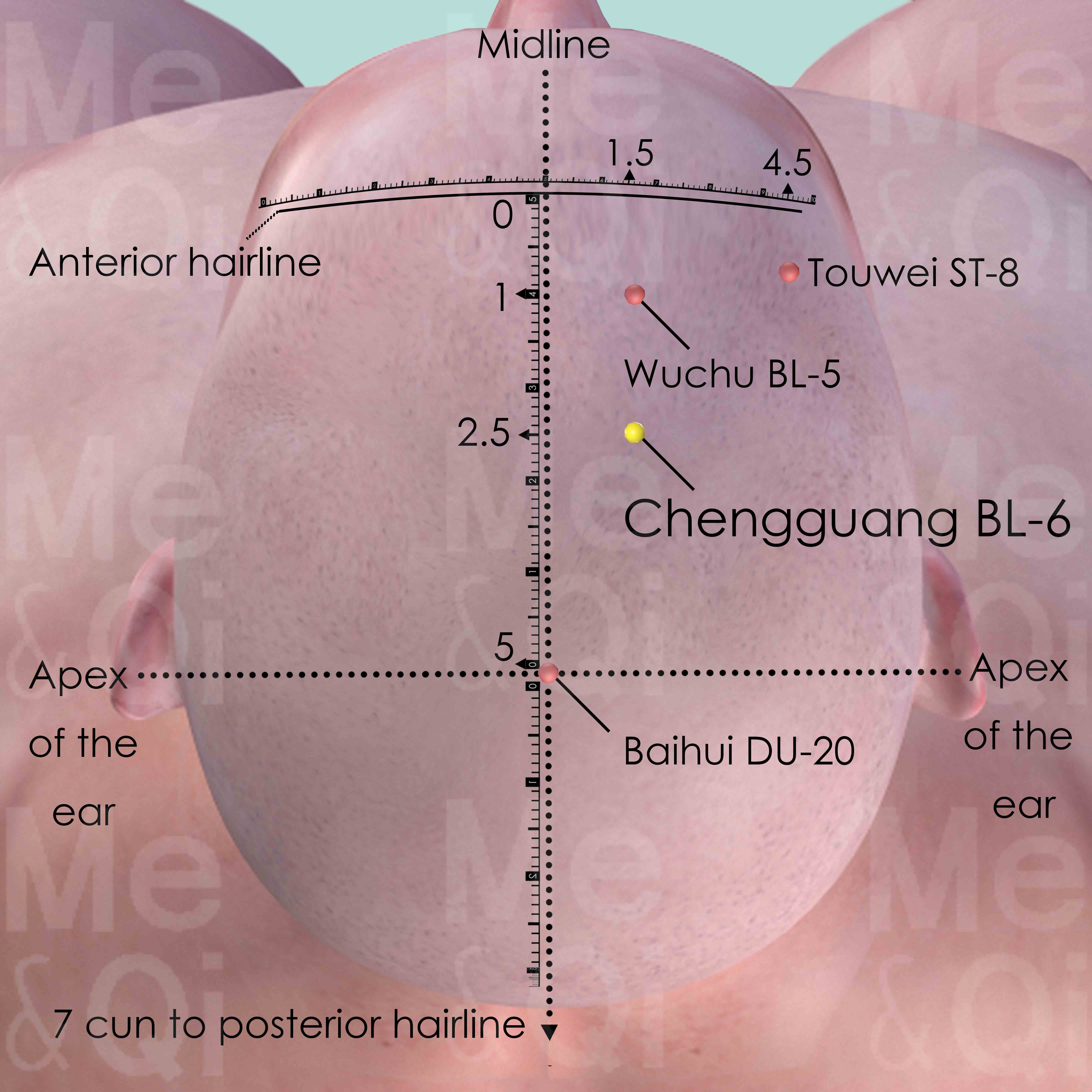
Chengguang BL-6
1.5 cun lateral to the anterior midline and 2.5 cun within the anterior hairline. On the other hand, this point is at the medial third and lateral two-thirds of the distance from anterior midline to the line vertically from Touwei ST-8. Chengguang BL-6 is also 1.5 cun posterior to Wuchu BL-5.
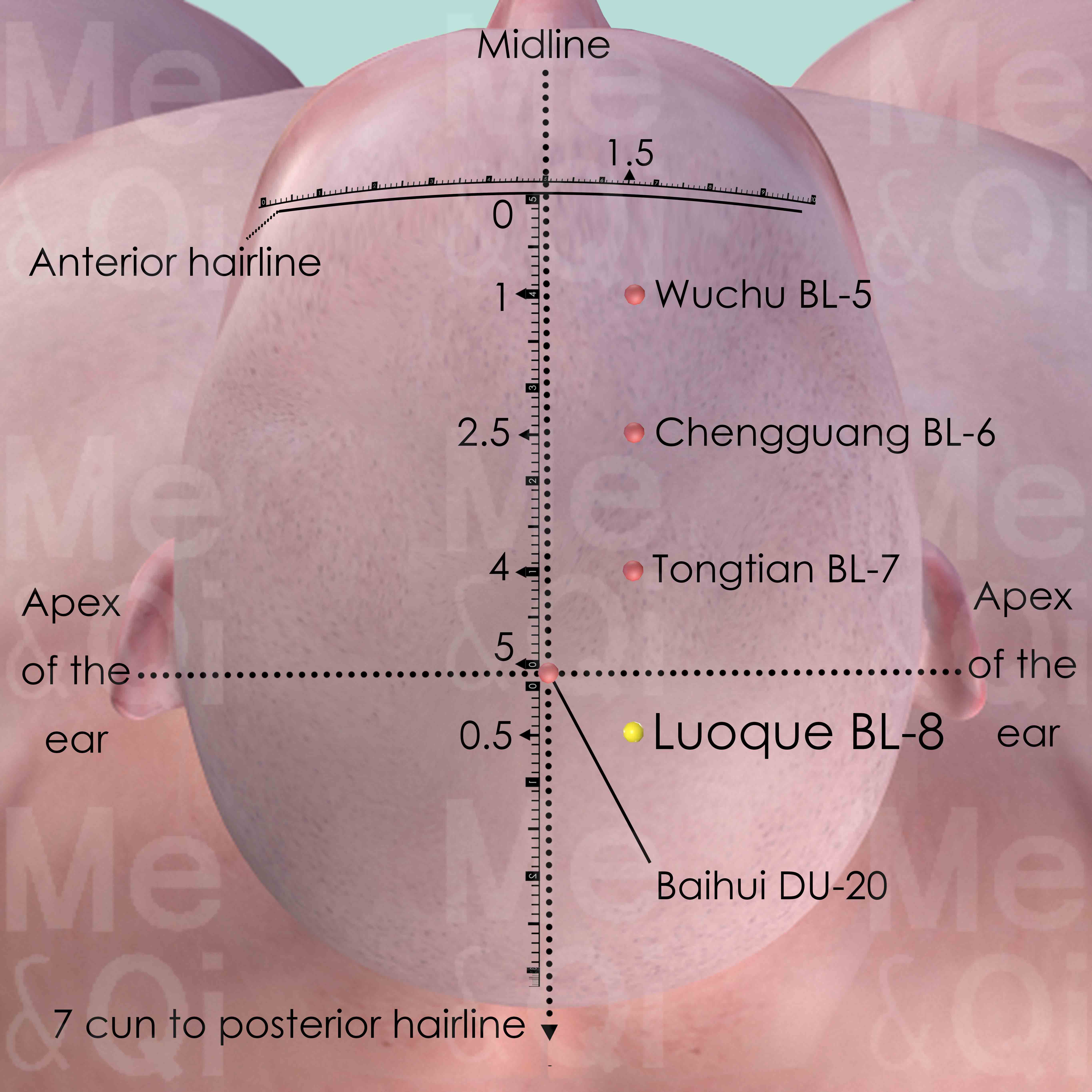
Luoque BL-8
1.5 cun lateral to the anterior midline and 5.5 cun superior to the anterior hairline. Or 0.5 cun posterior to Baihui Du-20 at the vertex.
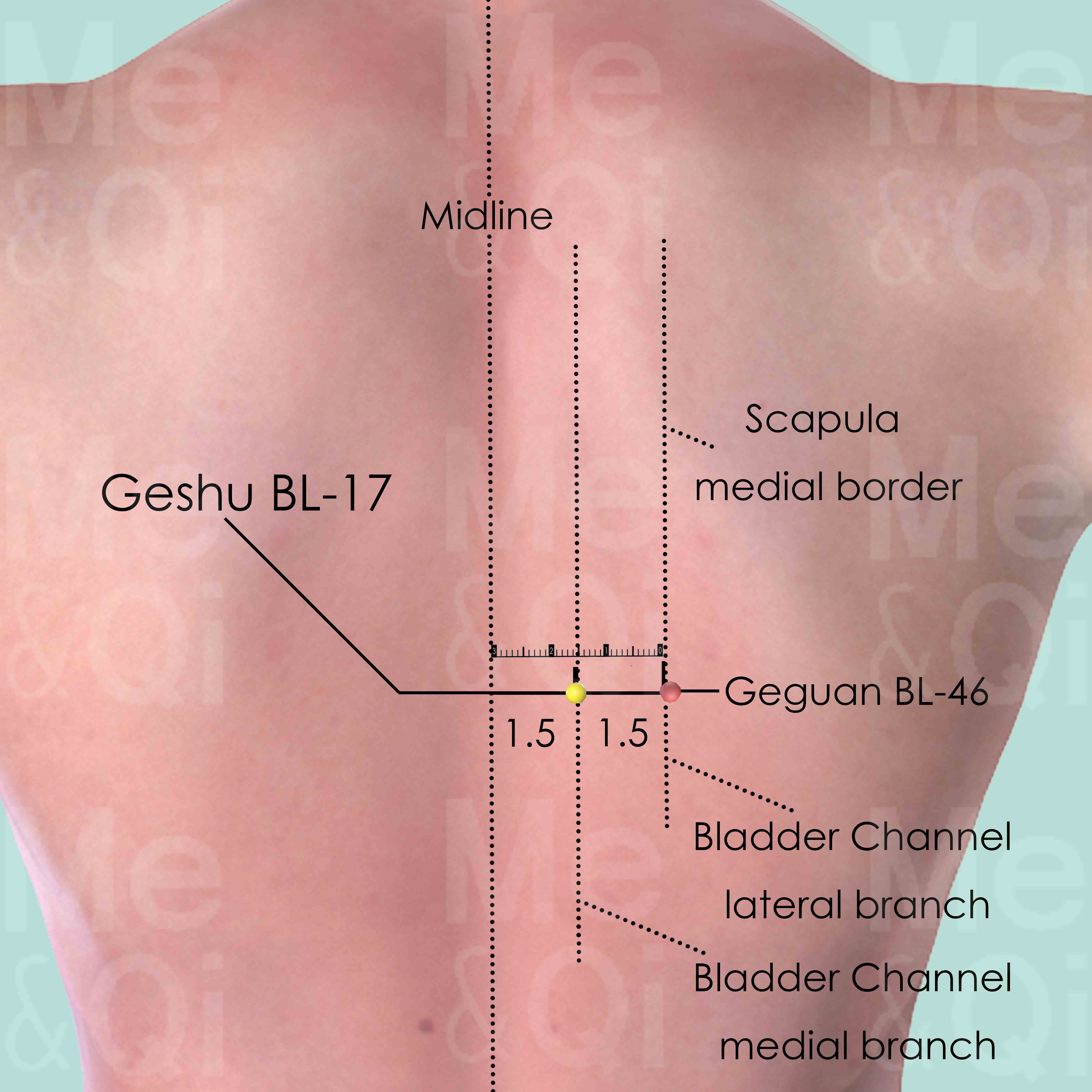
Geshu BL-17
1.5 cun lateral to the lower border of the spinous process of the 7th thoracic vertebra (T7).
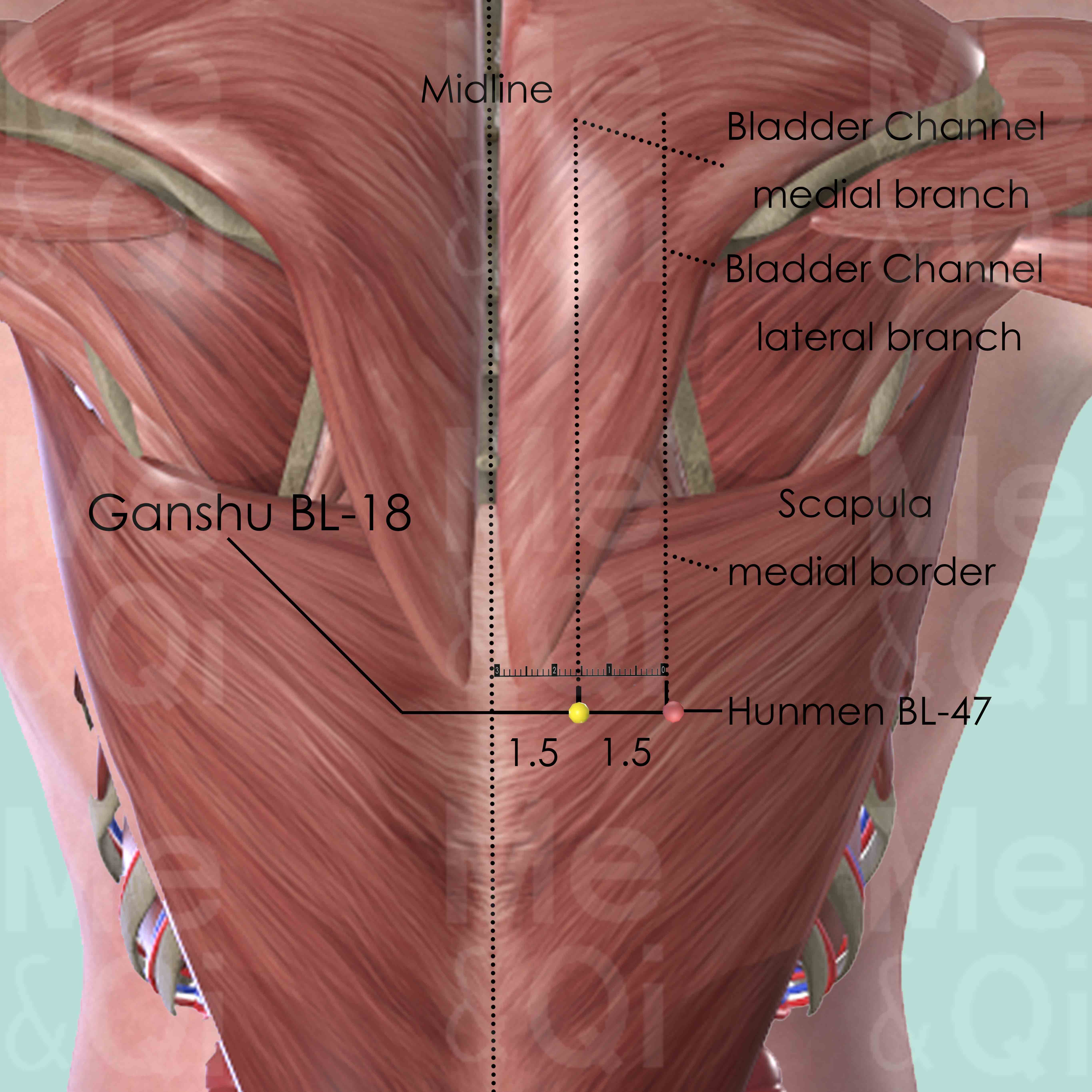
Ganshu BL-18
1.5 cun lateral to the lower border of the spinous process of the 9th thoracic vertebra (T9).
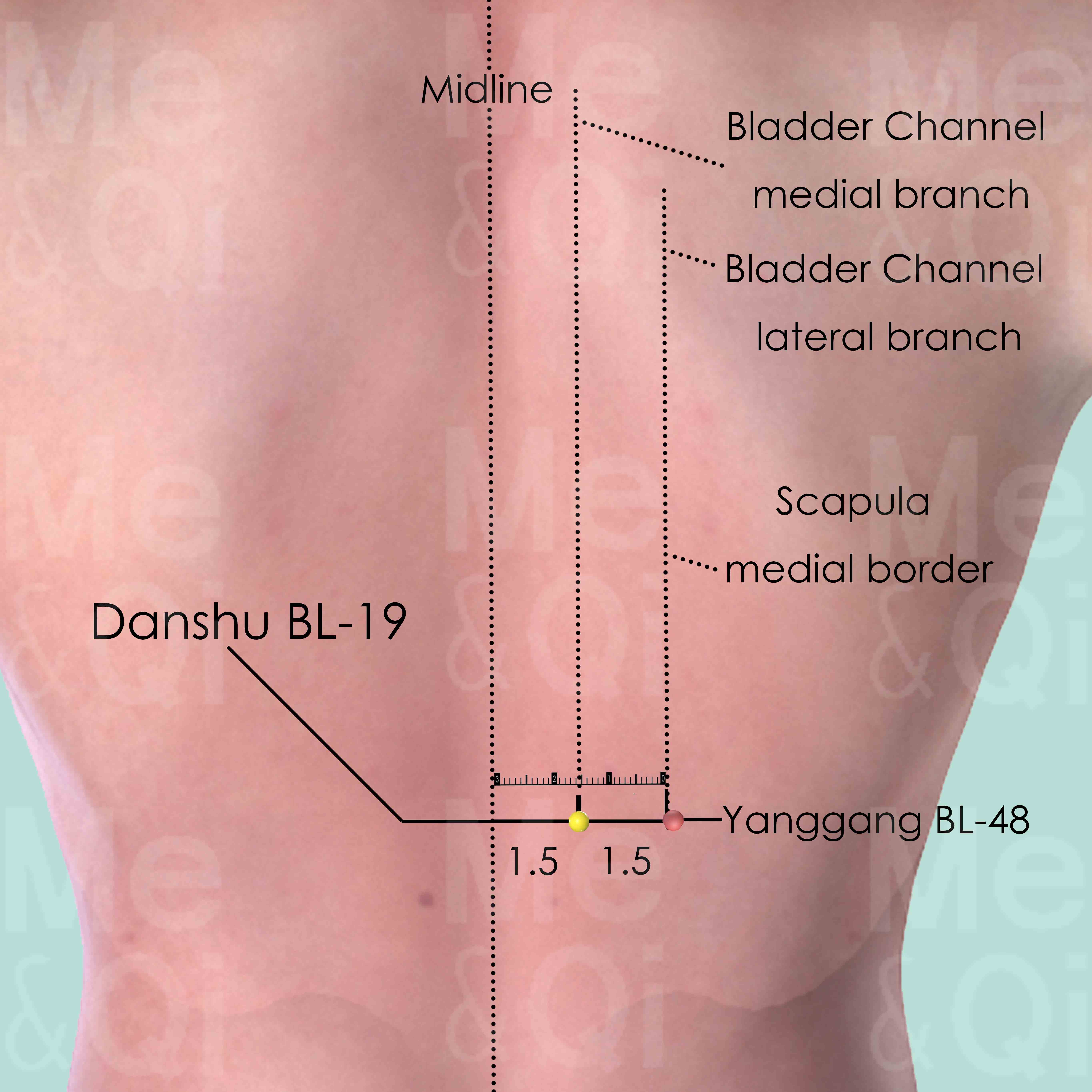
Danshu BL-19
1.5 cun lateral to the lower border of the spinous process of the 10th thoracic vertebra (T10).
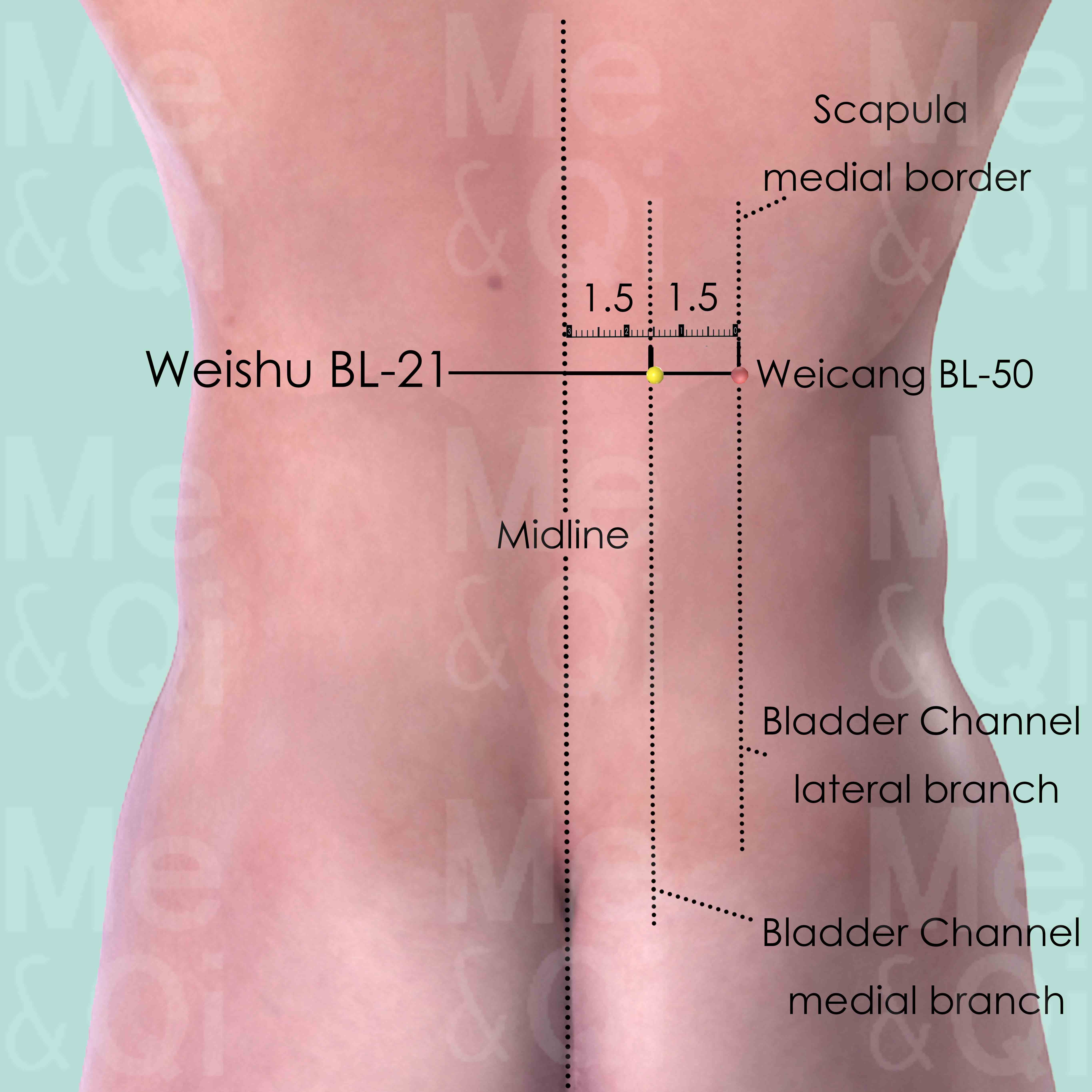
Weishu BL-21
1.5 cun lateral to the lower border of the spinous process of the 12th thoracic vertebra (T12).
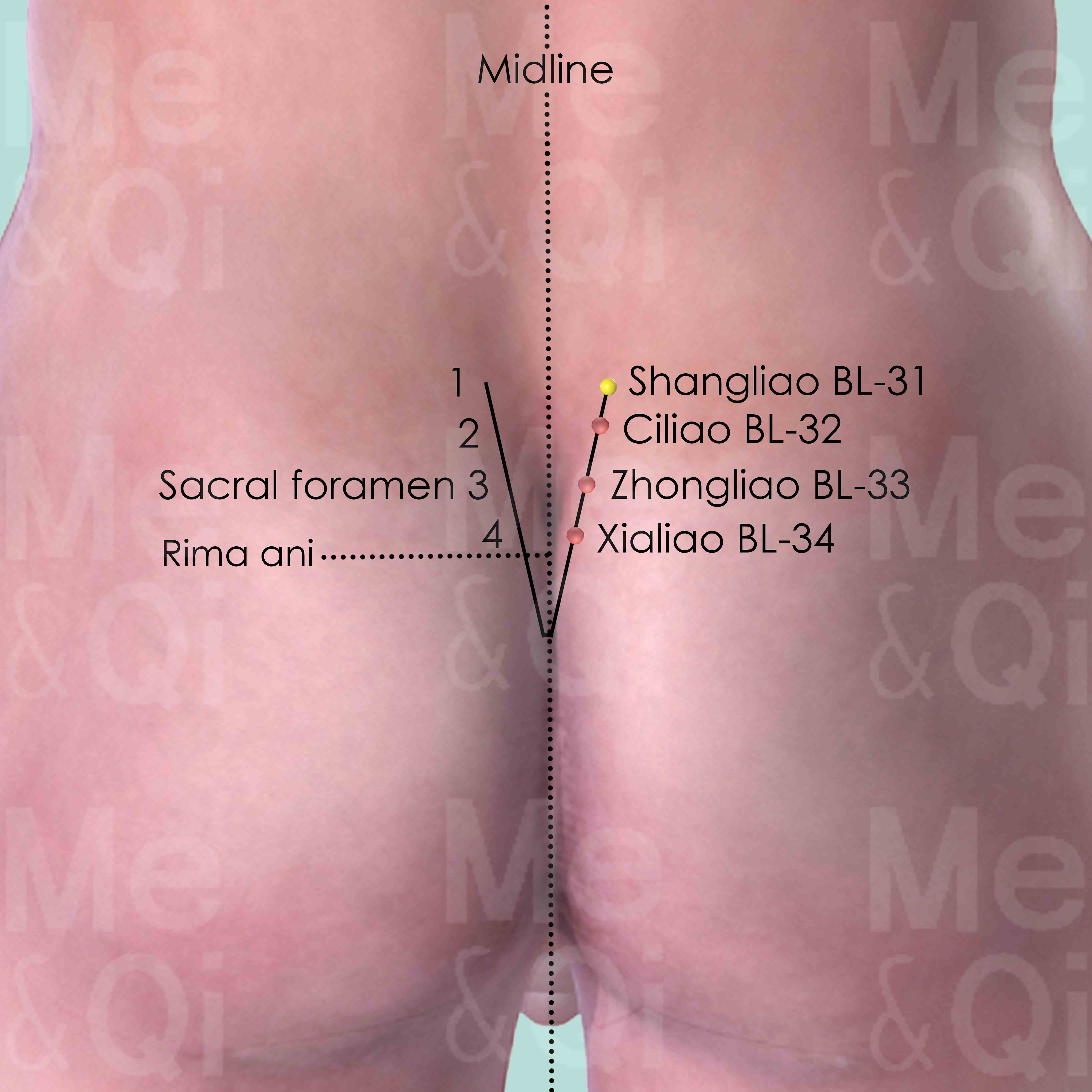
Shangliao BL-31
In the 1st posterior sacral foramen, about midway between the posterior superior iliac spine (PSIS) and the midline.
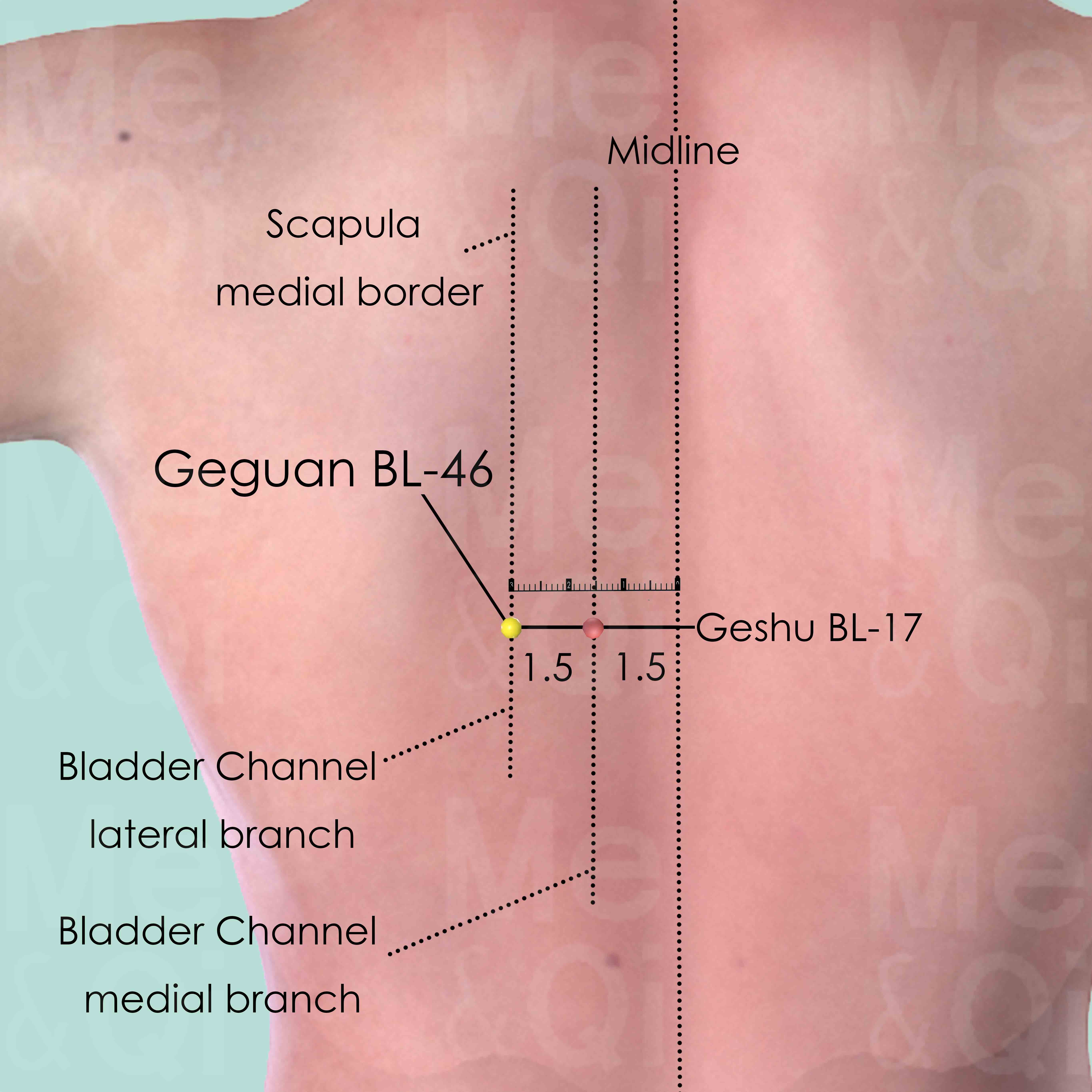
Geguan BL-46
3 cun (about 4 finger-breadths) lateral to the lower border of the spinous process of the 7th thoracic vertebra (T7).
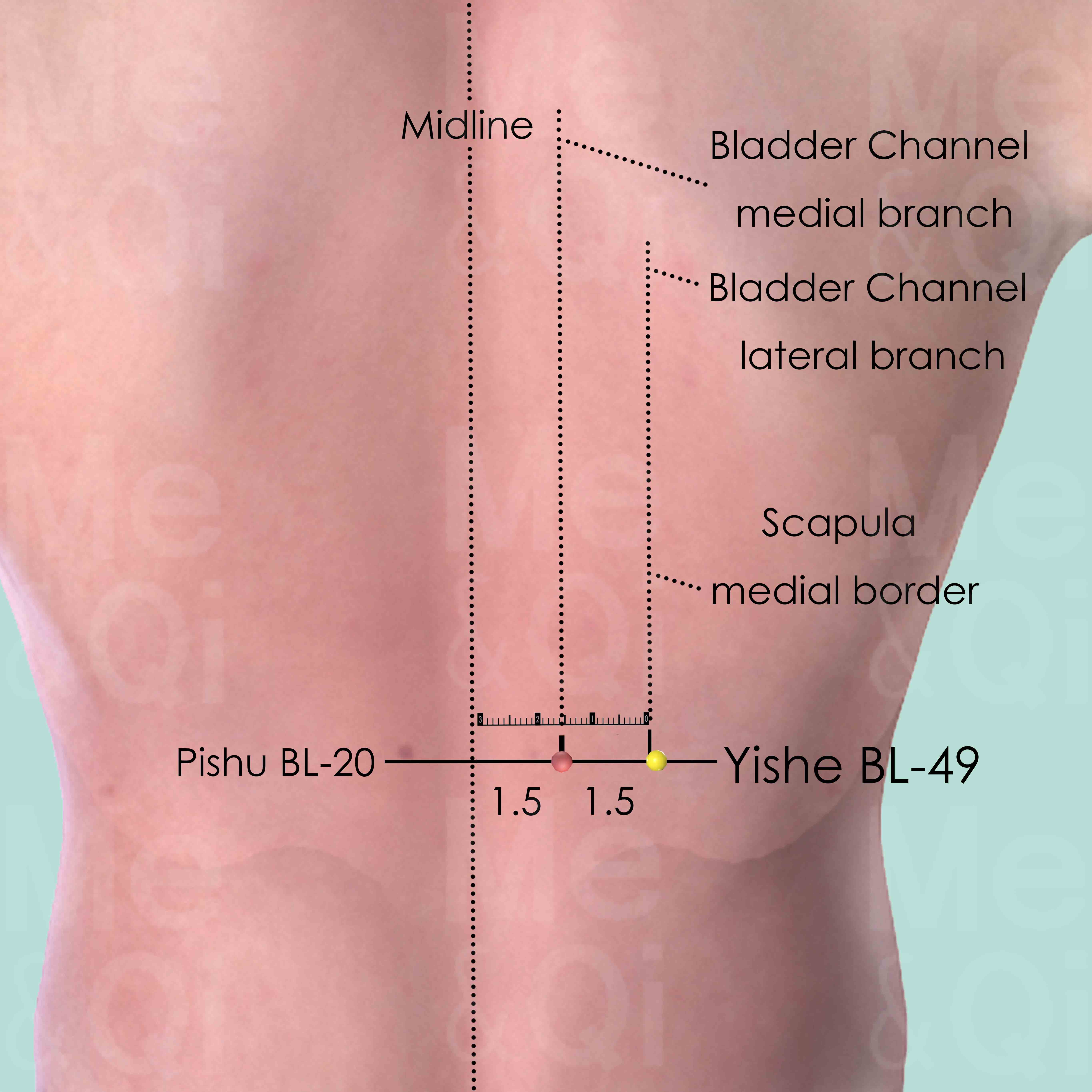
Yishe BL-49
3 cun lateral to the lower border of the spinous process of the 11th thoracic vertebra (T11).
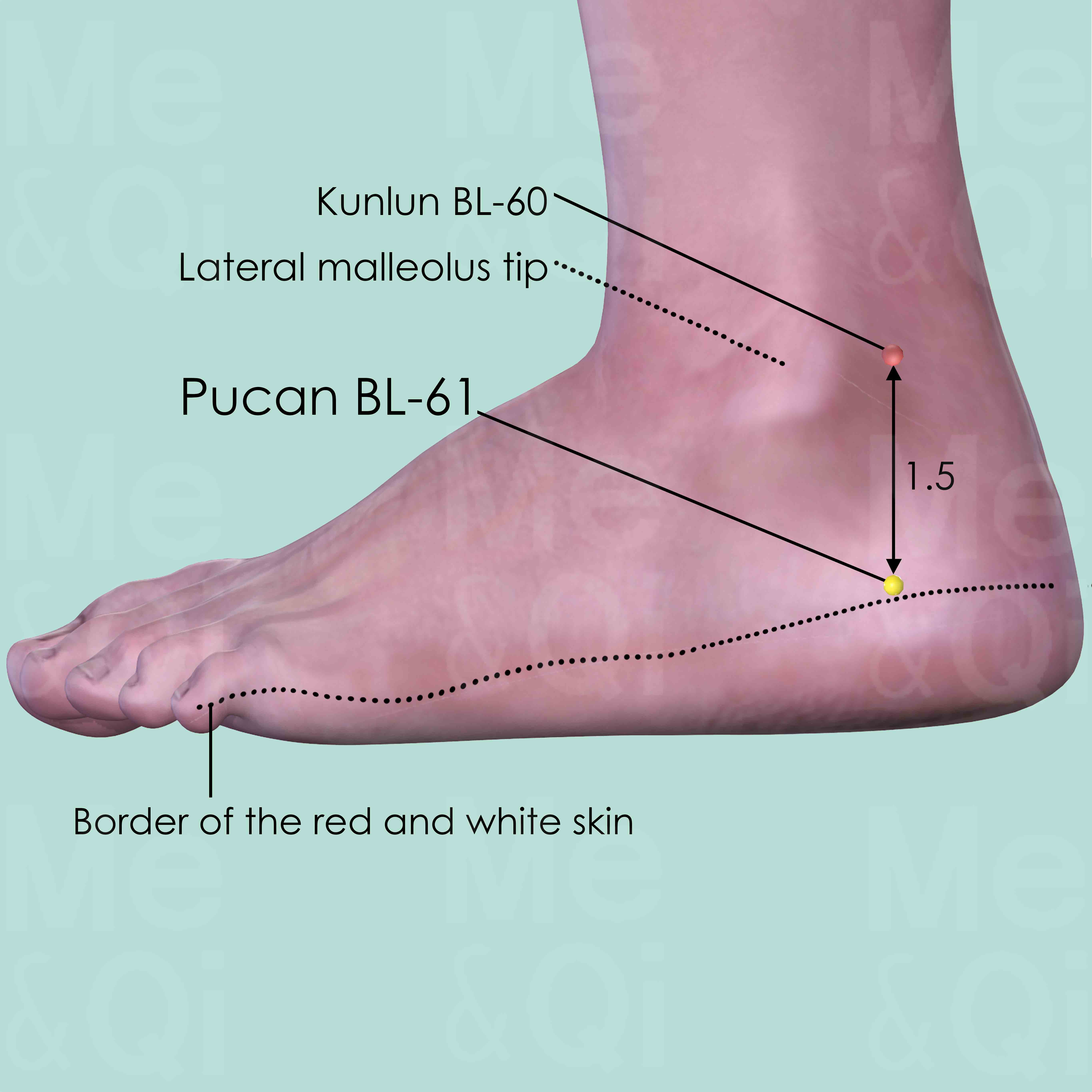
Pucan BL-61
Posterior and inferior to the external malleolus, directly below Kunlun BL-60, in the depression of the calcaneum at the junction of the red and white skin.
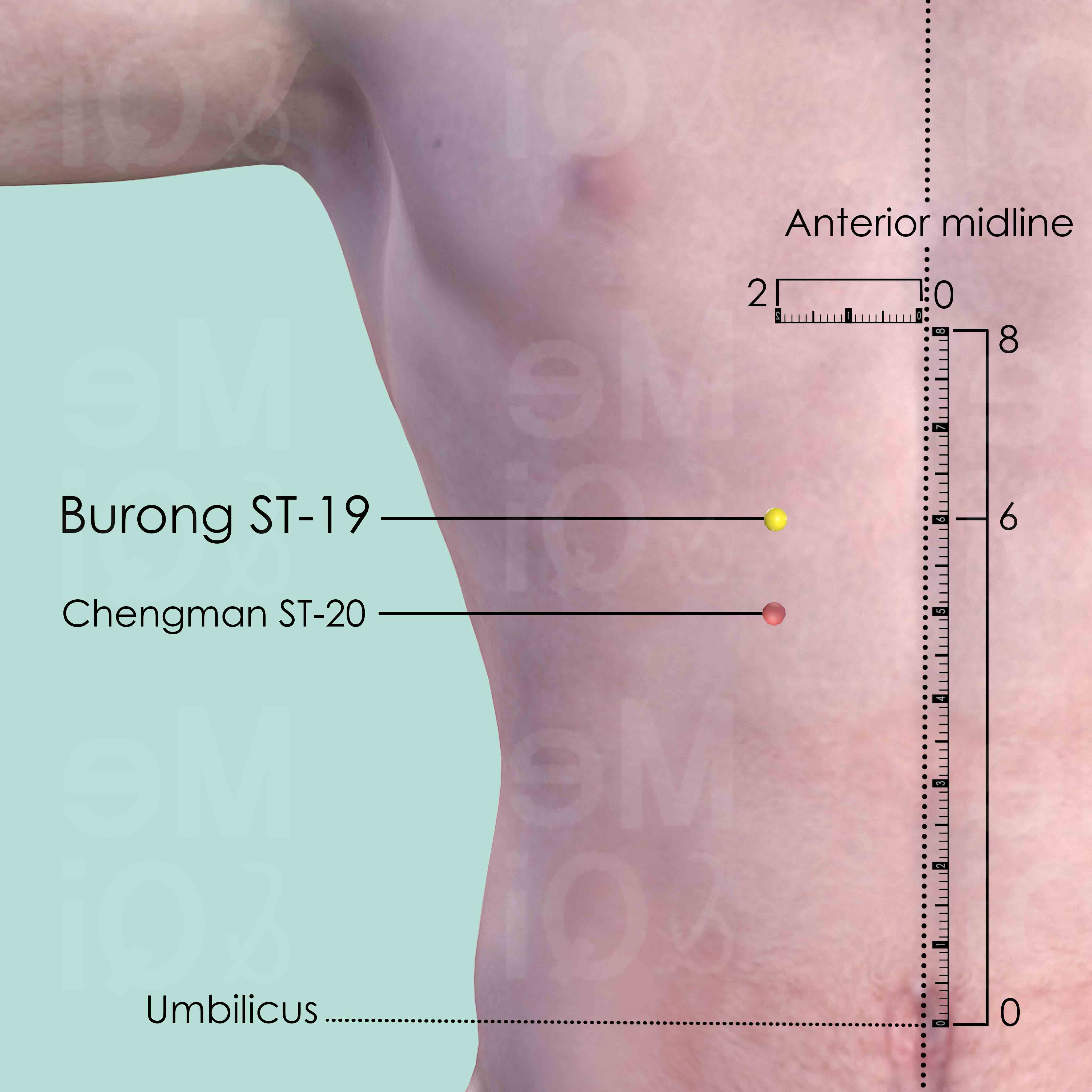
Burong ST-19
2 cun below the sternocostal angel and 6 cun above the umbilicus, 2 cun lateral to the anterior midline.
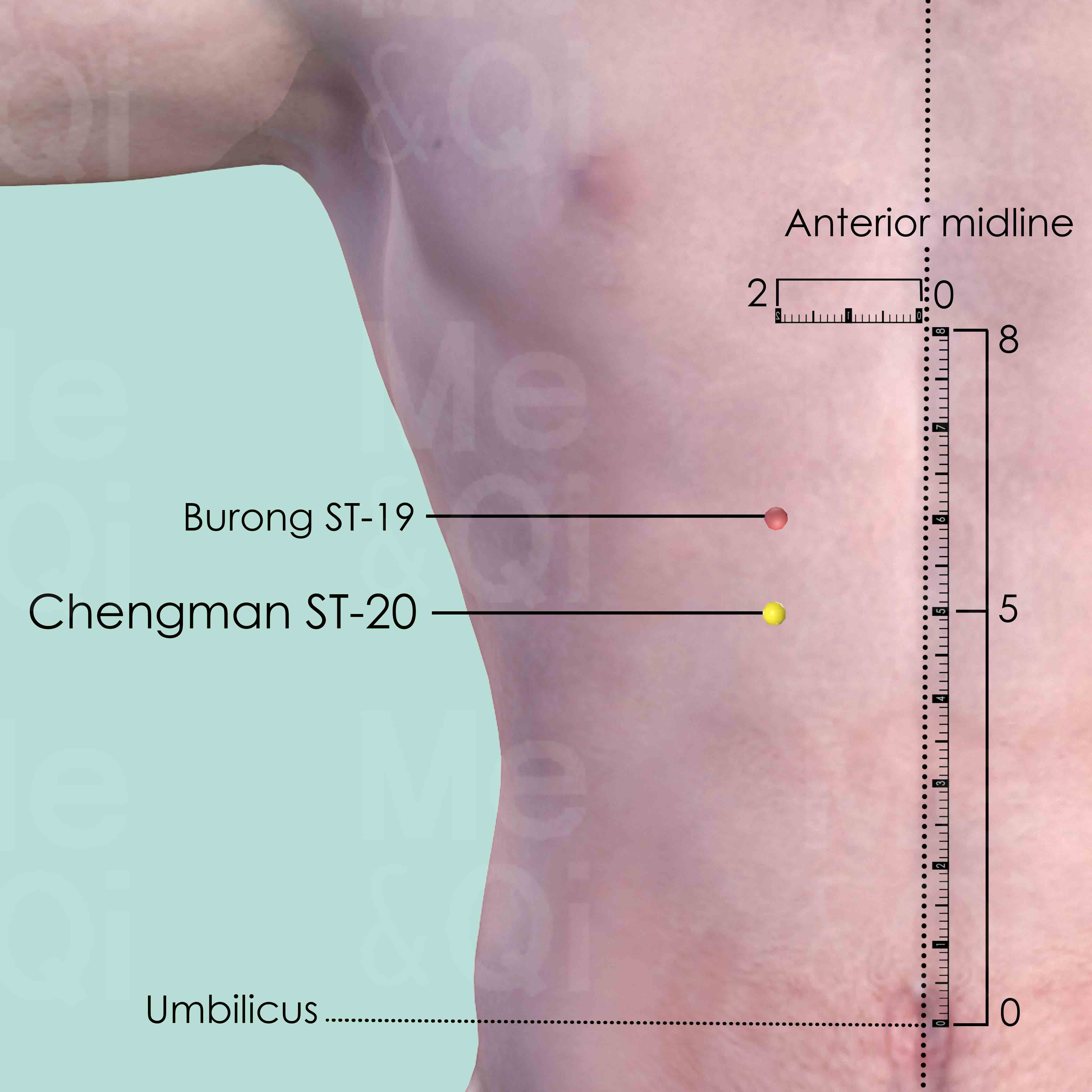
Chengman ST-20
5 cun above the umbilicus and 2 cun lateral to the anterior midline, or 1 cun below Burong ST-19.
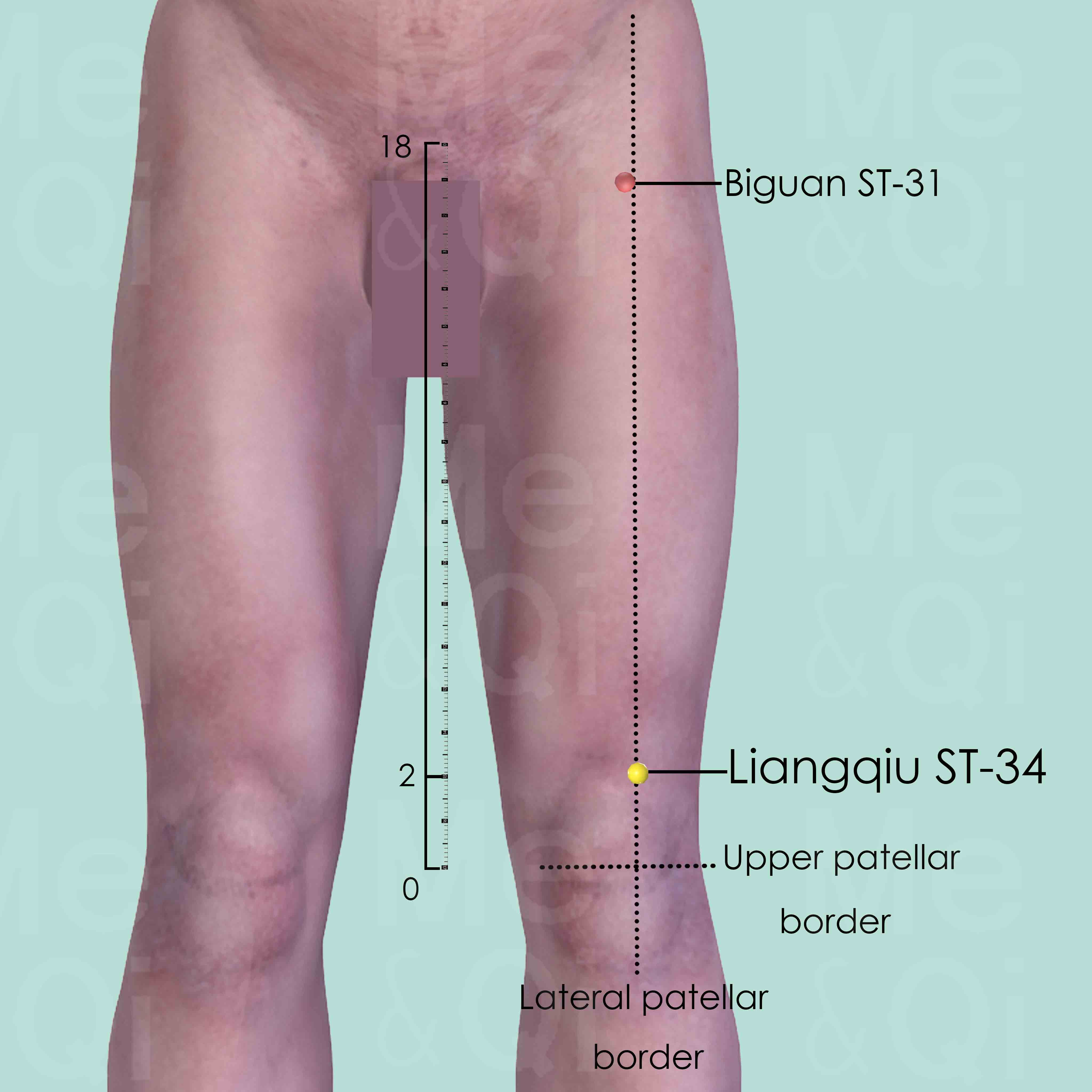
Liangqiu ST-34
2 cun above the upper-lateral border of the patella, on a line between the upper lateral patellar border and the anterior superior iliac spine (ASIS).
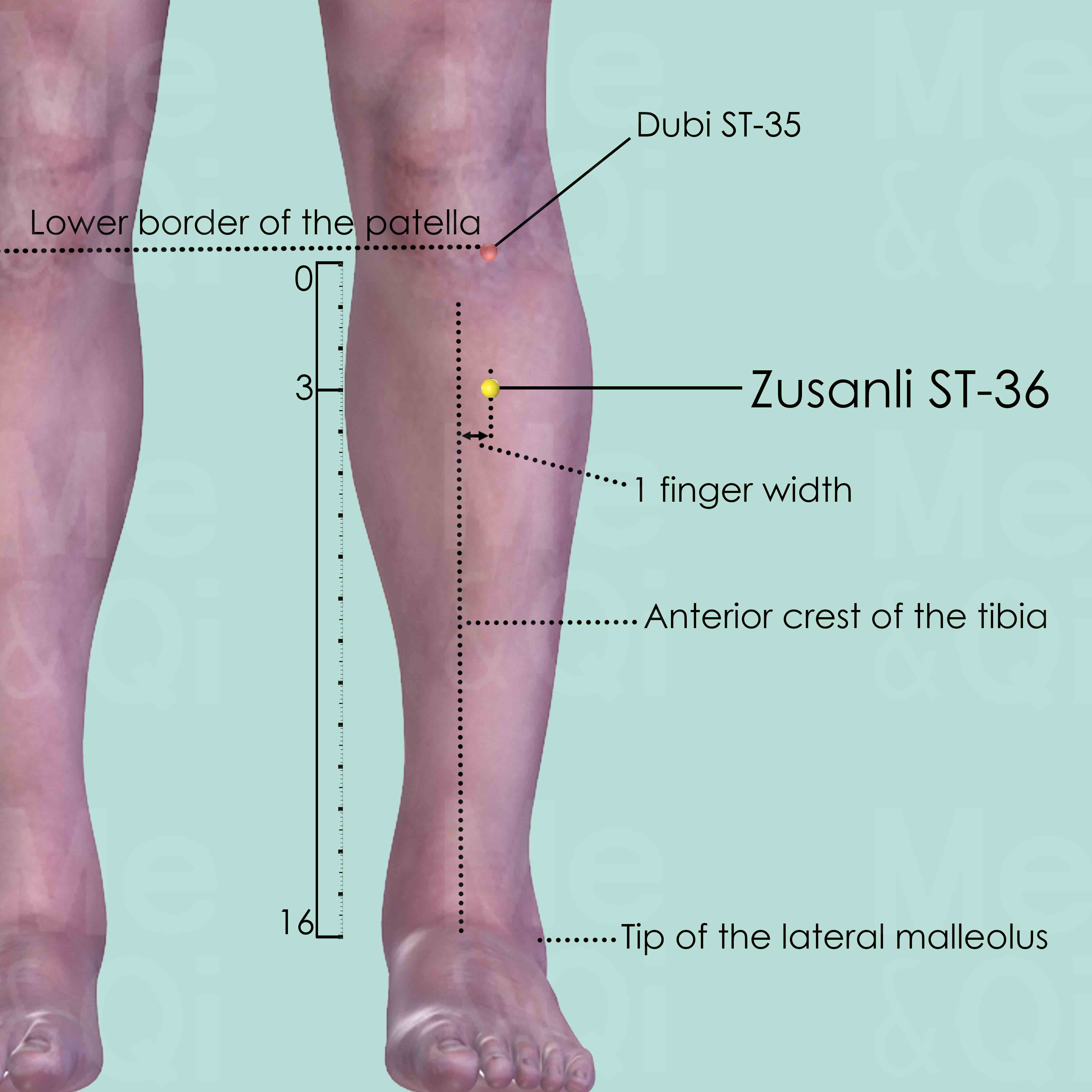
Zusanli ST-36
3 cun below Dubi ST-35, one finger breadth lateral to the anterior crest of the tibia, on the tibialis anterior muscle.
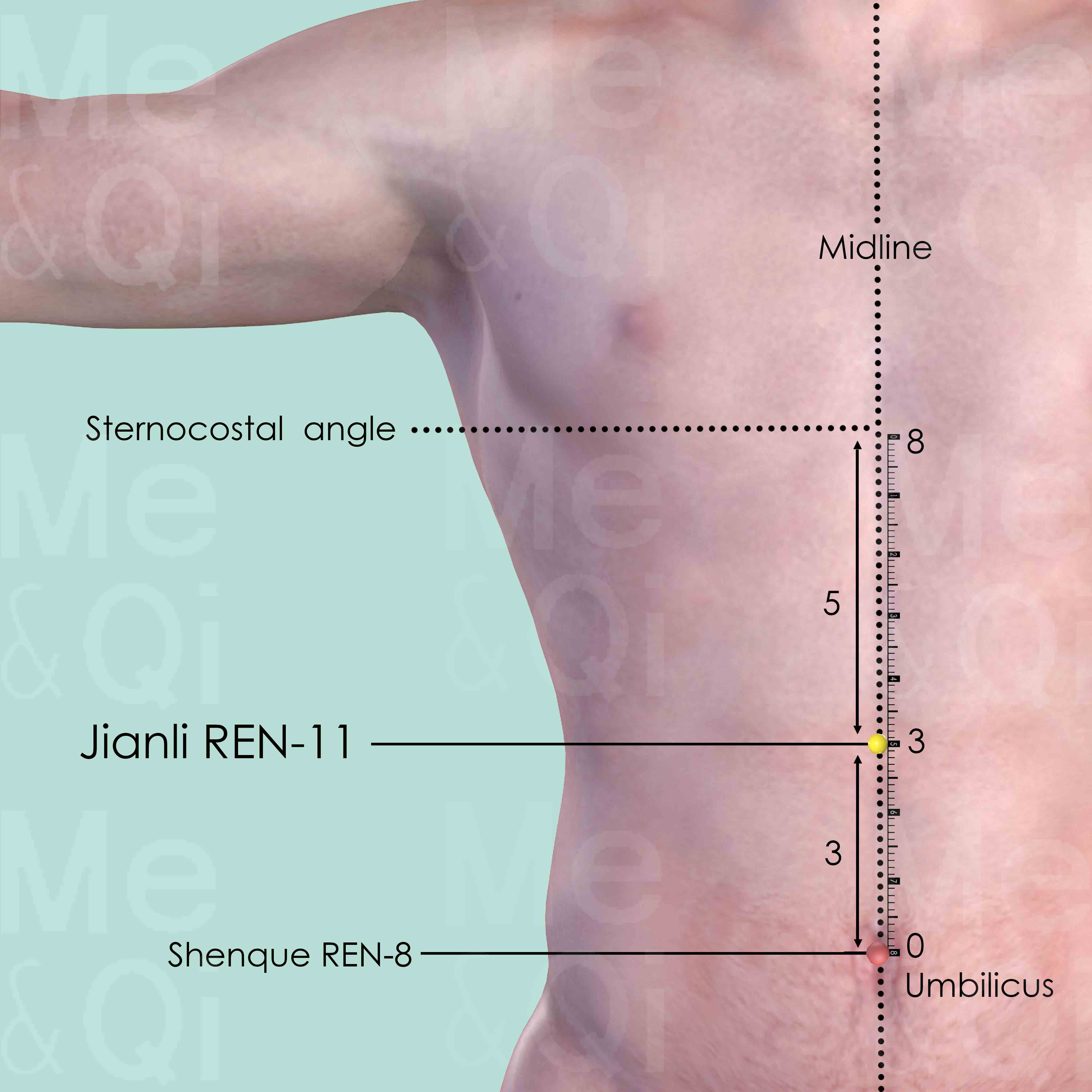
Jianli REN-11
On the midline of the abdomen, 3 cun above the umbilicus and 5 cun below the sternocostal angle.
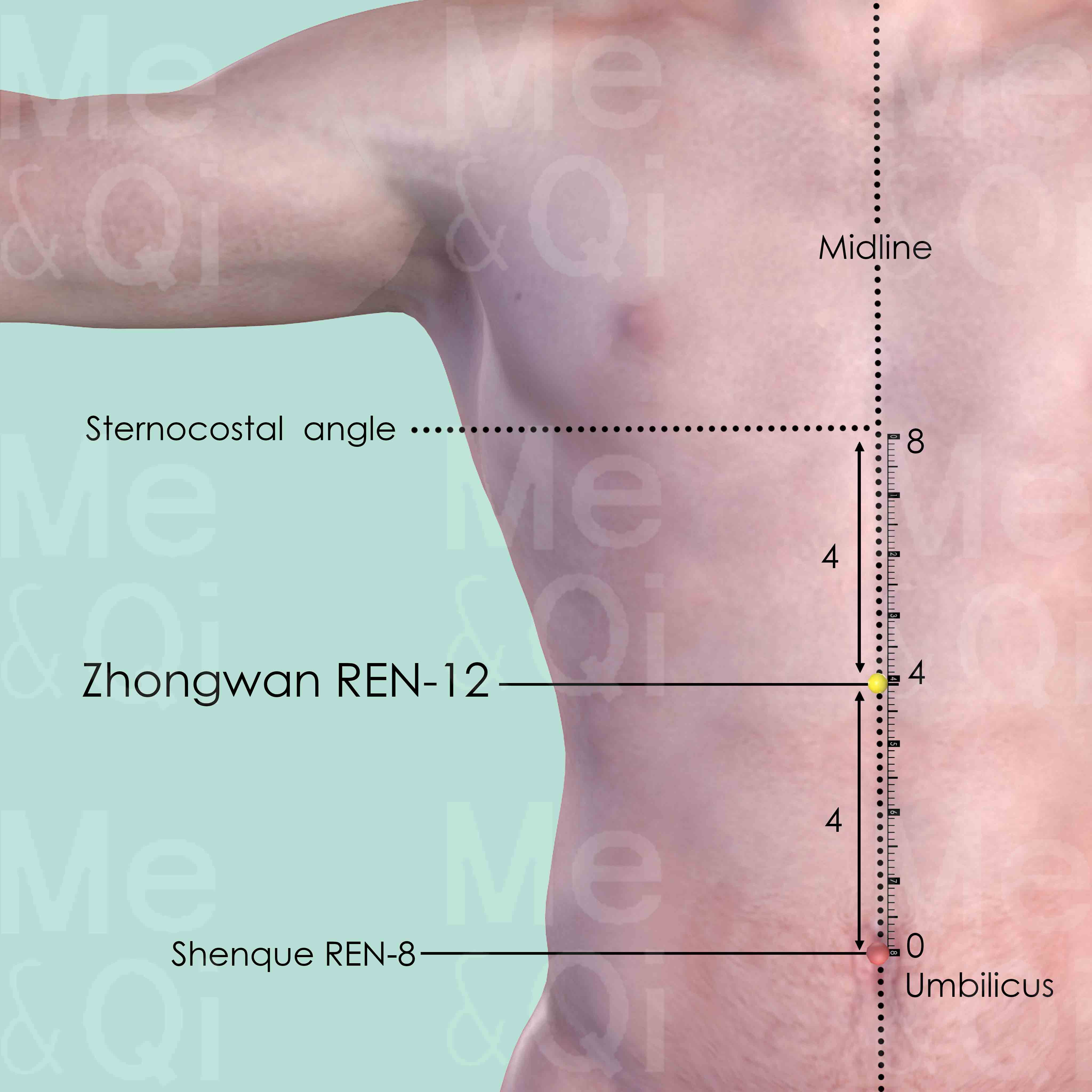
Zhongwan REN-12
On the midline of the abdomen, 4 cun above the umbilicus and 4 cun below the sternocostal angle.
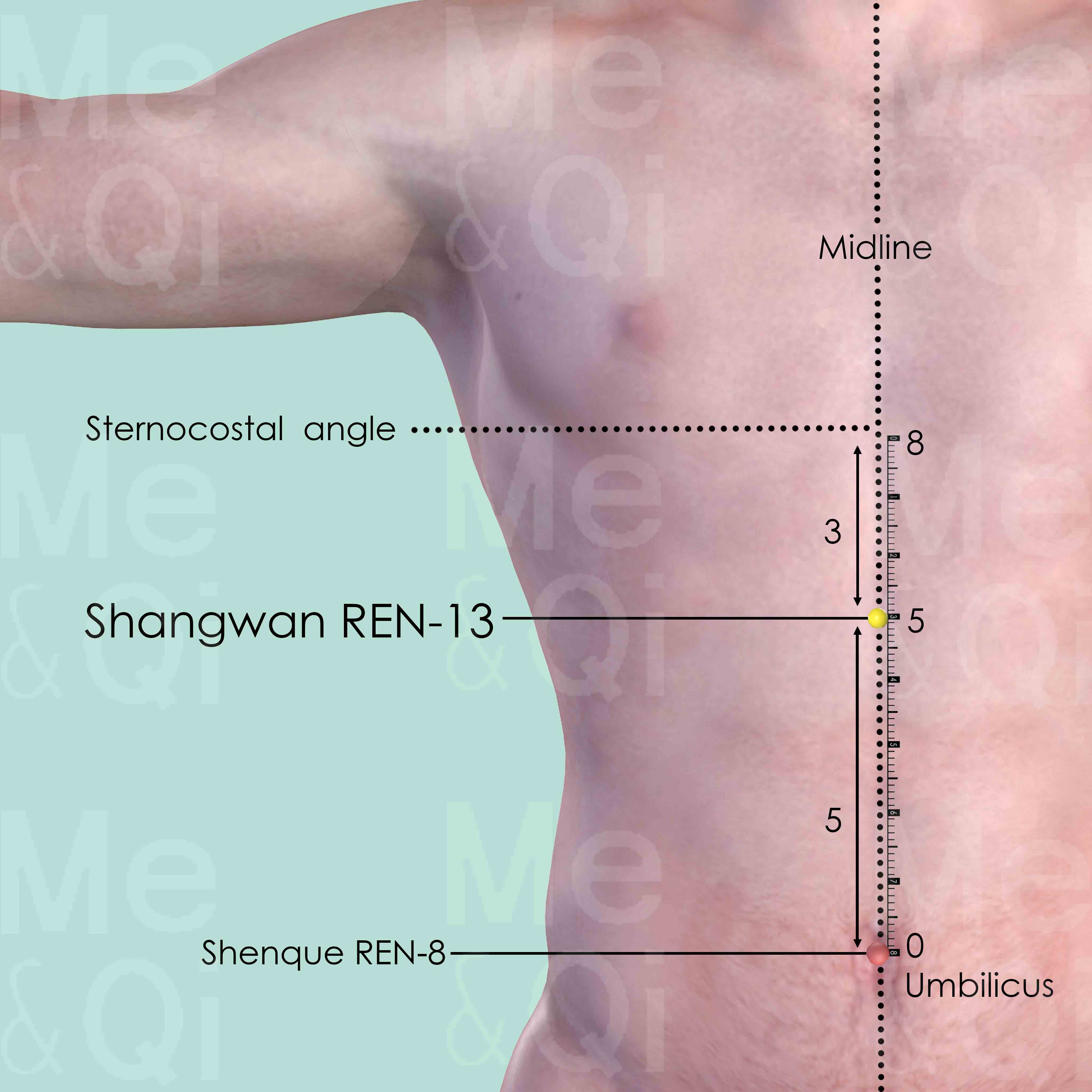
Shangwan REN-13
On the midline of the abdomen, 5 cun above the umbilicus and 3 cun below the sternocostal angle.
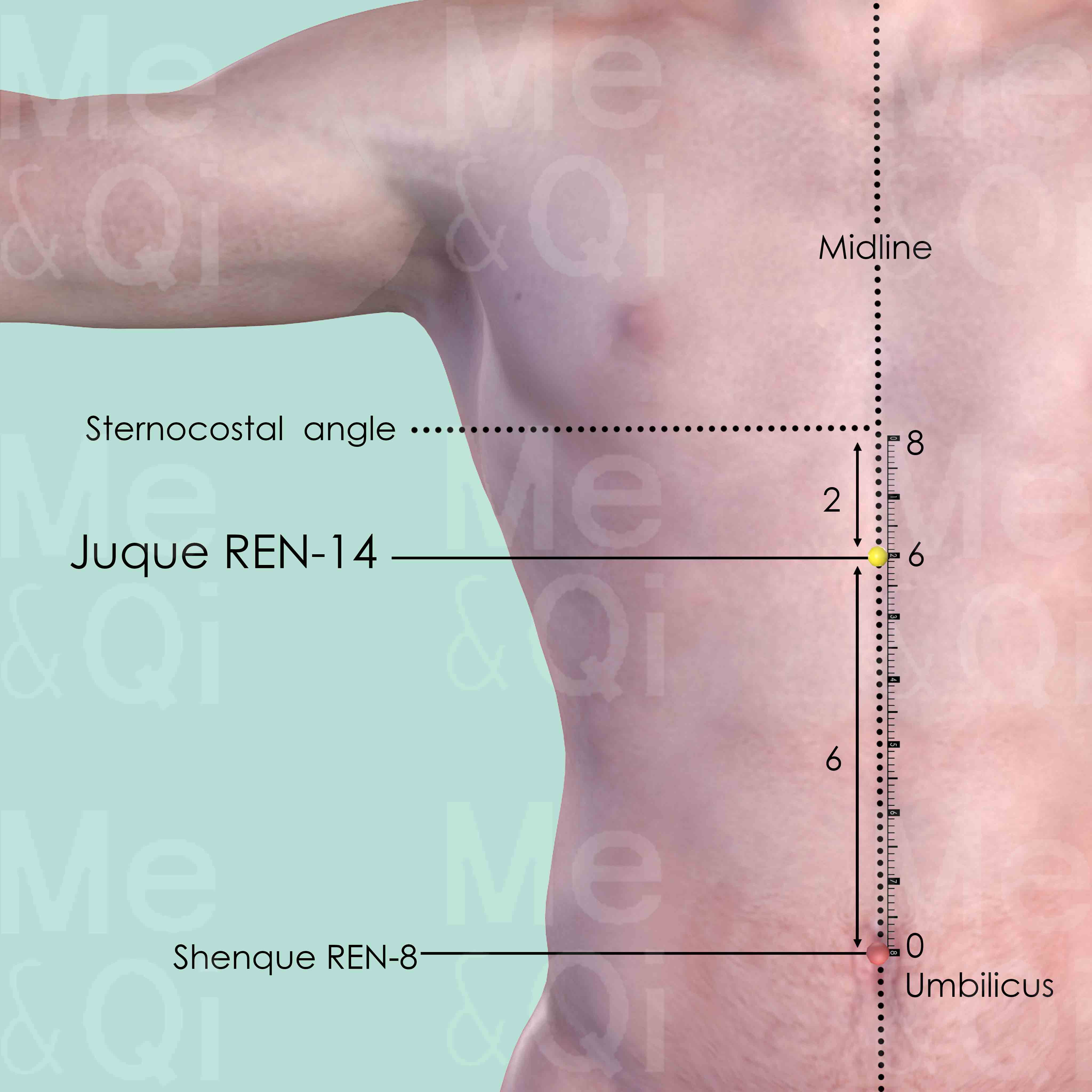
Juque REN-14
On the midline of the abdomen, 6 cun above the umbilicus and 2 cun below the sternocostal angle.
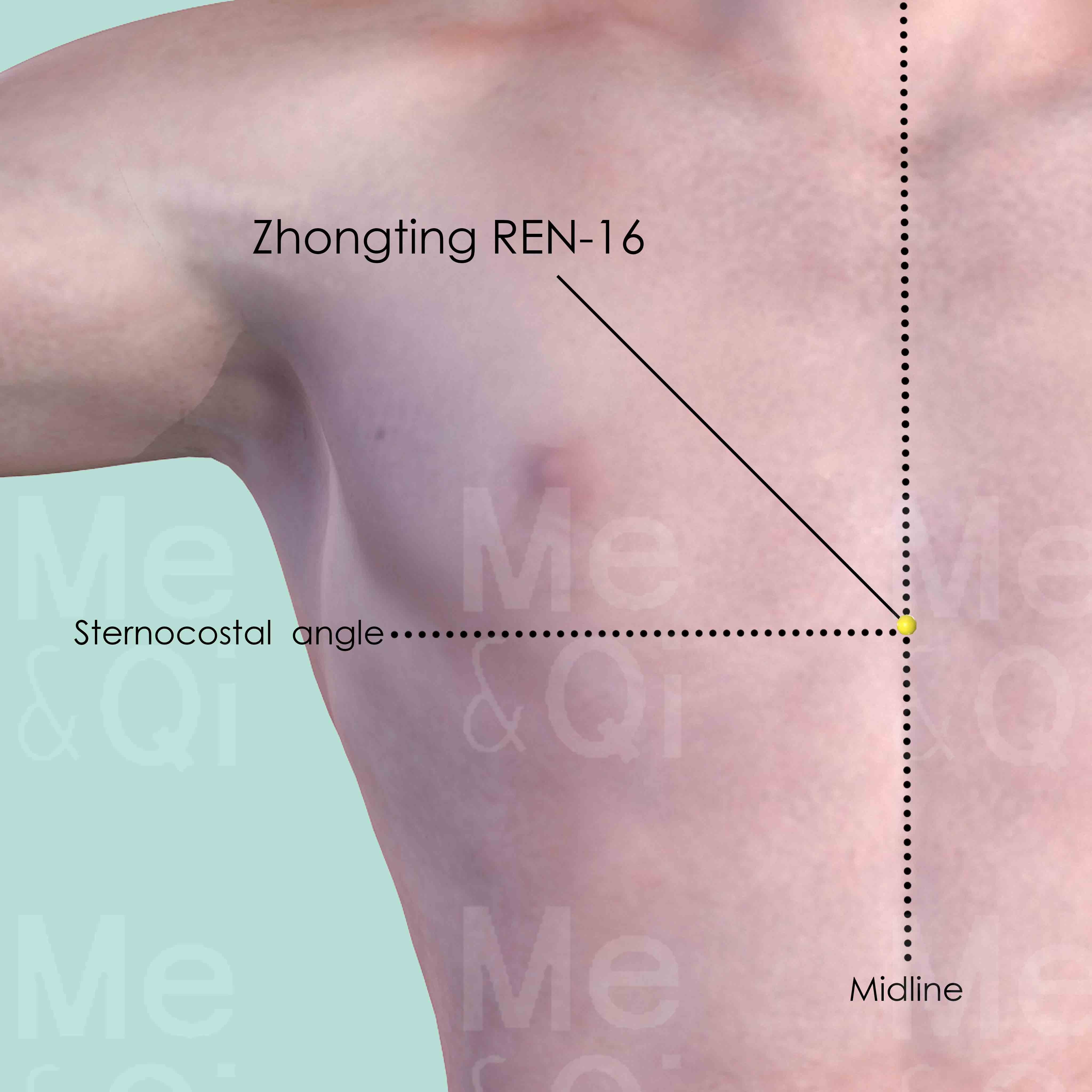
Zhongting REN-16
On the midline of the chest, on the level of the 5th intercostal space. On the sternocostal angle, where the two lower borders of the ribcage meet.
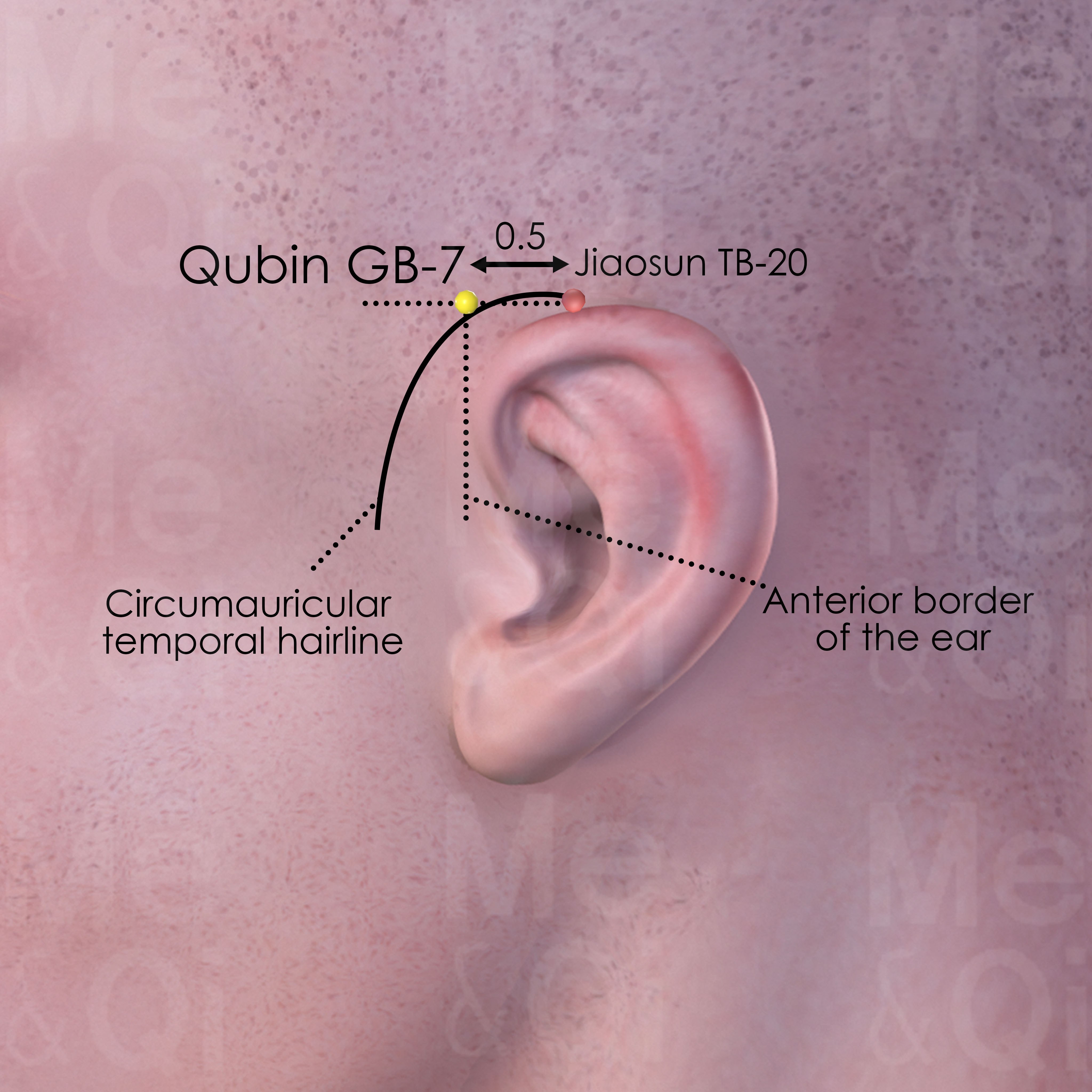
Qubin GB-7
Within the hairline anterior and superior to the auricle, about 1 finger-breadth (0.5 cun) anterior to Jiaosun TB-20 which is on the apex of the ear.
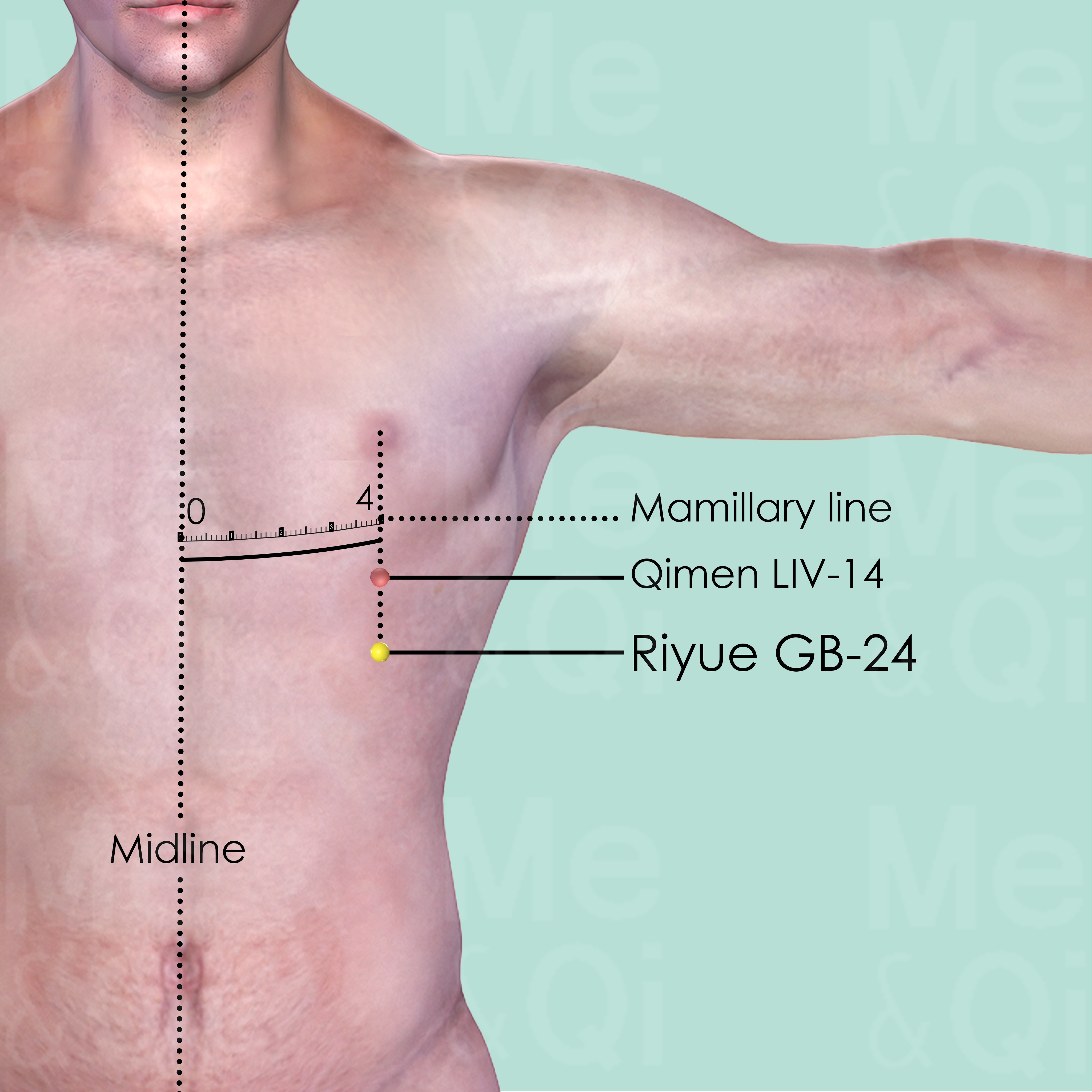
Riyue GB-24
On the mamillary line which is 4 cun lateral to the anterior midline, in the 7th intercostal space, 1 intercostal space below Qimen LIV-14.
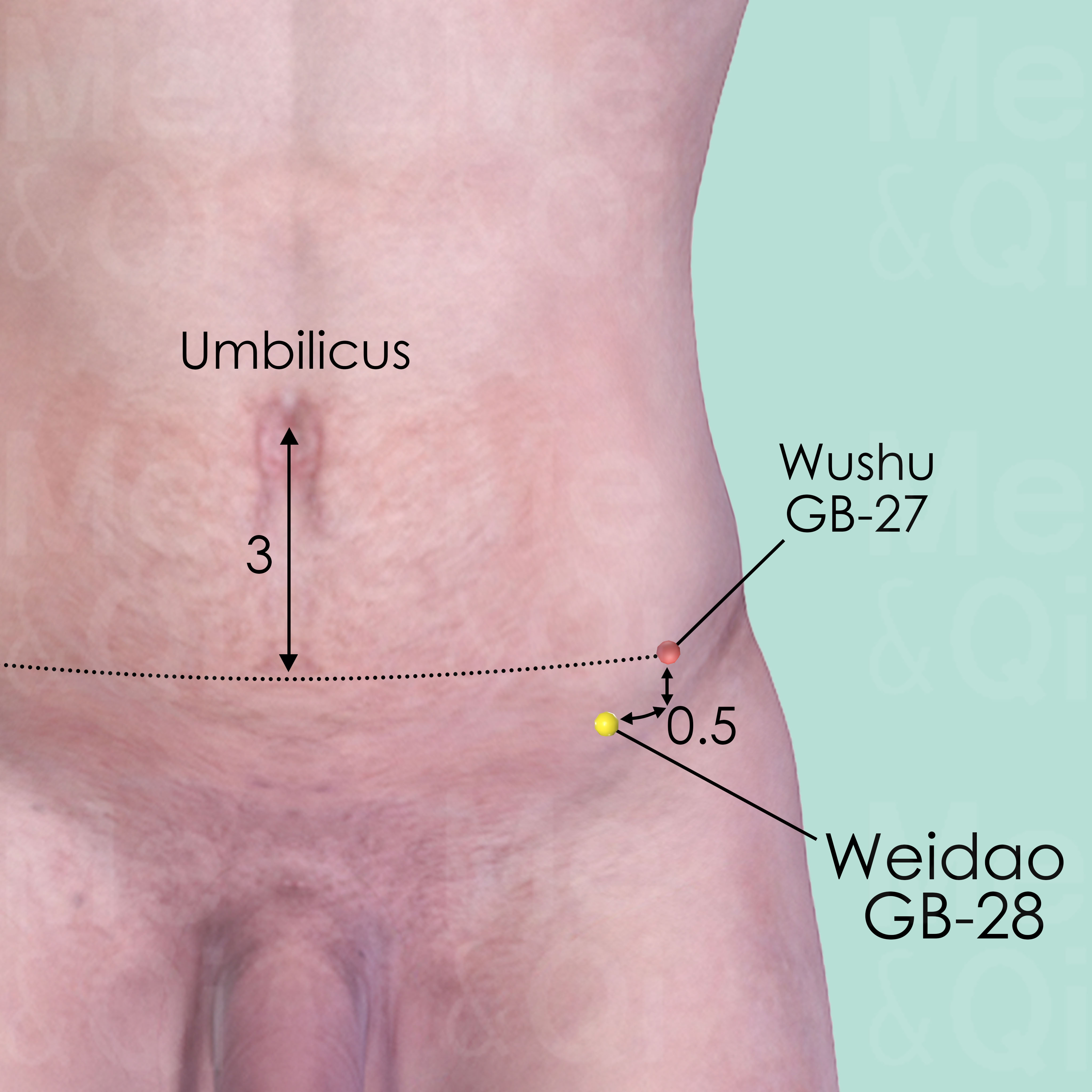
Weidao GB-28
Anterior and Inferior to the anterior superior iliac spine (ASIS), 0.5 cun anterior and inferior to Wushu GB-27.
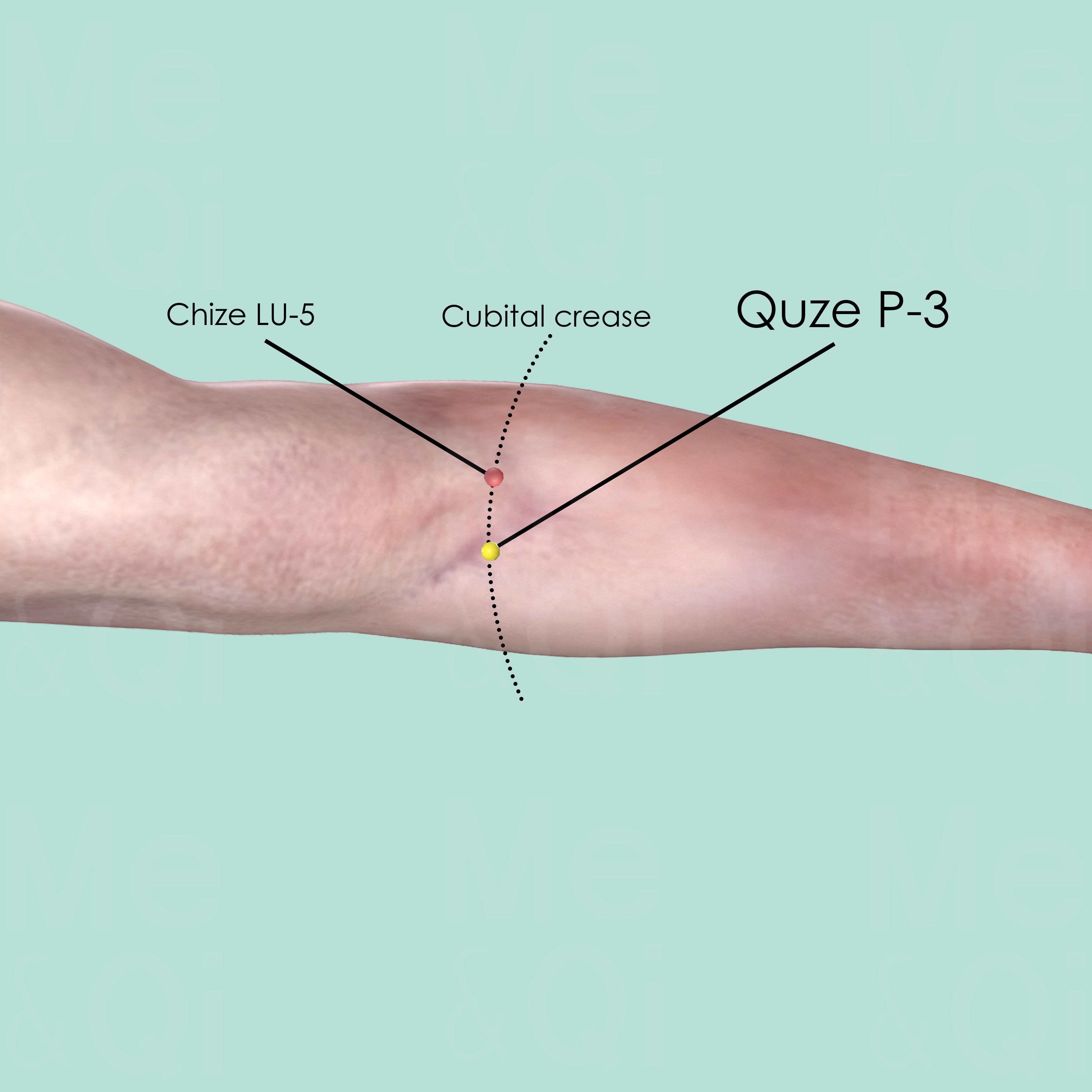
Quze P-3
On the transverse cubital crease, at the ulnar side of the tendon of biceps brachii muscle.
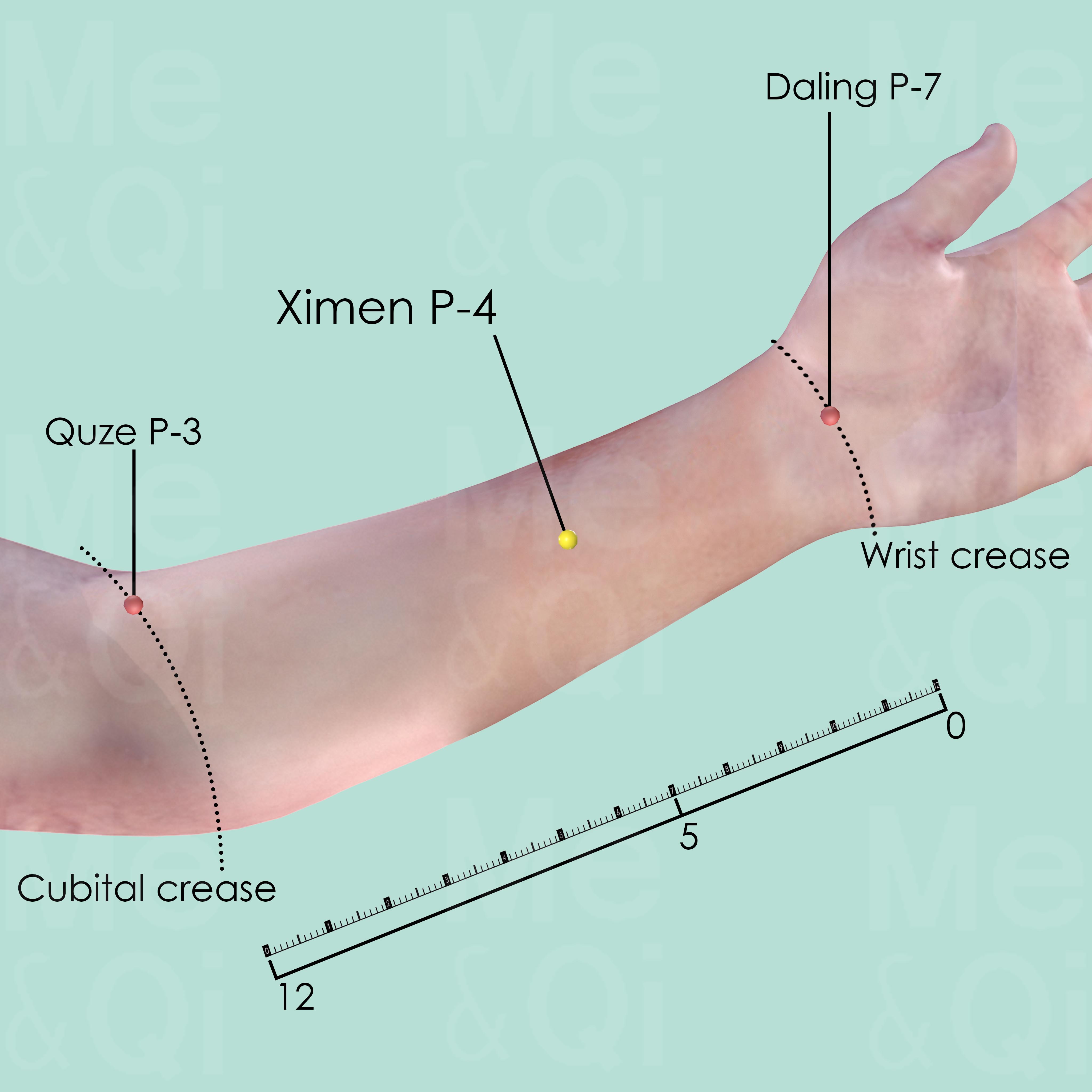
Ximen P-4
5 cun above the transverse crease of the wrist, on the line connecting Quze P-3 and Daling P-7, between the tendons of palmaris longus and flexor carpi radialis muscles.
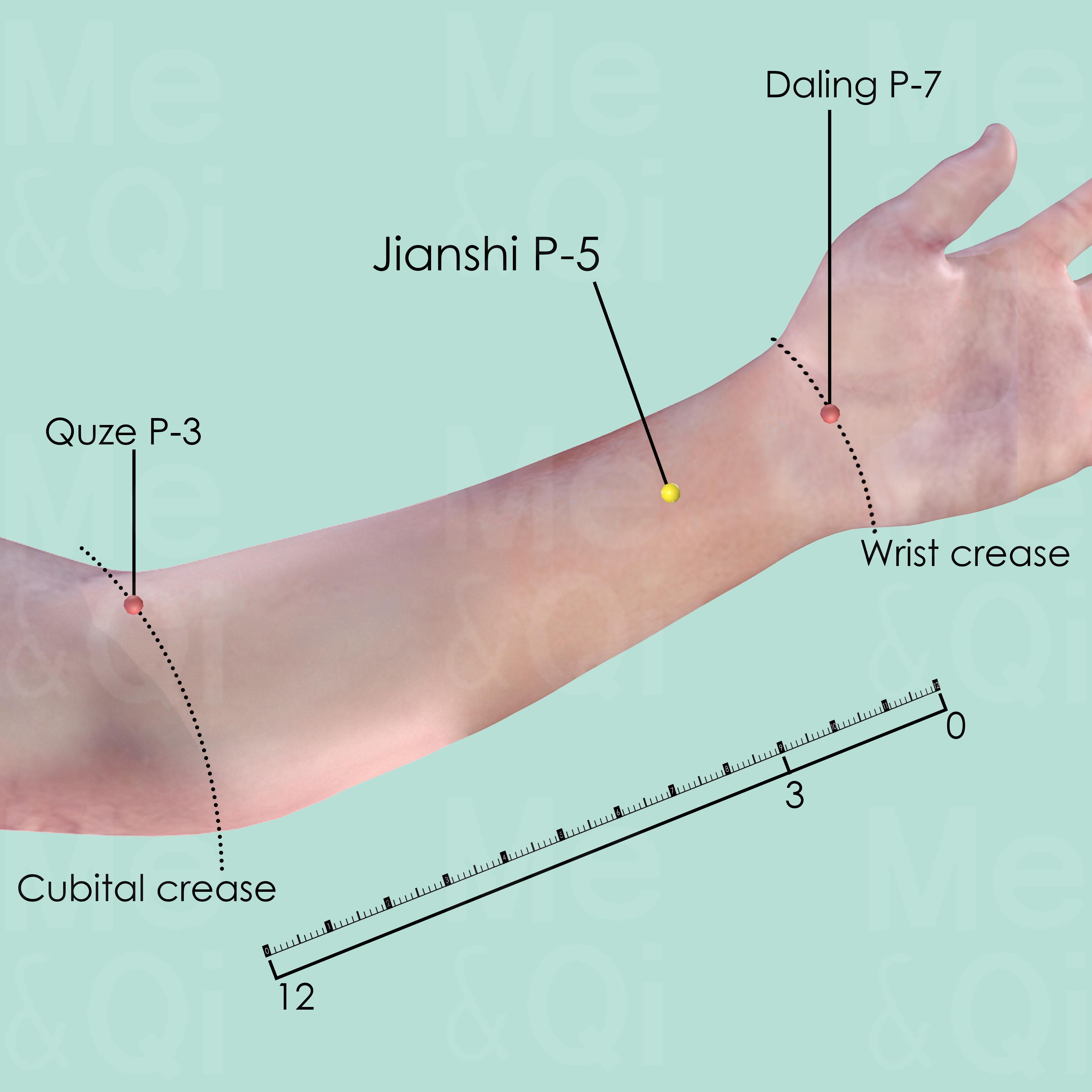
Jianshi P-5
3 cun above the transverse crease of the wrist, between the tendons of palmaris longus and flexor carpi radialis muscle.
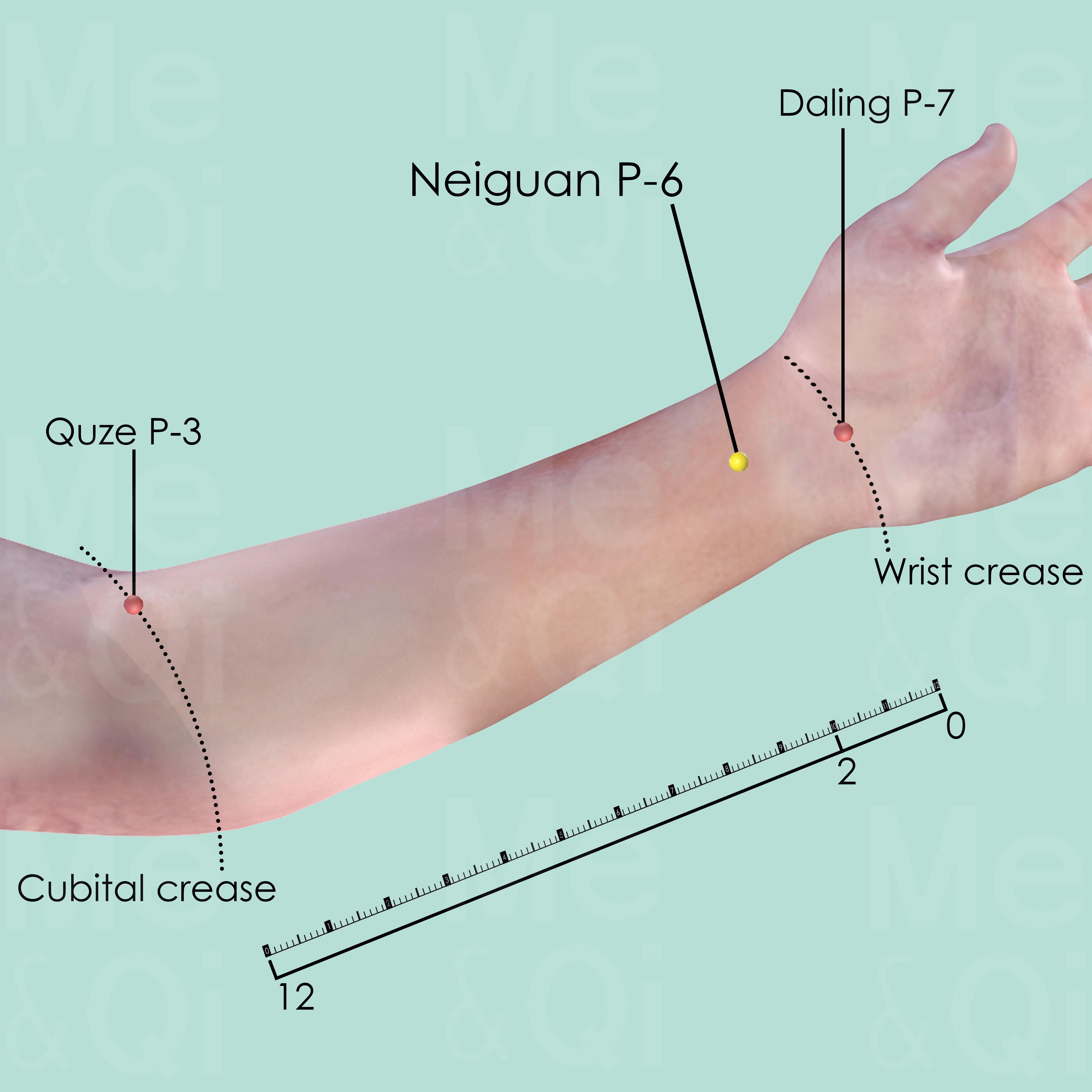
Neiguan P-6
2 cun above Daling P-7 on the transverse crease of the wrist, between the tendons of palmaris longus and flexor carpi radialis muscle.
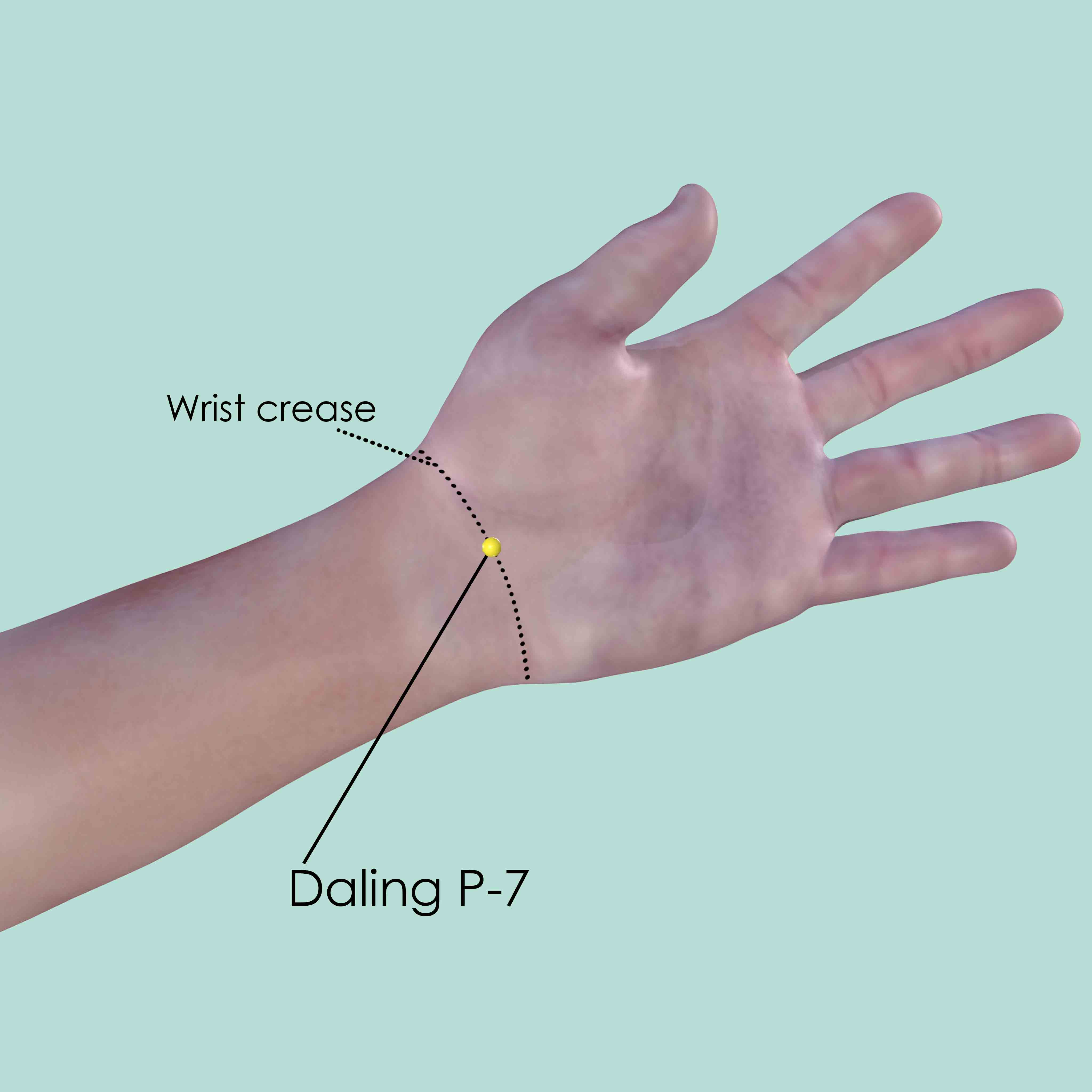
Daling P-7
In the depression in the middle of the transverse crease of the wrist, between the tendons of palmaris longus and flexor carpi radialis muscle.
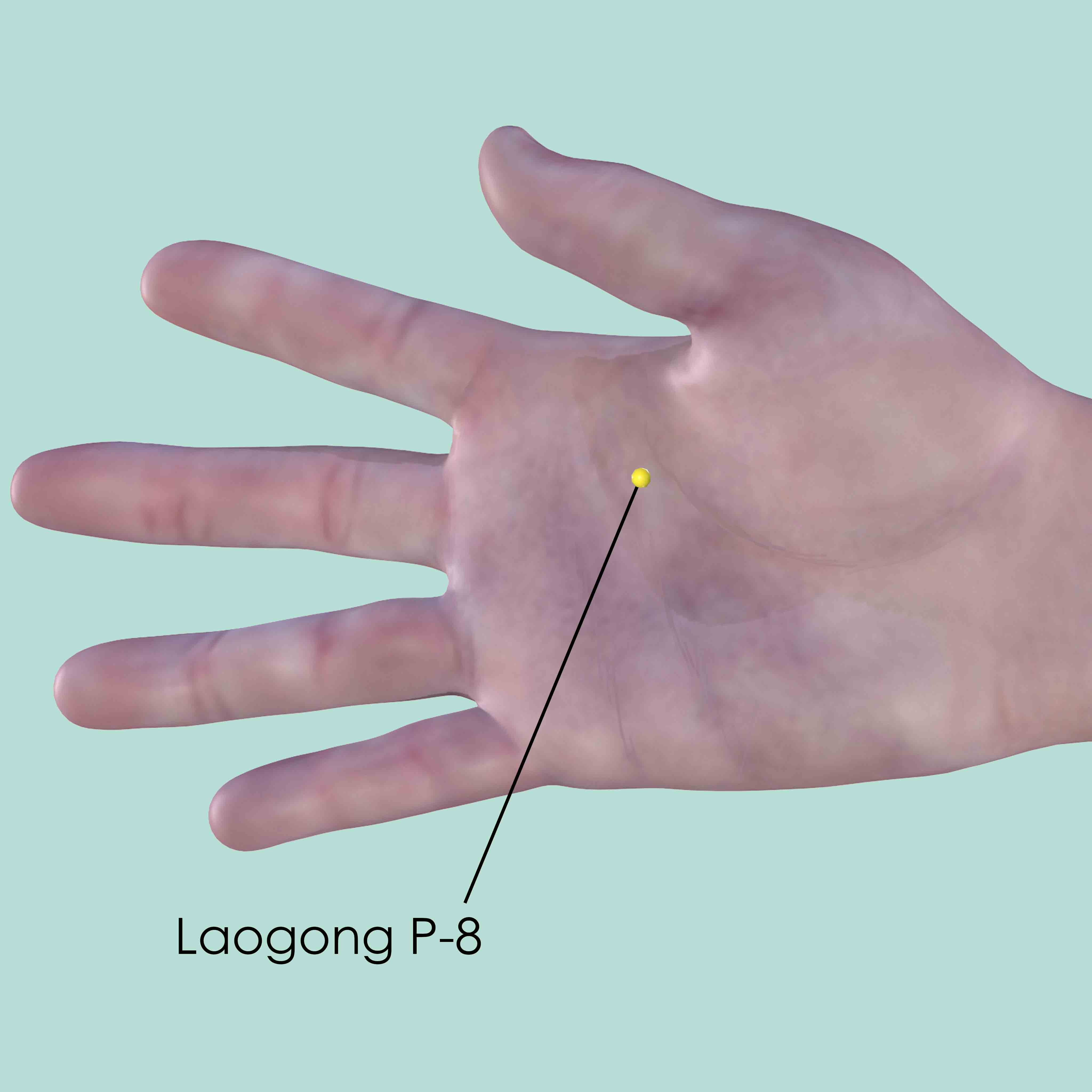
Laogong P-8
In the center of the palm, between the 2nd and the 3rd metacarpal bones, proximal to the metacarpophalangeal joint.
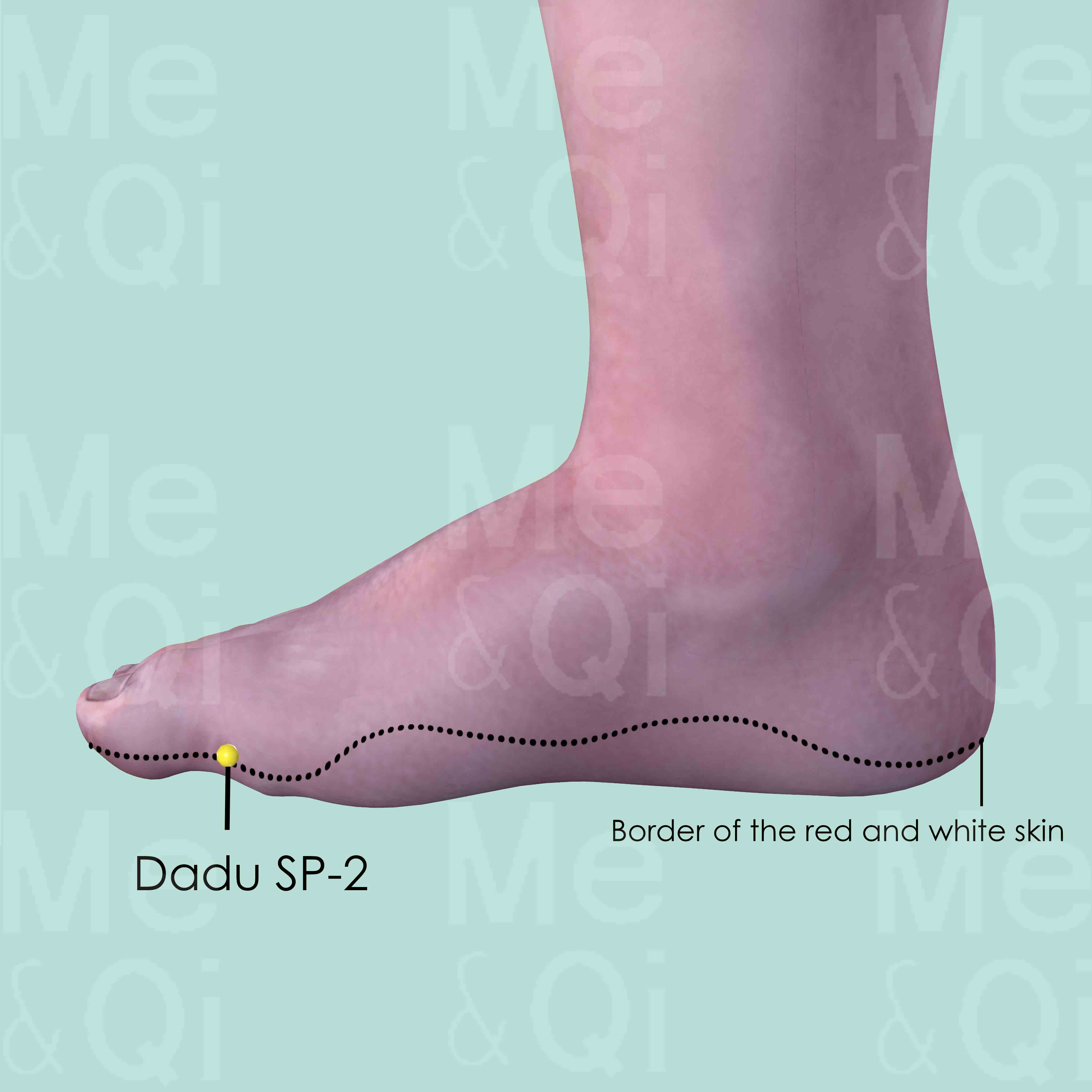
Dadu SP-2
On the medial aspect of the big toe, at the junction of the shaft and the base of the proximal phalanx, distal to the 1st metatarsophalangeal joint.
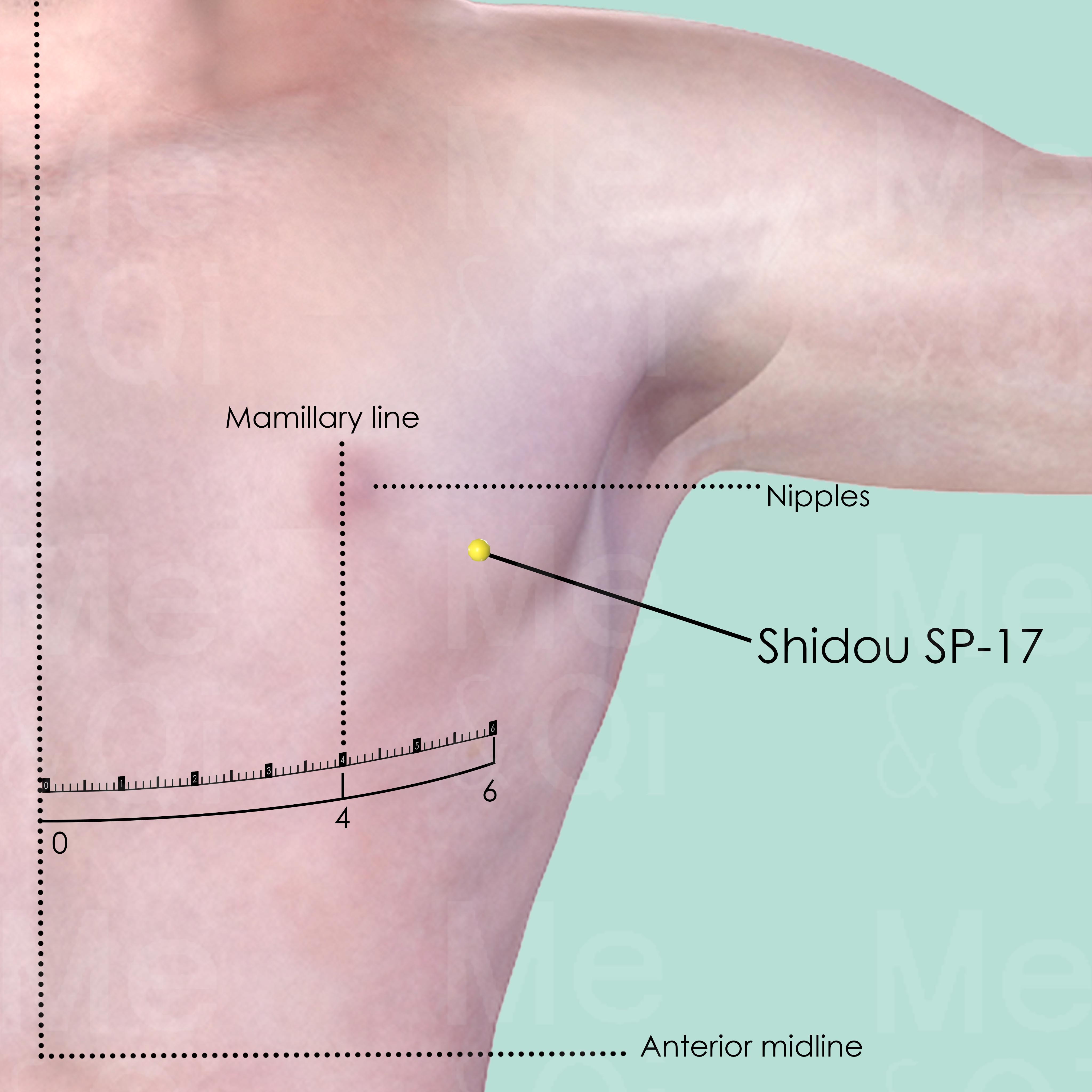
Shidou SP-17
6 cun lateral to the anterior midline, 2 cun lateral to the mamillary line, in the 5th intercostal space.
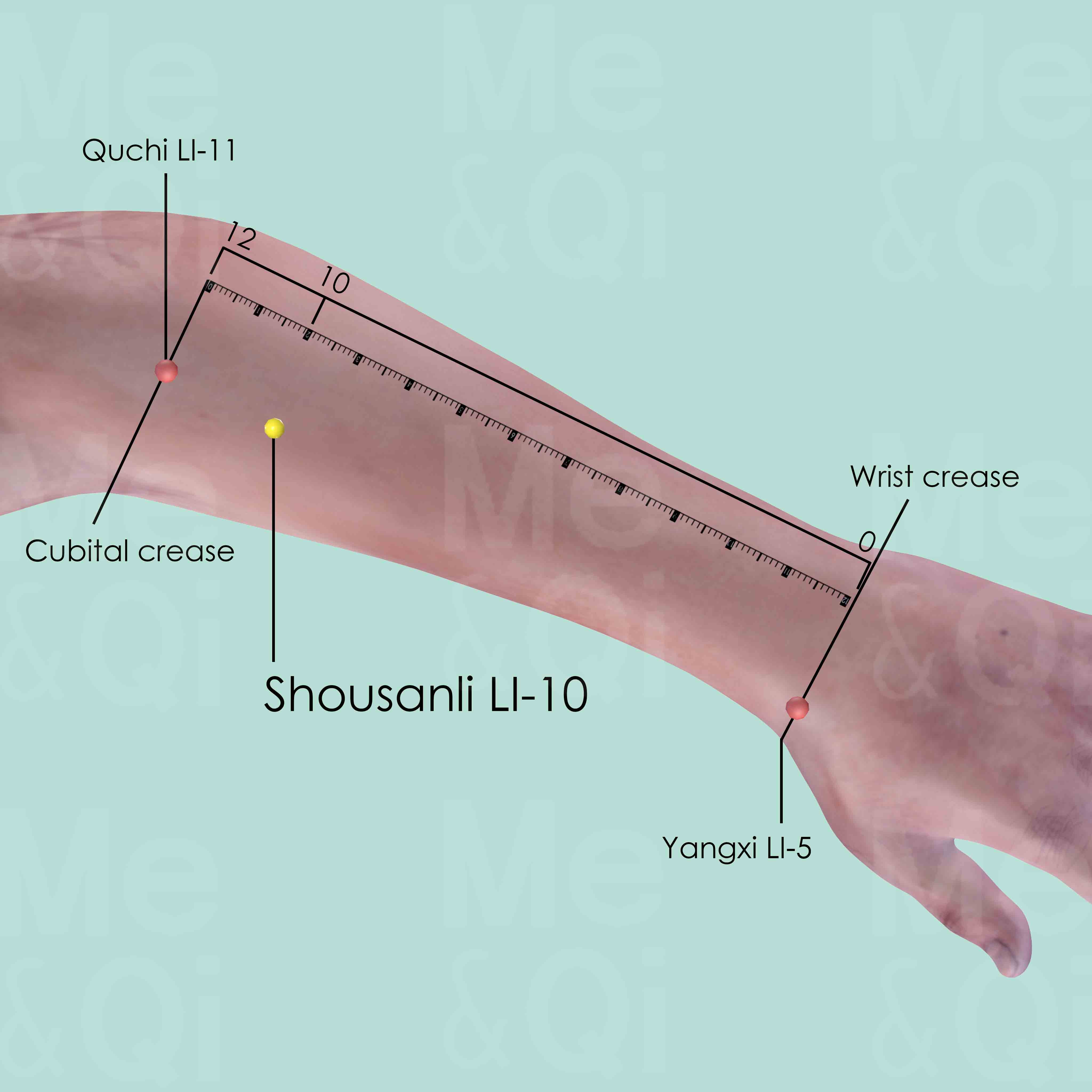
Shousanli LI-10
When a fist is made, with the ulnar side downward and elbow flexed, the point is 2 cun distal to Quchi LI-11 of the line joining Yangxi LI-5 and Quchi LI-11.
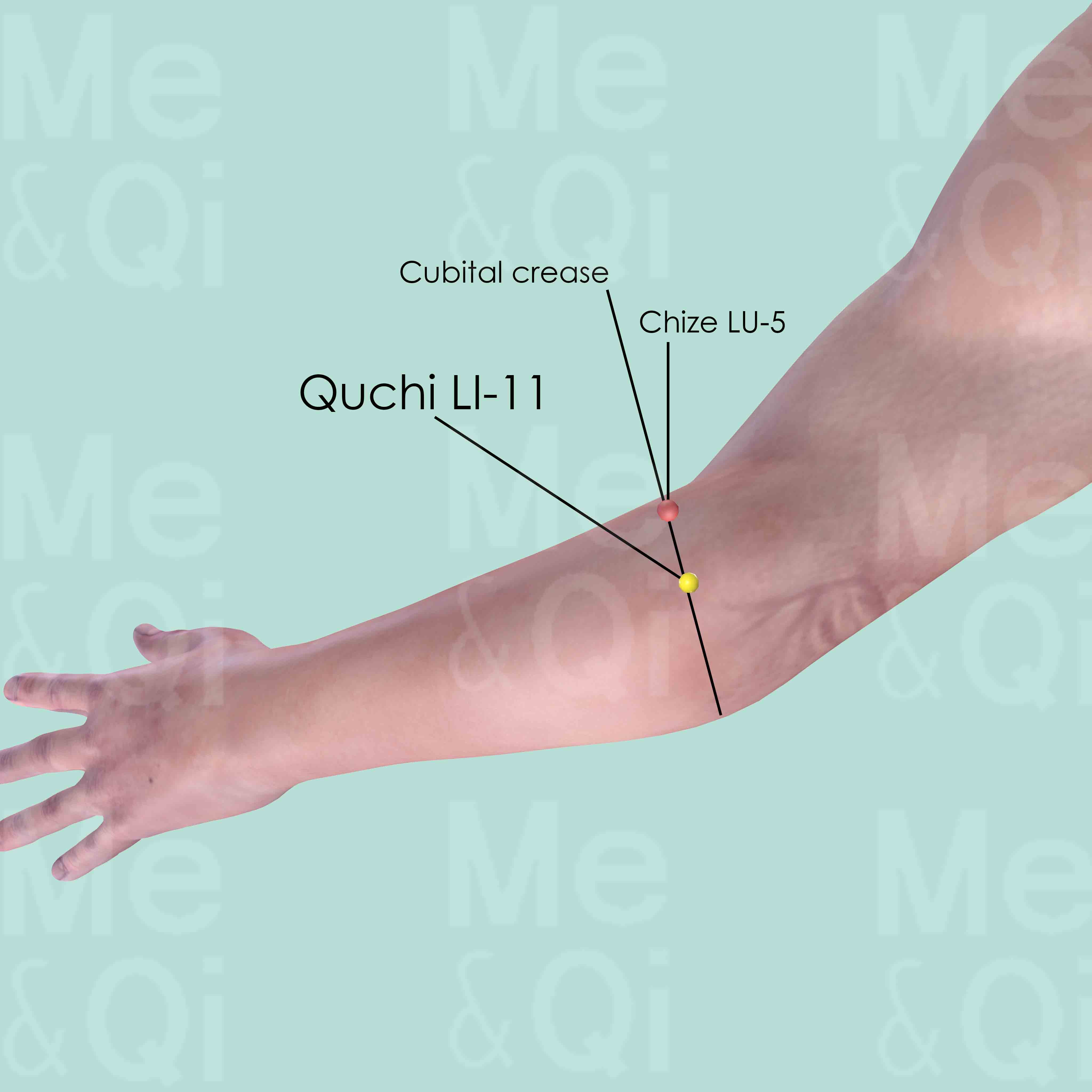
Quchi LI-11
When the elbow is flexed, Quchi LI-11 is in the depression at the lateral end of the cubital crease, midway between Chize LU-5 and the lateral epicondyle of the humerus.
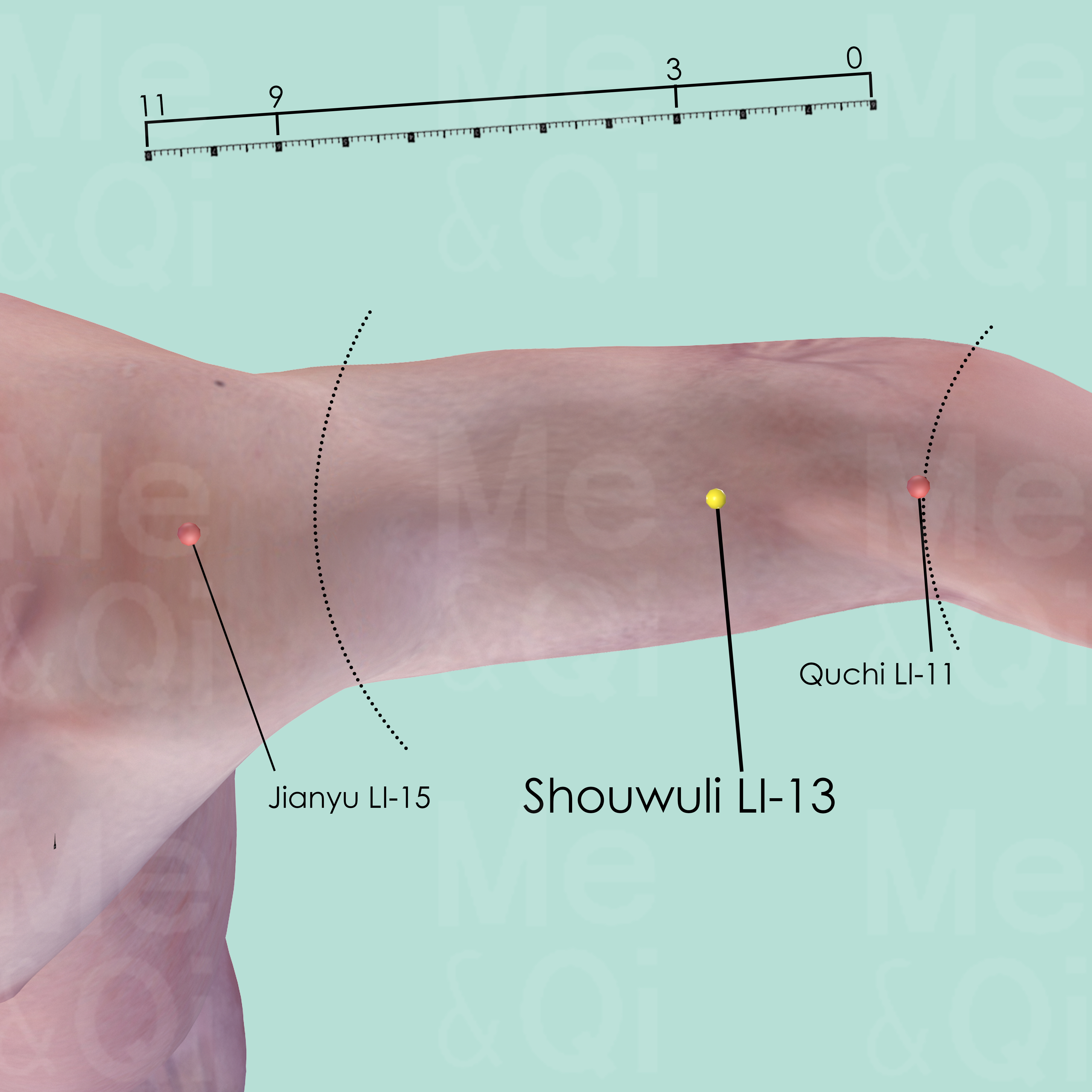
Shouwuli LI-13
Superior to the lateral epicondyle of the humerus, 3 cun above Quchi LI-11, on the line connecting Quchi LI-11 and Jianyu LI-15.
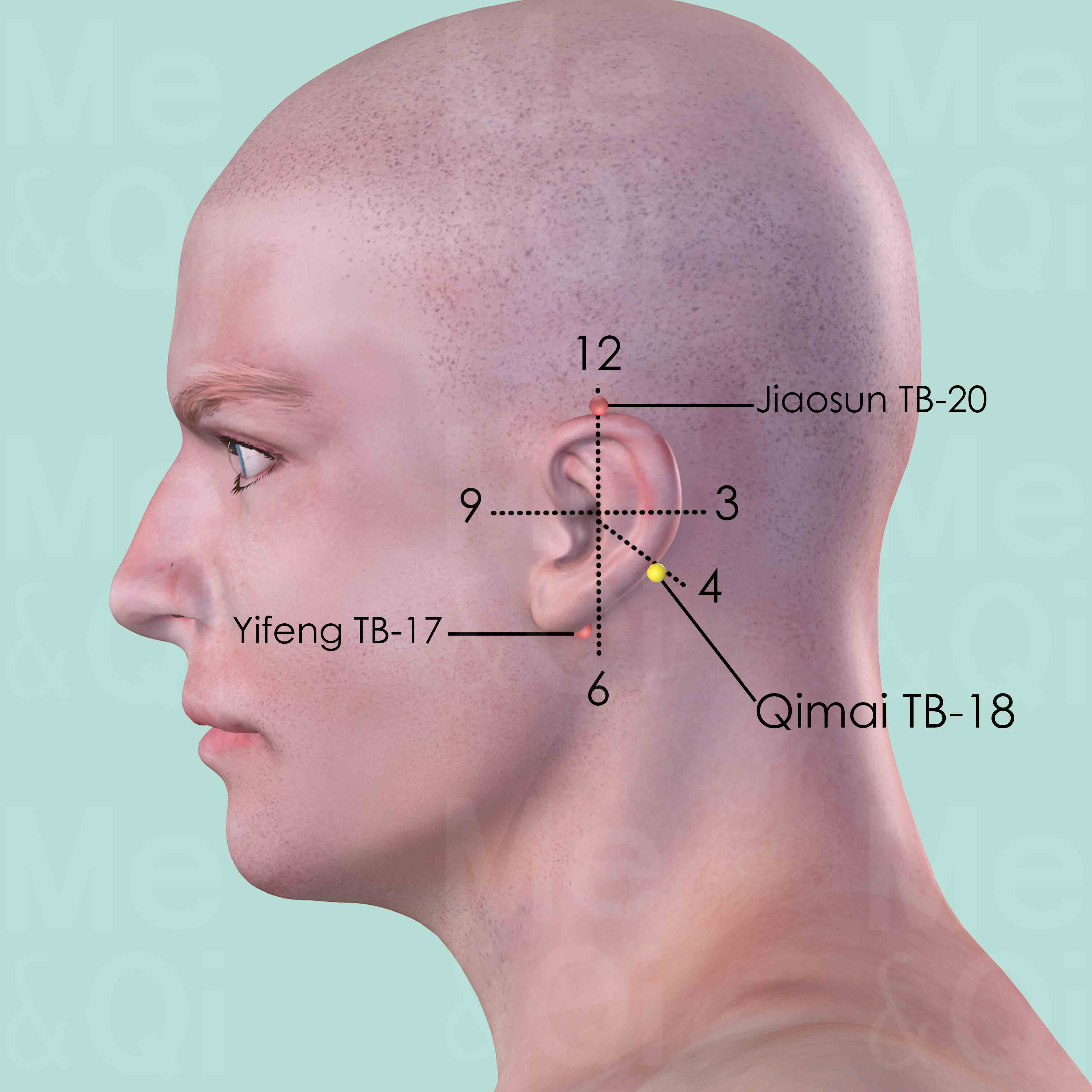
Qimai TB-18
In the center of the mastoid process, at the junction of the middle and lower third of the curve formed by Yifeng TB-17 and Jiaosun TB-20 posterior to the helix.
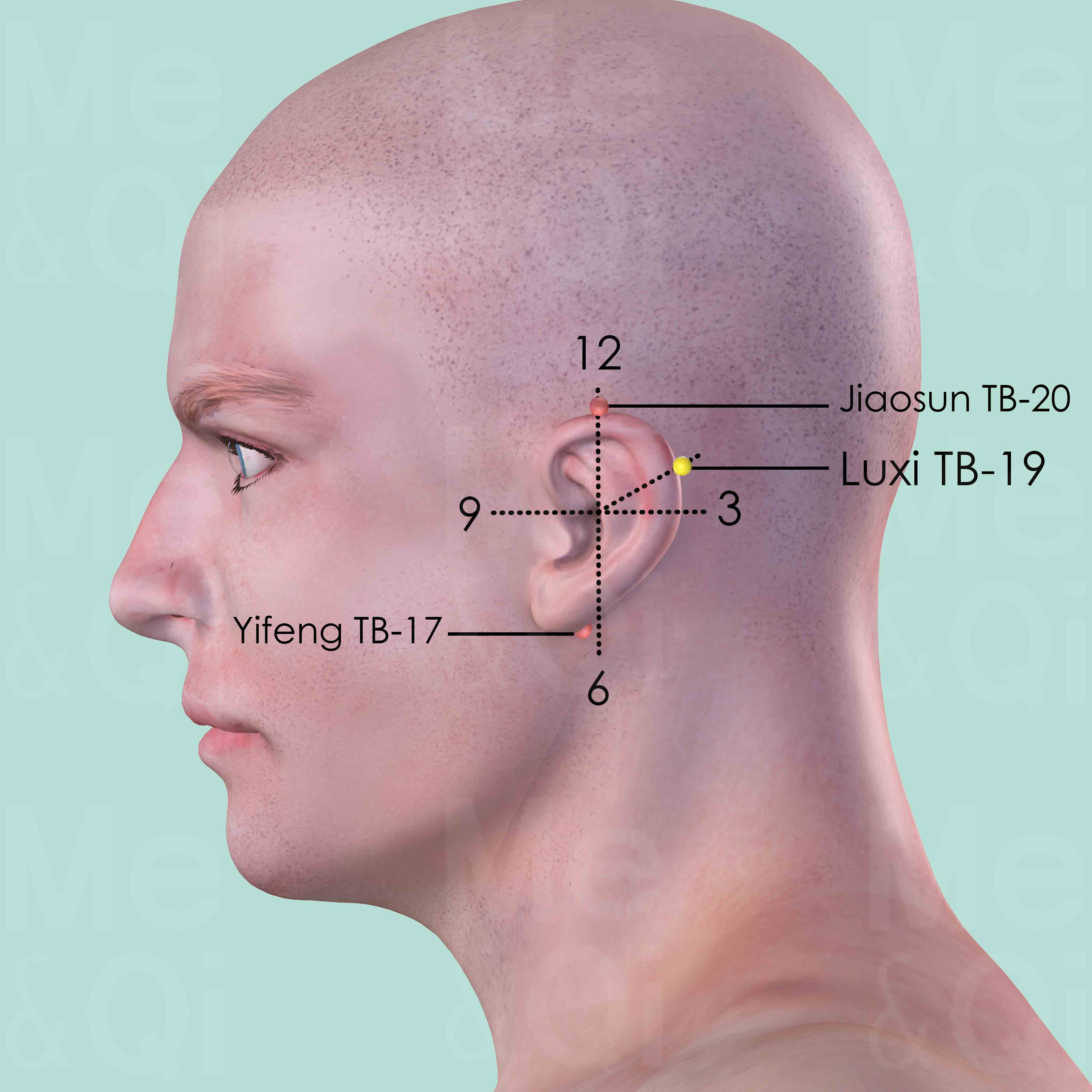
Luxi TB-19
Posterior to the ear, at the junction of the upper and middle third of the curve formed by Yifeng ST-17 and Jiaosun ST-20 behind the helix.
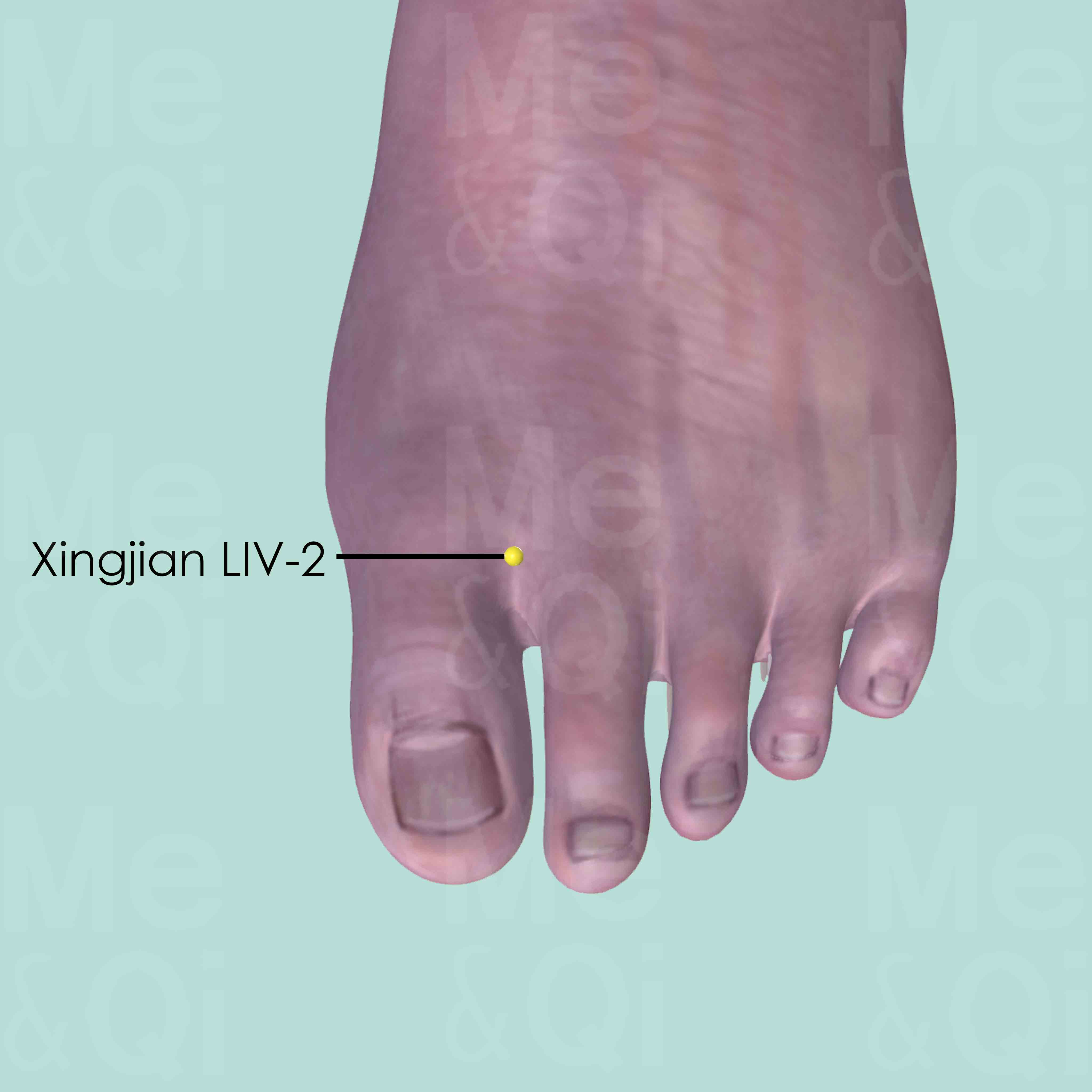
Xingjian LIV-2
Between the first and second toe, on the dorsum of the foot, 0.5 cun proximal to the interdigital fold.
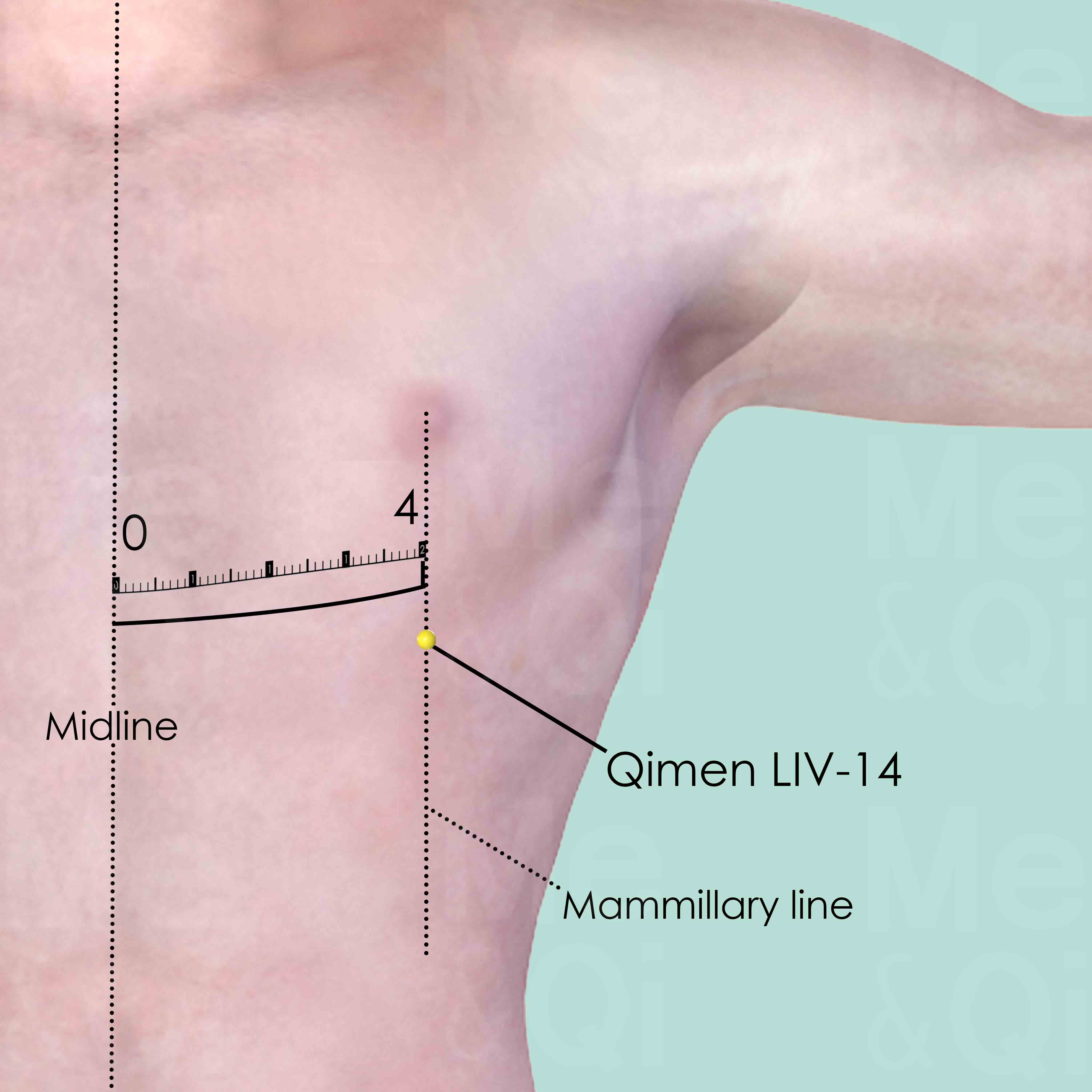
Qimen LIV-14
On the mammillary line, two ribs below the nipple, in the 6th intercostal space, 4 cun lateral to the midline. Please note that there is an alternative location for LIV-14 at the lower edge of the ribcage in line with the nipple or, in women, 4 cun from the midline. In fact, one could look upon these as two separate points. The one in the intercostal space is used more for Channel problems. While the one at the lower edge of the ribcage is used more for Organ problems.
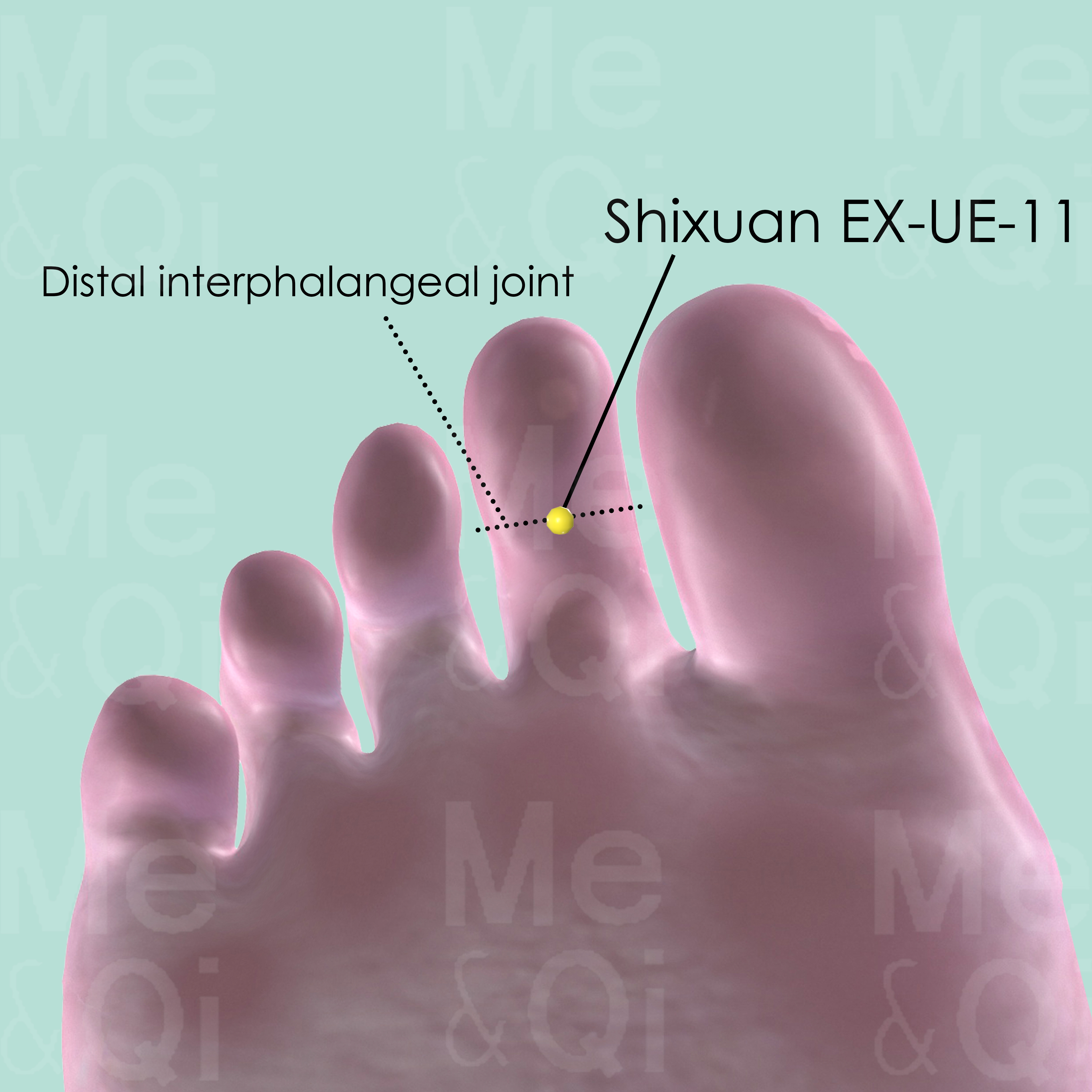
Duyin EX-LE-11
On the plantar aspect of the 2nd toe, at the midpoint of the transverse crease of the distal interphalangeal joint.
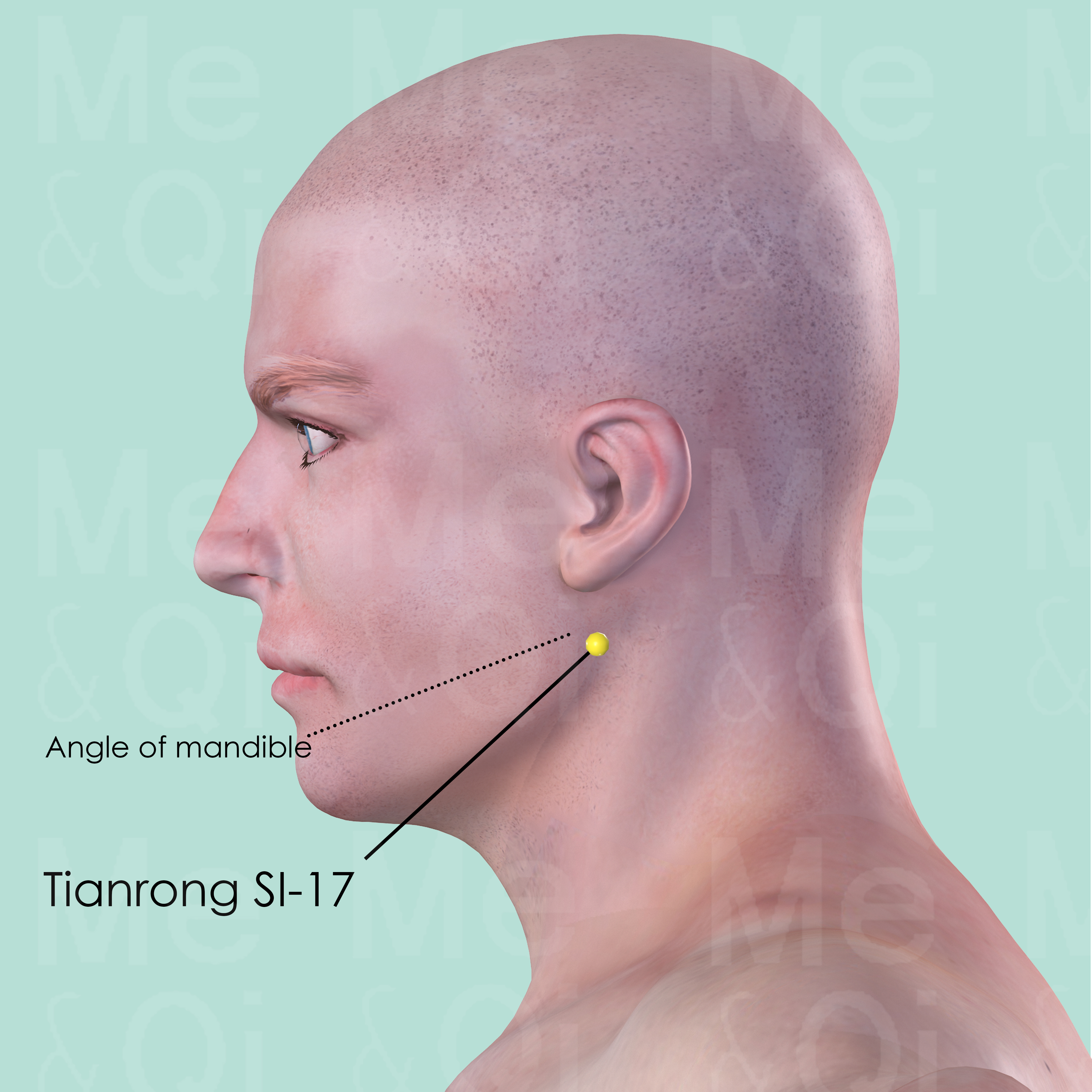
Tianrong SI-17
Posterior to the angle of mandible, in the depression on the anterior border of sternocleidomastoid muscle.
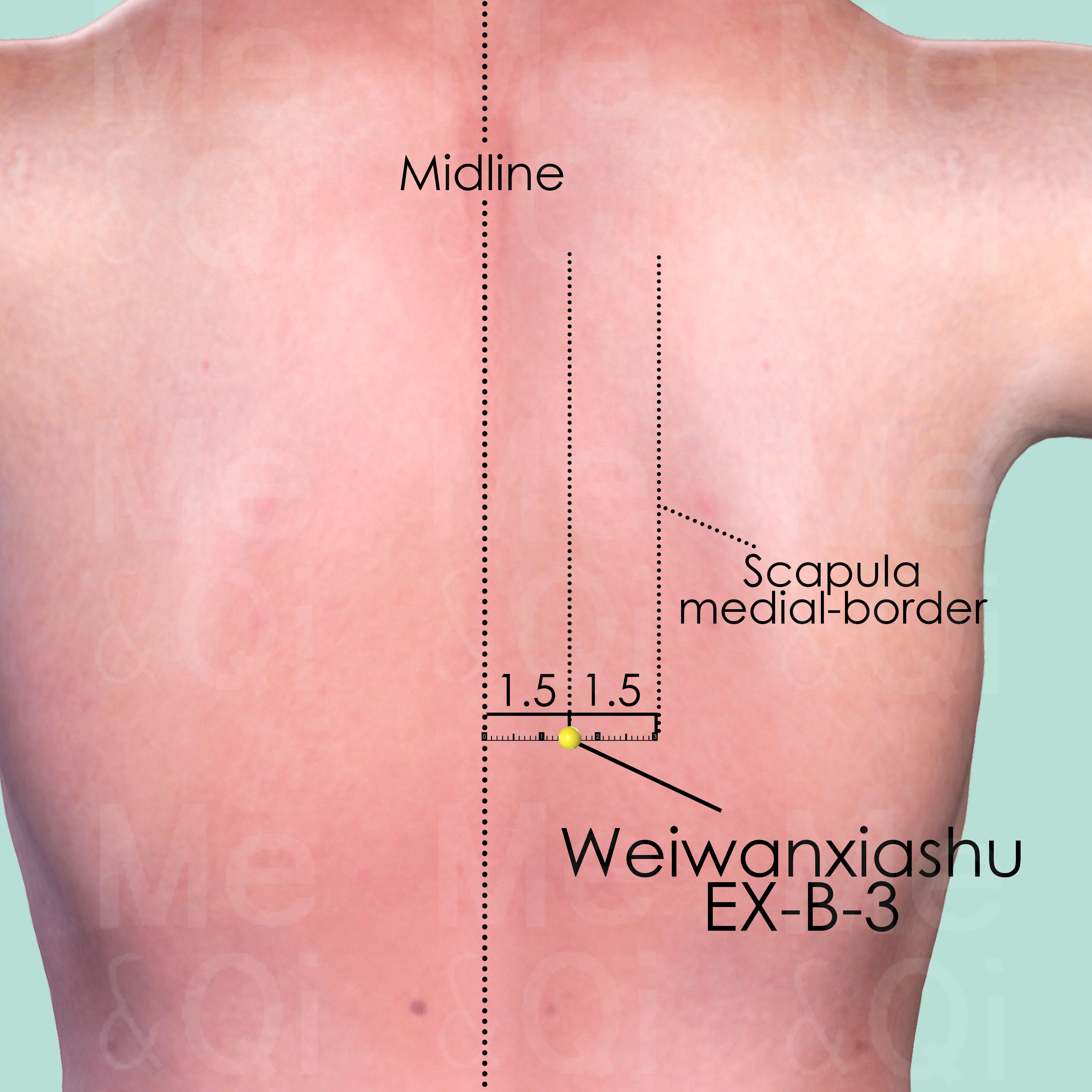
Weiwanxiashu EX-B-3
1.5 cun lateral to the lower border of the spinous process of the 8th thoracic vertebra (T8).
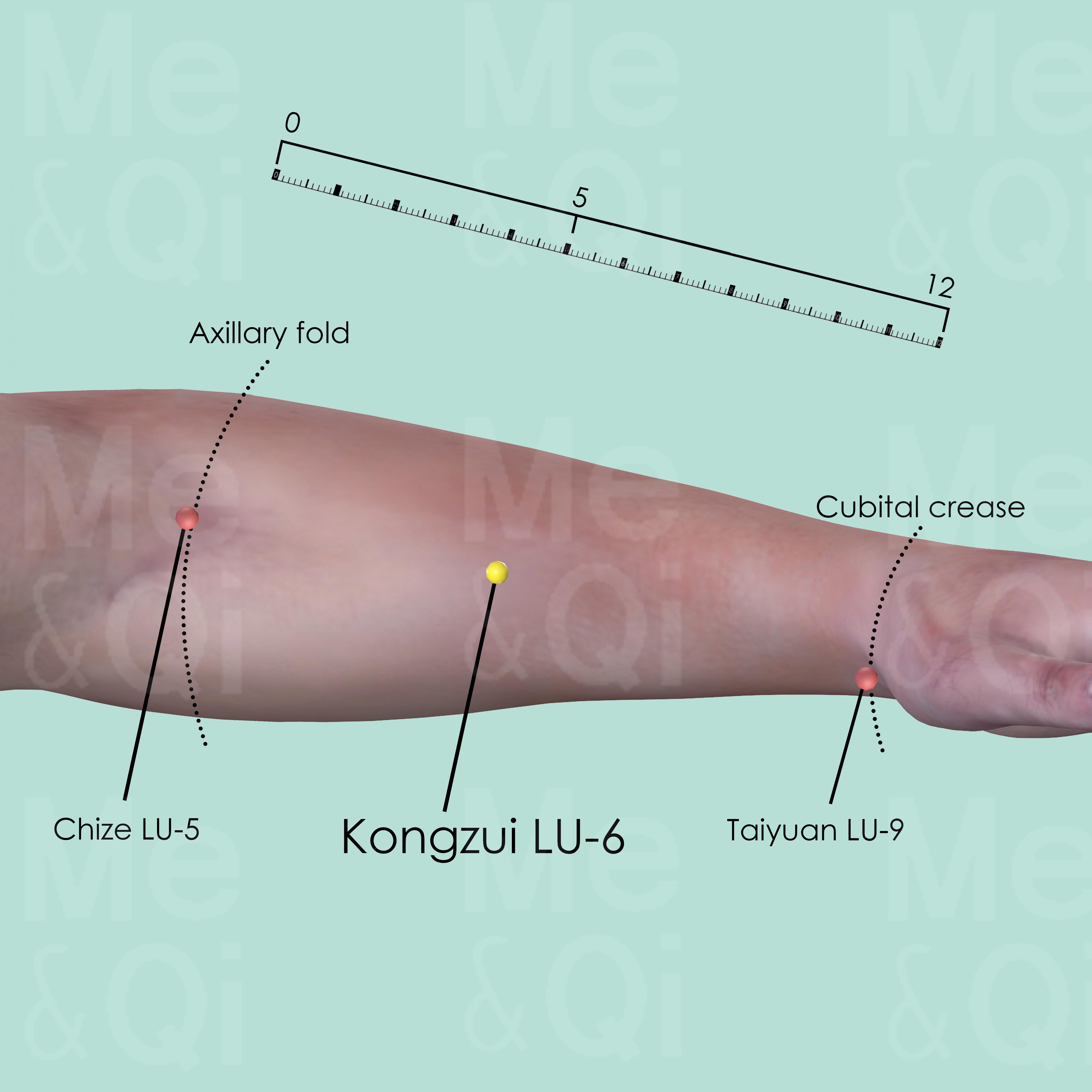
Kongzui LU-6
On the palmar aspect of the forearm, on the line joining Taiyuan LU-9 and Chize LU-5, 7 cun above Taiyuan LU-9.
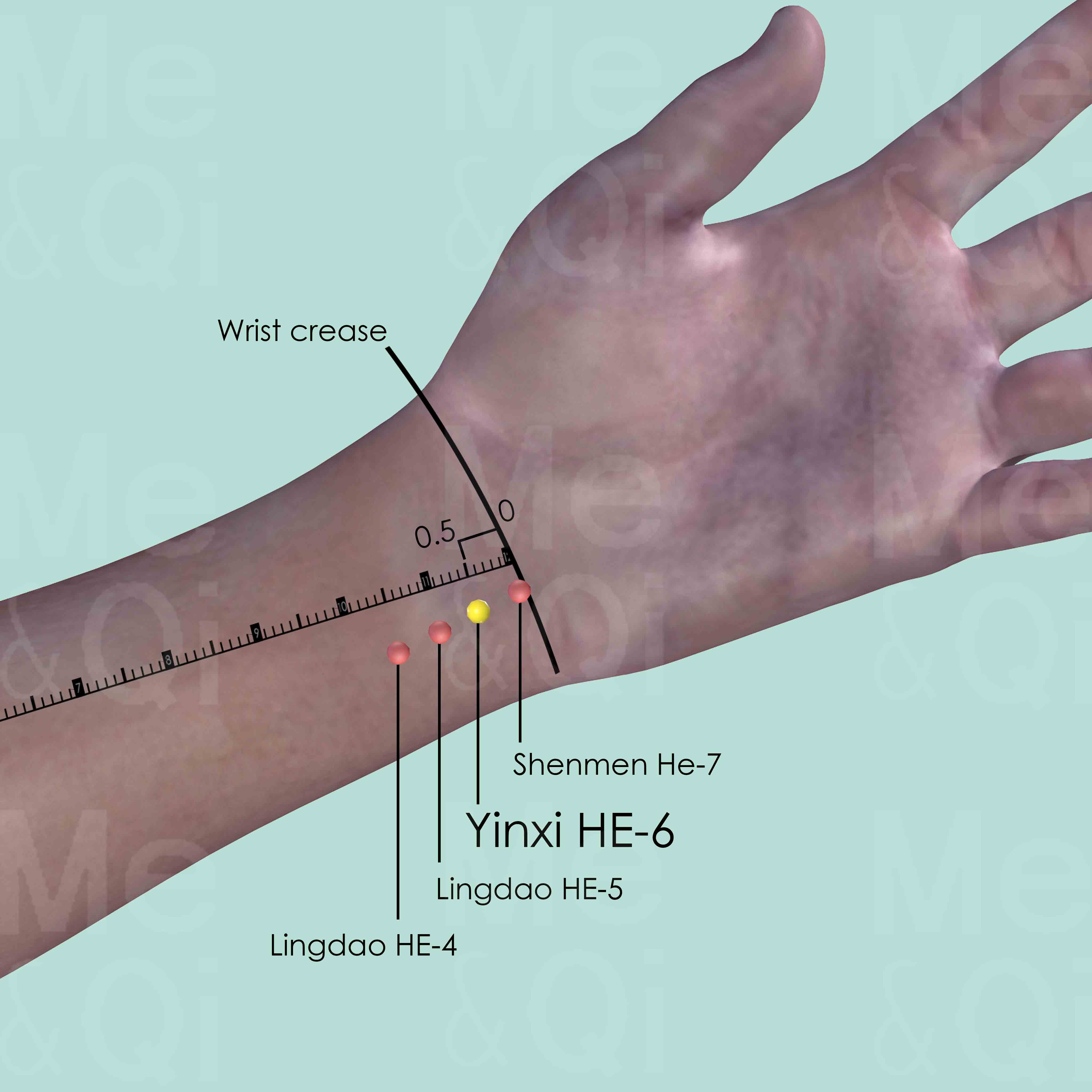
Yinxi HE-6
On the radial side of the tendon of flexor carpi ulnaris muscle, 0.5 cun above the transverse crease of the wrist when the palm faces upward.
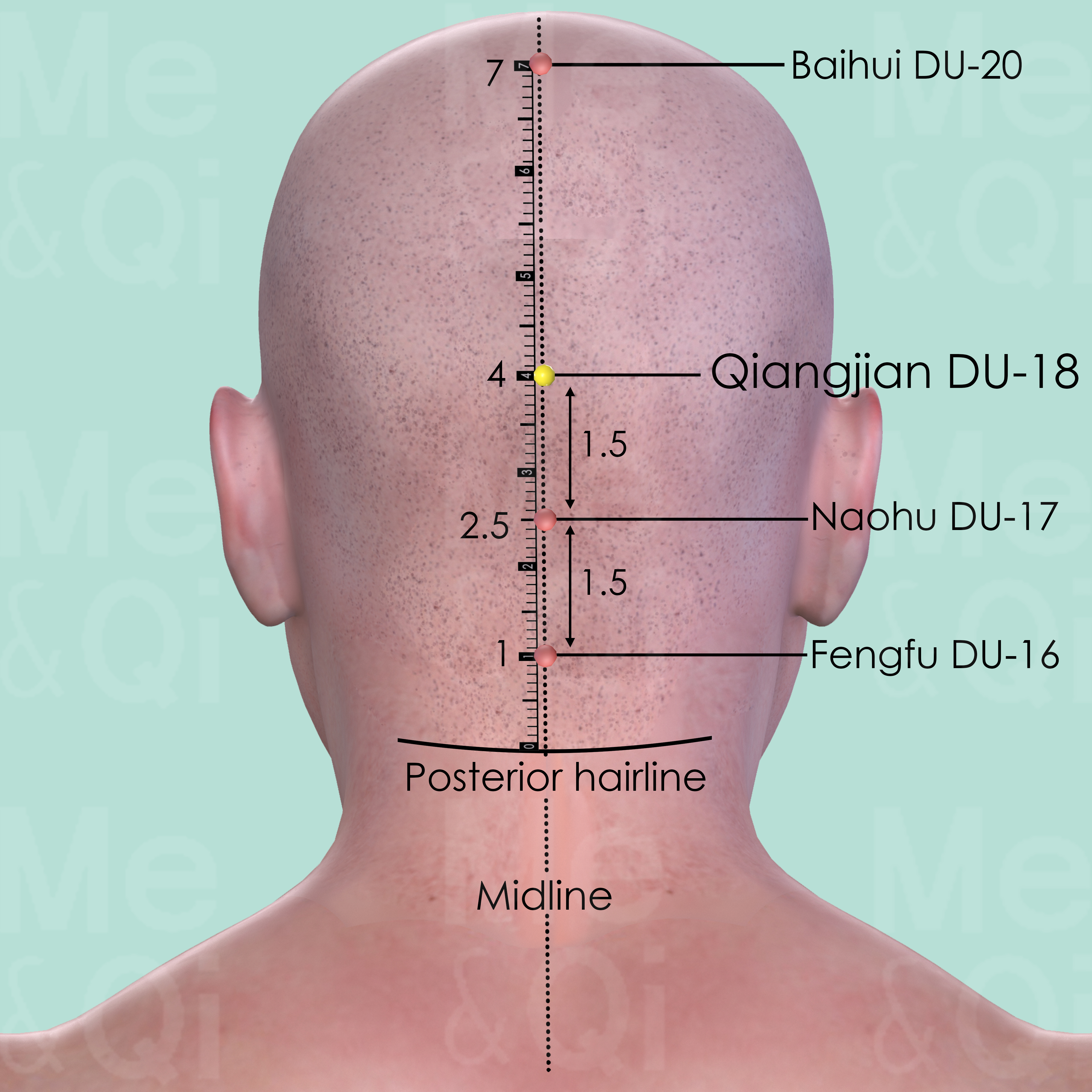
Qiangjian DU-18
On the posterior midline, 1.5 cun above Naohu DU-17, midway between Fengfu DU-16 and Baihui DU-20.

